
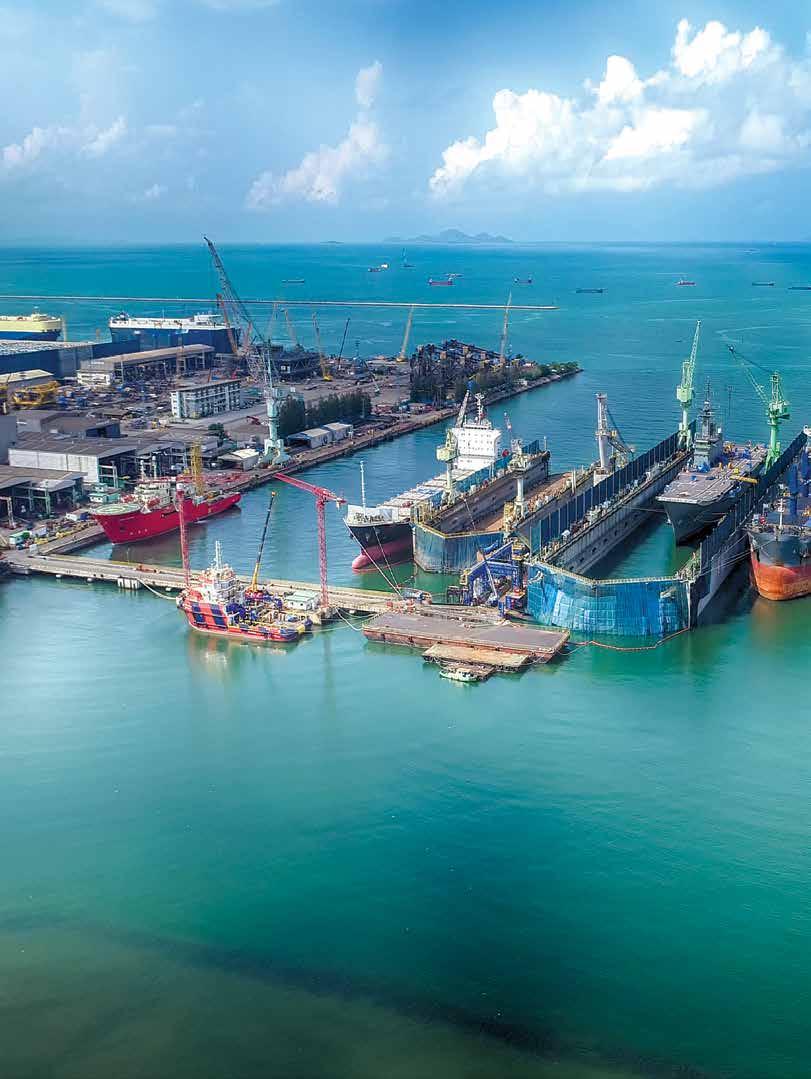


Highest level of quality to more than 100 vessels per year

nafs ΚΩΔ. Γ.Γ 2229 Bimonthly Review for the Shipping Industry - March 2024, issue 157, Year 29th Τιμητική Διάκριση Ιδρύματος Προαγωγής Δημοσιογραφίας Αθ. Βασ. Μπότση για το έγκυρο Ναυτιλιακό ρεπορτάζ και την στήριξη της Εμπορικής μας Ναυτιλίας
UNITHAI
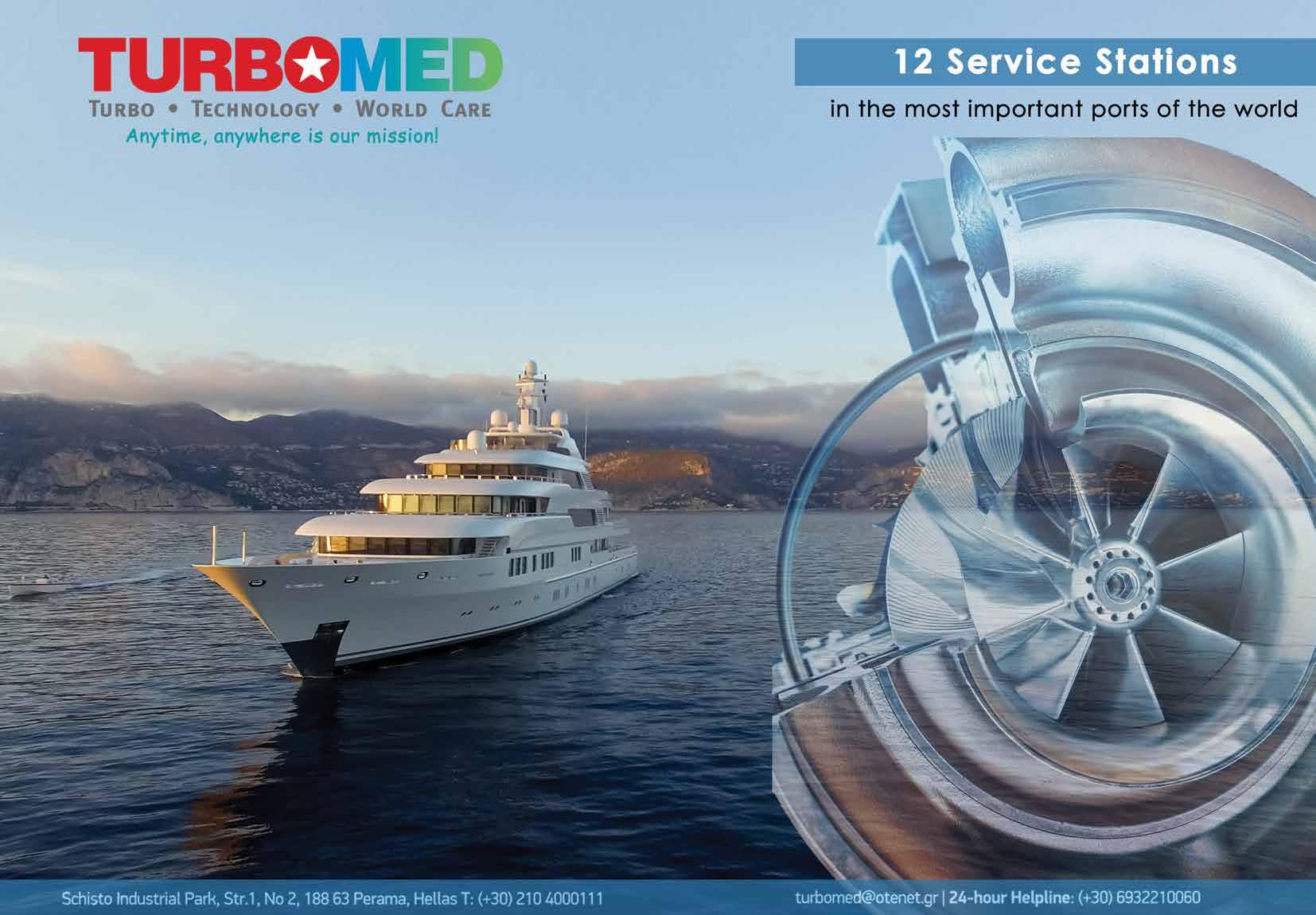
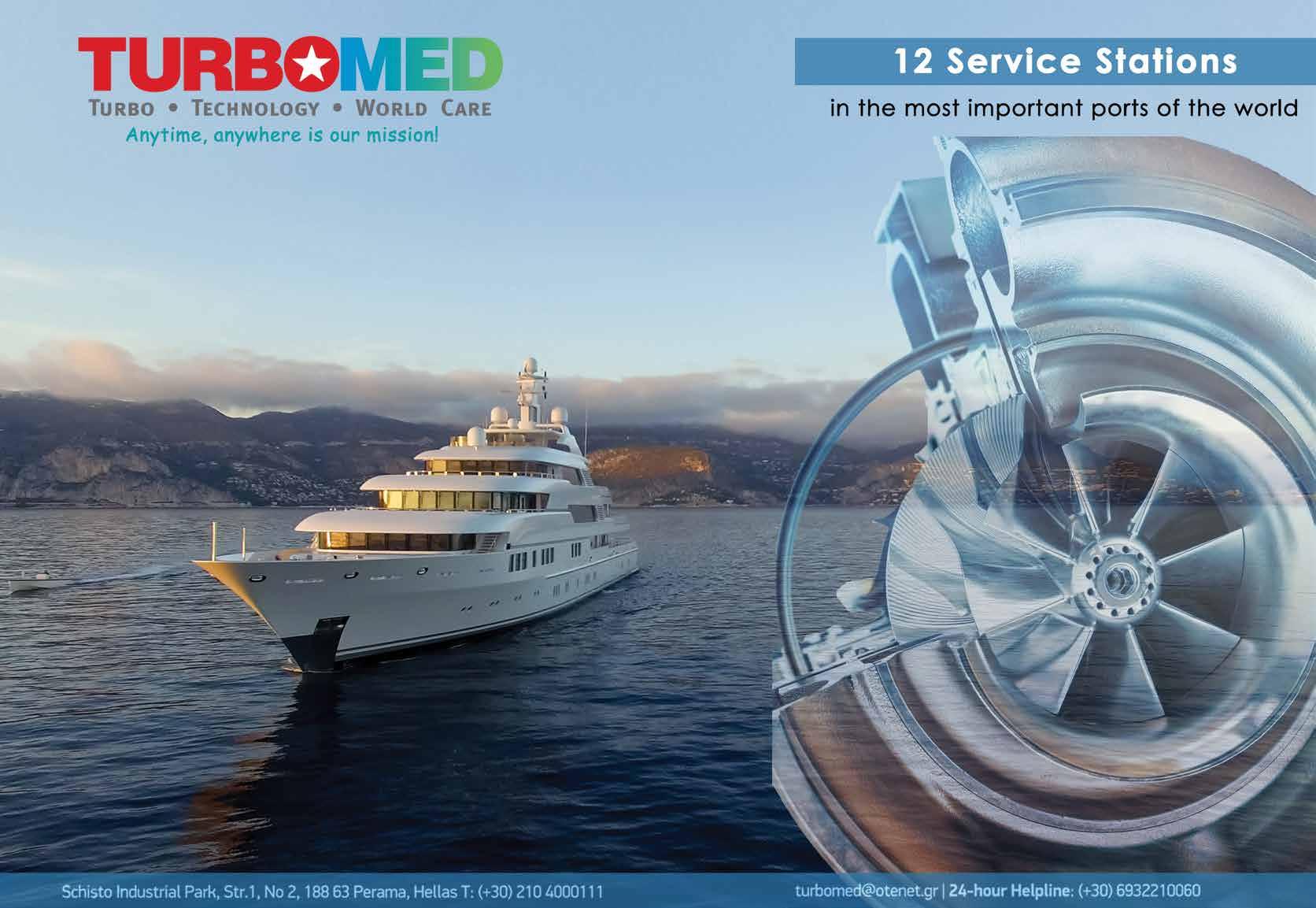

NAFS magazine has been honored with The Ath. Vas. Botsis Foundation award - the most prestigious award in Greece for journalism - for the valid Shipping Report and its support to the Merchant Shipping.
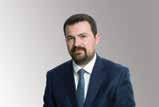
Ο Ελληνικός Εφοπλισμός
P. & N. Doukas Publications

6
18

Κ. Δούκας | Ἀνάσα σταθερῆς καί κερδοφόρας ναυλαγορᾶς μέχρι τά τέλη 2024
N. Δούκας | Ελληνόκτητος Στόλος: Νέα Ρεκόρ σε Αριθμό, DWT και GT
Ted Petropoulos | The Development and Prospects of Sale and Leasebacks (SLBs) in shipping
Navigating Excellence: The Norwegian – Greek Maritime Innovation Summit
Challenges in Maritime Training Navigating Troubled Waters
Responses from Mikko Issakainen, Global Marine Academy Manager, ABB Marine & Ports, Nikolaos Argoudelis, Owner/Technical Director CMA & Ioannis Argoudelis, Owner/CEO CMA, Katerina Lyrintzis, Chief Operations Officer, OMS Maritime Training Center, Piraeus, Greece.

Dr. John Kokarakis | Adapting Training in the Maritime Industry for Automation and Digitalization
Κώστας Κωνσταντίνου & Πηνελόπη Κασανή | Με το ESG οι ναυτιλιακές εταιρίες θα πρέπει να ξανασυστηθούν στην κοινωνία
Από την Τεχνολογία στην Περιβαλλοντική Δράση: Η Πρωτοβουλία της TURBOMED SA


Programme Manager at Lloyd’s Register Maritime Decarbonisation Hub
36
46
48
Απολογισμός του Υφ. Ναυτιλίας Κύπρου για τον πρώτο χρόνο διακυβέρνησης του Νίκου Χριστοδουλίδη
H δυναμική παρουσία της Ναυτιλίας των Ελλήνων στο 9o Οικονομικό Φόρουμ των Δελφών
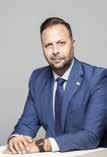
Kirnidis
HCG, BEng, MSc, Honorary Consul General of the Republic of Palau to Greece, Chief Executive

The

Katerina Palla
52
60
Dr Antonios Fringas
General Manager of SQLearn S.A.
62
157
CONTENTS Ετήσια συνδρομή εσωτερικού 50 ευρώ. Ετήσια συνδρομή εξωτερικού USD 70. NAFS, ISSN 1107-3179. Απαγορεύεται η αναδημοσίευση, η αναπαραγωγή, ολική, μερική ή περιληπτική, ή κατά παράφραση με οποιονδήποτε τρόπο, χωρίς γραπτή άδεια του εκδότη, εκτός αν αναφέρεται το περιοδικό ΝΑΥΣ ως πηγή των πληροφοριών αυτών. Οι απόψεις των συνεργατών και αρθρογράφων του περιοδικού ΝΑΥΣ δεν απηχούν κατ’ ανάγκη και τις θέσεις του περιοδικού και των εκδοτών. Οι αρθρογράφοι του περιοδικού φέρουν την αποκλειστική ευθύνη της ιδοκτησίας των κειμένων που αποστέλουν προς δημοσίευση και οφείλουν να γνωστοποιούν τις πηγές στις οποίες αναφέρονται εάν υπάρχουν.
MARCH 2024
Posidonia 2024 marks the rebirth of the Greek shipbuilding industry Successful Conclusion of Navigator Assembly 2024: Forging the Future of Greek Shipping 8 10 24 28 40 66 70 72 76 94 106 UNITHAI Highest level of quality to more than 100 vessels per year Γιώργος Ανδρούτσος Ioannis
Dr Marina Papaioannou Natassa Kouvertari Panos
Armenakis
Director Audit,
Regional
DNV
KPMG ABS Academy Manager, ABS Athens
Maritime Academies Manager
Officer at Palau International Ship Registry RINA Training Manager, Global Marine Training Center
στην Παγκόσμια Ναυτιλία Προκλήσεις και Επιπτώσεις από τις Παγκόσμιες Εξελίξεις
normality?
Transforming
New approaches to training in a net zero shipping industry Reskilling and Upskilling | A trend or the new
Meeting the Training Needs for New Fuel Technologies in Maritime Operations
Maritime Training for the Digital Era
Leveraging Computer-Based Training and AI
the Maritime
importance of maritime training & the challenges we face
in
Industry
FORUM POSIDONIA 2024 NAVIGATOR ASSEMBLY MARITIME TRAINING
32/44/56 ΣΥΝΕΝΤΕΥΞΗ DELPHI


ROSS MARINE 1, Charilaou Trikoupi Str., 185 36 Piraeus, Greece, Tel.: +30 210 4283741, Fax: +30 210 4511679 e-mail: rossmarine@rossmarine.gr, www.rossmarine.gr

Ἀνάσα σταθερῆς καί κερδοφόρας
ναυλαγορᾶς μέχρι τά τέλη 2024
Κώστας Δούκας, Δημοσιογράφος, Μέλος ΕΣΗΕΑ, Βραβείο Δημοσιογραφίας Ιδρύματος Μπότση
Ἡ
ναυτιλία ἀναπλέει θάλασσες ταραγμένες, διατρέχοντας καί ἡ ἲδια κινδύνους μέ ἀπώλειες ἀπό τούς πολέμους, μέ ἀσφάλιστρα κατά κινδύνων πολέμου (war risk) ἐλαφρῶς ἀνατιμημένα γιά τίς ἐμπόλεμες περιοχές, ἀλλά ἒχοντας πεποίθηση στίς πληροφορίες της ὃτι δέν φαίνεται νά περιπλέκεται περισσότερο ἡ διεθνής κατάσταση, παρά τήν ἐμπλοκή περισσοτέρων χωρῶν στίς γενικές δυσκολίες, γιά τόν ἁπλούστατο λόγο ὃτι ἡ χειροτέρευση τῆς διεθνοῦς καταστάσεως δέν συμφέρει οὒτε στήν Ἀμερική οὒτε στήν Ρωσία. Δύο ὑπερδύναμες χῶρες πού ἐπιτυγχάνουν στρατηγικούς, οἰκονομικούς καί γεωπολιτικούς στόχους καί εἶναι οἱ μόνες πού ὠφελοῦνται ἀπό τούς πολέμους και τό ἐνεργειακό.
Εἰδικότερα ἡ Ἀμερκή, πού ἒχει τεράστιο ἐξωτερικό χρέος συμποσούμενο γύρω στά 33 τρισεκατομμύρια δολάρια, καί πού ἀγωνίζεται νά ὀρθοποδήσει μέ κάθε
δύναμη πουλῶντας ὃπλα καί ένέργεια σέ ὑψηλές τιμές καί σέ ὃλες τίς χῶρες τοῦ κόσμου, αὒξησε τό ἐξωτερικό της ἐμπόριο κατά 40%. Οἱ ναυτιλιακοί παρατηρητές πιστεύουν ὃτι τουλάχιστον γιά τά ἑπόμενα 30 χρόνια ἡ κυριαρχία τοῦ δολαρίου ὡς διεθνοῦς ἀποθεματικοῦ νομίσματος δέν ἒχει νά ἀντιμετωπίσει κανένα πρόβλημα. Ἀπό τήν ἂλλη, ἡ Ρωσία, παρά τήν συνεχῆ κλιμάκωση τῶν προκλήσεων ἐναντίον της, δέν φαίνεται νά τήν συμφέρει μία ἠχηρή ἐπέκταση τοῦ πολέμου, ἀλλά ἡ βῆμα πρός βῆμα ἐπίτευξη τῶν στόχων της, μέ ἀπώτερο σκοπό νά σταθεροποιήσει τίς κατακτήσεις ἐδαφῶν στήν Οὐκρανία καί νά τοποθετήσει δική της κυβέρνηση στόν παγκόσμιο αὐτόν σιτοβολῶνα καί ὂχι μόνο.
Ἒτσι, παρά τίς πολεμικές ἐπιχειρήσεις στήν Οὐκρανία, στήν Ἐρυθρά Θάλασσα καί στήν Μέση Ἀνατολή, οἱ διαχειριστές πλοίων πιστεύουν ὃτι ἡ ναυτιλία δέν ἒχει λόγους νά φοβᾶται δραματικές μεταβολές γιά τό δυνάμενο νά προβλεφθεῖ μέλλον καί περιμένουν τουλάχιστον διάστημα ἓξι μηνῶν ἢ μέχρι τό τέλος τοῦ 2024 σταθεροποίηση τῆς ὑπάρχουσας κατάστασης στόν πλανήτη καί σταθερή ναυλαγορά, κερδοφόρα, ἂν καί ὂχι τόσο κερδοφόρα ὃπως τό προηγούμενο ἒτος. Ἡ τιμή τοῦ πετρελαίου δέν θά αὐξηθεῖ σημαντικά καί θά κυμαίνεται γύρω στά 80 δολάρια τό βαρέλι, ὣστε νά ἀποτραπεῖ μεγάλη ἐπιβάρυνση τῶν διεθνῶν καταναλωτῶν. Ἡ ἐξαγγεθεῖσα ἀπό την Ρωσία καί τήν Σαουδική Ἀραβία νέα περικοπή τῆς παραγωγῆς
δέν φαίνεται νά προκαλεῖ σημαντική ἀναταραχή στήν ἀγορά, διότι ἒχουν βρεθεῖ τόσες πολλές νέες πηγές παραγωγῆς, ὣστε οἱ ἐξαγγελόμενες περικοπές δέν μποροῦν νά ἐπηρεάσουν ἀρνητικά, ὃπως στό παρελθόν, τήν ἀγορά πετρελαίου, ἐπειδή προσφέρονται ἀμέσως νέες πηγές πού ἀναπληρώνουν τήν μείωση. Ἀλλά οἱ προμήθειες γίνονται ἀπό μακρυνότερες περιοχές, πού σπεύδουν νά ἀναπληρώσουν τίς
περικοπές παραγωγῆς τῶν πετρελαιοπαραγωγῶν
χωρῶν, μέ ἀποτέλεσμα ὃμως νά αὐξάνονται

τά τονομίλια γιά τά τάνκερς καί νά εἰσπράτουν
ὑψηλότερους ναύλους.
Βασική λοιπόν πεποίθηση τῶν ναυτιλιακῶν παραγόντων εἶναι ὃτι γιά 6 τουλάχιστον μῆνες ἡ ναυλαγορά θά εἶναι σταθερή καί κερδοφόρα καί, γενικά, ἡ περίοδος αὐτή πρέπει νά θεωρεῖται καλή γιά τήν ναυτιλία. Ἀπό τήν ἂλλη πλευρά ἡ προσφορά χωρητικότητος θά βρίσκεται ἰσορροπημένη, χωρίς κίνδυνο πλεονάζουσας χωρητικότητος, καθώς οἱ παραγγελίες νέων πλοίων ἀφοροῦν τήν ναυπήγηση ἐξειδικευμένων κυρίως πλοίων ἀκριβοῦ κόστους. Συμπερασματικά λοιπόν δέν θά ἦταν παρακινδυνευμένο νά ὑποστηριχθεῖ ἀπό τήν πάντοτε ψύχραιμη καί παρατηρητική ναυτική βιομηχανία, ὃτι τόσο οἱ ΗΠΑ, ὃσο καί ἡ Ρωσία θά προχωρήσουν χωρίς μεγάλες ἀντιδράσεις στίς ἐπιδιώξεις των, ἀκολουθούμενες καί ἀπό τήν τρίτη μεγάλη δύναμη, τήν Κίνα, ἡ ὁποία δέν θά προβάλει τίς ἀξιώσεις της γιά τήν Ταϊβάν, ὣστε νά μή διαταραχθεῖ τό statu qvo. Ἒτσι οἱ ναῦλοι ὃλων τῶν τύπων τῶν πλοίων θά παραμείνουν σέ κερδοφόρα ἐπίπεδα μέ λογικές διακυμάνσεις ἀνά τύπο καί μέγεθος πλοίου, τουλάχιστον μέχρι τά τέλη τοῦ τρέχοντος ἒτους, μέ τίς ἀμερικανικές ἐκλογές νά διεξάγονται κανονικά (ἐκτός ἀπροόπτου) καί τήν ὑπάρχουσα κατάσταση νά παραμένει ἀμετάβλητη, χωρίς ἐκρήξεις καί δραματικές ἀλλαγές καί μέ τήν παγκόσμια ἐφοδιαστική ἀλυσίδα ἀδιατάρακτη, ὃπως ἂλλωστε εἶναι καί σήμερα παρά τούς πολέμους καί τίς δυσοίωνες προβλέψεις.
Τέλος, παρά τόν παγκόσμιο πανικό πού ἐξαγγέλθηκε ἀπό τούς καιροφυλακτοῦντες κερδοσκόπους γιά νέες ἀνατιμήσεις προϊόντων ἐξ αἰτίας τοῦ πρωτοφανοῦς ἀτυχήματος στήν γέφυρα τῆς Βαλτιμόρης, οἱ πληροφορίες ἀναφέρουν ὃτι ἐντός μηνός θά ἒχουν ἀπομακρυνθεῖ ὃλα τά σιδηρά ἐμπόδια καί ἡ ναυσιπλοΐα θά ἀποκατασταθεῖ κανονικά γιά τά πλοῖα κοντέϊνερς καί τά ἂλλα πλοῖα, χωρίς καμμία ἂλλη ἐπίπτωση. Ἐνῶ συντασόταν αὐτό τό ἂρθρο προέκυψε ἡ αἰφνιδία ἐπειδείνωση στό Μεσανατολικό μεταξύ Ἰσραήλ καί Ἰράν, μέ ἂγνωστες ἀκόμη τίς συνέπειες σέ περίπτωση περιφερειακῆς ἐμπλοκῆς. Οἱ μεγάλες πυρηνικές δυνάμεις ΗΠΑ και Ρωσία, ὁ ΟΗΕ καί οἱ G7 δεν ἐπιθυμοῦν περαιτέρω κλιμάκωση
ἀντιποίνων καί ἀσκοῦνται ἰσχυρές πιέσεις στό Ἰσραήλ νά παραιτηθεῖ κάθε περαιτέρω προσπαθείας μέ ἀντίποινα. Ἀκόμη ὃμως καί ἂν ἡ σύρραξη αὐτή ὁδηγήσει σέ κλείσιμο τῶν Στενῶν τοῦ Ὁρμούζ, οἱ δυσμενεῖς ἐπιπτώσεις θά εἶναι ἐλεγχόμενες, διότι ἡ παγκόσμια ἀγορά πετρελαίου ἒχει πολλές ἐναλλακτικές
του ἀπό μακρυνότερες περιοχές.
Ἐξ ἂλλου ἡ ὑπερβολική αὒξηση τῆς τιμῆς πετρελαίου θά καθιστοῦσε σχεδόν ἀπαγορευτική τήν χρήση του γιά μεγάλη μερίδα καταναλωτῶν, κάτι πού δέν συμφέρει
τοῦ πολέμου
λύσεις προμηθείας
Κι αὐτό εὐνοεῖ ἰδιαίτερα τόν στόλο τῶν τάνκερς.
βέβαια τίς πετρελαιοπαραγωγές χῶρες.
6 Ίσαλος γραμμή NAFS | MARCH 2024
Ίσαλος γραμμή
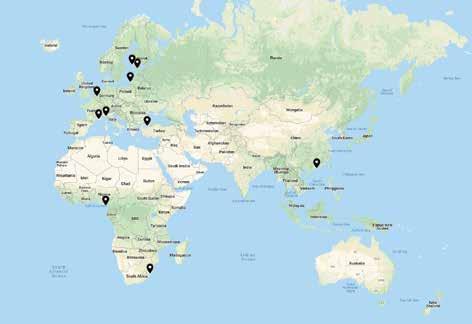


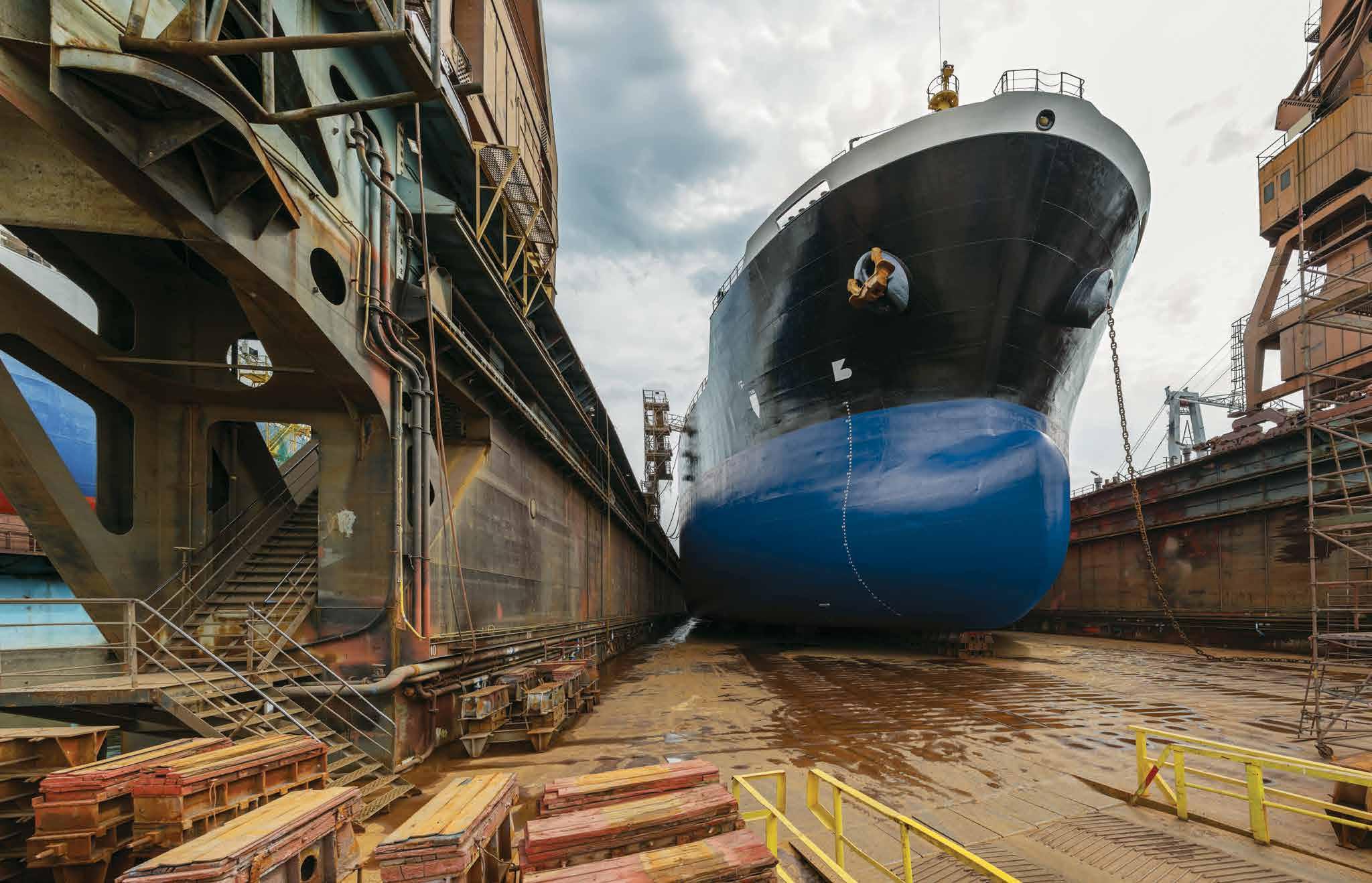

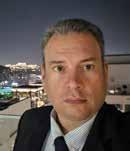
Ελληνόκτητος Στόλος: Νέα Ρεκόρ σε Αριθμό, DWT και GT

Γράφει ο Νίκος Κ. Δούκας, Δημοσιογράφος, Μέλος ΕΣΗΕΑ, Τιμητική Διάκριση Δημοσιογραφίας Ιδρύματος Μπότση
Για 37η συνεχή χρονιά το Greek Shipping Cooperation Committee παρουσιάζει στατιστικά στοιχεία, σχετικά με τα ελληνόκτητα πλοία άνω των 1.000 GT, νηολογημένα υπό ελληνική και άλλη σημαία. Τα στοιχεία παρασχέθηκαν από την S&P Global Market Intelligence.
Σ
ε σύγκριση µε τα αντίστοιχα στοιχεία του προηγούµενου έτους, δείχνουν ότι κατά τη διάρκεια του έτους έως τον Μάρτιο του 2024, ο υπό ελληνικό έλεγχο στόλος αυξήθηκε από πλευράς αριθµού πλοίων, DWT και GT. Σύμφωνα με τα στοιχεία, στις 4 Μαρτίου 2024, τα ελληνικά συμφέροντα έλεγχαν ένα ρεκόρ 4.212 πλοίων διαφόρων κατηγοριών, συνολικής χωρητικότητας 355.209.500 DWT και 208.252.588 GT. Σε σύγκριση με τα στοιχεία του προηγούμενου έτους, αυτό αντιπροσωπεύει αύξηση κατά 102 πλοία, 5.992.356 DWT και 3.905.226 GT. Στα στοιχεία αυτά δεν περιλαµβάνονται 373 πλοία διαφόρων κατηγοριών που βρίσκονται υπό παραγγελία από τα ναυπηγεία, συνολικής χωρητικότητας 33.143.130 DWT και22.889.399 GT. Είναι ενδιαφέρον ότι τα στοιχεία του βιβλίου παραγγελιών αντιπροσωπεύουν αύξηση 50% στις νέες παραγγελίες, γεγονός που υποδηλώνει μεγαλύτερο ενδιαφέρον των Ελλήνων πλοιοκτητών για πλοία νέας τεχνολογίας. Για πρώτη φορά μετά από πολλά χρόνια, ο στόλος που είναι νηολογημένος υπό ελληνική σημαία παρέμεινε σταθερός όσον αφορά τον αριθμό των πλοίων, εξακολουθώντας να αποτελείται από 496 πλοία. Αυτό αντανακλά τα θετικά αποτελέσματα των πρόσφατων μεταρρυθμίσεων στο ελληνικό νηολόγιο. Ωστόσο, σημειώθηκε μια μικρή μείωση σε όρους DWT και GT, με τα στοιχεία να ανέρχονται πλέον σε 30.759.394 GT και 51.694.269 DWT, σε σύγκριση με τα στοιχεία του προηγούμενου έτους που ήταν 31.150.523 GT και 52.768.867 DWT.
Ο υπό ελληνικό έλεγχο στόλος είναι νηολογημένος σε περίπου 32 σημαίες.Η ανάλυση σημαίας των πλοίων που ανήκουν σε ελληνικές μητρικές εταιρείες, η οποία δίνει το συνολικό αριθμό των πλοίων, το συνολικό DWT και το συνολικό GT, που είναι νηολογημένα σε κάθε ένα από τα κύρια νηολόγια που χρησιμοποιούν οι Έλληνες πλοιοκτήτες, σε σύγκριση με τον αντίστοιχο πίνακα του προηγούμενου έτους, δείχνει ότι η Λιβερία απέκτησε 79 πλοία, οι Νήσοι Μάρσαλ απέκτησαν 34 πλοία, η Κύπρος απέκτησε 19 πλοία και η Πορτογαλία απέκτησε 2 πλοία. Από την άλλη πλευρά, οι υπόλοιπες σημαίες σημείωσαν ελαφρά μείωση στον αριθμό των νηολογημένων πλοίων, με τη σημαία της Μάλτας να καταγράφει απώλεια 23 πλοίων, τις Μπαχάμες 8 πλοία, ενώ οι σημαίες του Παναμά, των Βερμούδων και της Νήσου Μαν σημείωσαν απώλεια 2 πλοίων η καθεμία. όπως προαναφέρθηκε, ο αριθμός των πλοίων που είναι νηολογημένα υπό ελληνική σημαία παρέμεινε φέτος ο ίδιος, αν και σημειώθηκε ελαφρά μείωση κατά 1.074.598 σε DWT και 391.129 σε GT.
Συνολικά, οι σημαίες της Λιβερίας και των Νήσων Μάρσαλ βρίσκονται στην πρώτη γραμμή του ελληνόκτητου στόλου με 1.159 και 1.096 ελληνόκτητα πλοία, αντίστοιχα, στα νηολόγιά τους. Σε όρους DWT, η Λιβερία αντιπροσωπεύει 104.171.885 πλοία, δηλαδή 29,3%, και η Νήσος Μάρσαλ 86.425.552 πλοία, δηλαδή 24,3% του συνολικού DWT του ελληνόκτητου στόλου, ενώ η ελληνική σημαία ακολουθεί με 496 πλοία 51.694.269 DWT. Θα πρέπει να σημειωθεί

ότι η ελληνική σημαία παραμένει στην τρίτη θέση παγκοσμίως σε όρους DWT, καθώς αντιπροσωπεύει το 14,5% του συνολικού DWT του ελληνόκτητου στόλου. Σε όρους DWT, η Μάλτα ακολουθεί με 536 πλοία 48.815.924 DWT, αντιπροσωπεύοντας το13,7% του συνολικού DWT του ελληνόκτητου στόλου. Ακολουθούν ο Παναμάς με 327 πλοία 21.697.189 DWT, οι Μπαχάμες με 202 πλοία 17.549.992 DWT και η Κύπρος με 234 πλοία 16.812.743 DWT. Επιπλέον, πρέπει να σημειωθεί ότι ο συνολικός αριθμός των πλοίων που είναι νηολογημένα υπό σημαία ΕΕ ανέρχεται σε 1.278, που αντιστοιχεί στο 30,3% του ελληνικού στόλου. Ο αριθµός αυτός µειώθηκε ελαφρά σε σύγκριση µε τον περσινό αριθµό των 1.280 σκαφών, που αντιπροσώπευε το 31,1% του ελληνικού στόλου. Όσον αφορά το βιβλίο παραγγελιών ως προς τον τύπο των πλοίων, σήμερα υπάρχουν 112 δεξαμενόπλοια πετρελαίου σε παραγγελία για λογαριασμό Ελλήνων πλοιοκτητών, 32 δεξαμενόπλοια χημικών και προϊόντων, 77 δεξαμενόπλοια υγροποιημένου αερίου, 107 πλοία μεταφοράς μεταλλεύματος και χύδην φορτίου, 35 πλοία μεταφοράς εμπορευματοκιβωτίων και 10 φορτηγά πλοία σε παραγγελία. Συνολικά, ο ελληνόκτητος στόλος ανέρχεται στο 6,7% του παγκόσμιου στόλου από πλευράς αριθμού πλοίων, 12,9% από πλευράς GT και 15,1% από πλευράς DWT.Ο ελληνόκτητος στόλος ως ποσοστό του παγκόσμιου στόλου, από πλευράς αριθμού
πλοίων, GT και DWT είναι 0,8%, 1,9% και 2,2% αντίστοιχα. Σημειώνεται, ωστόσο, ότι για τα πετρελαιοφόρα τα ποσοστά είναι 5,5%, 5,9% και 6% αντίστοιχα.
Λόγω της ασταθούς κατάστασης στην Ουκρανία/Ρωσία και την Ερυθρά Θάλασσα, καθώς και της χαμηλής στάθμης της Διώρυγας του Παναμά και των επικείμενων ρυθμιστικών απαιτήσεων, σημειώθηκαν μικρές αυξήσεις και μειώσεις στις περισσότερες κατηγορίες του ελληνόκτητου στόλου. Ειδικότερα, αύξηση του ελληνικού στόλου ως ποσοστό του παγκόσμιου στόλου καταγράφηκε στις κατηγορίες των πλοίων μεταφοράς μεταλλευμάτων και χύδην φορτίου, των φορτηγών πλοίων και των λοιπών φορτηγών πλοίων. Οι υπόλοιπες κατηγορίες σημείωσαν μικρή μείωση σε αριθμό πλοίων και DWT, σε σχέση με τον αντίστοιχο τύπο του παγκόσμιου στόλου για το έτος 2023. Η μέση ηλικία του ελληνόκτητου στόλου σε όρους πλοίων αυξήθηκε ελαφρώς σε σύγκριση
8 Ανεμολόγιο
NAFS | MARCH 2024
ηλικία του ελληνόκτητου
σε
πλέον σε 13,7 έτη, έναντι 18,2 ετών για τον παγκόσμιο στόλο. Σε όρους GT και DWT, είναι 12,1 και 12 έτη αντίστοιχα, έναντι 13,1 και 12,8 του παγκόσμιου στόλου. Η μέση ηλικία του υφιστάμενου στόλου υπό ελληνική σημαία κατέγραψε μικρή αύξηση σε όρους αριθμού πλοίων, καθώς ανέρχεται πλέον σε 15,5 έτη, έναντι 15 το 2023. Μικρή αύξηση σημειώθηκε και σε όρους GT και DWT, με τιμές 10,3 και 9,9 αντίστοιχα, έναντι 10 και 9,7 ετών το 2023.
με το προηγούμενο έτος, αλλά εξακολουθεί να είναι 4,5 έτη κάτω από τη μέση ηλικία του παγκόσμιου στόλου. Η μέση
στόλου
όρους πλοίων ανέρχεται

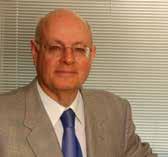
The Development and Prospects of Sale and Leasebacks (SLBs) in shipping
By Ted Petropoulos, Head, Petrofin Research©
Leasing is not a new concept. It has been a method of finance for decades. Initially developed in the West, it relied on the combination of the security of long term charters, the benefits arising from ‘ownership’ of the vessels by Lessors and ability to reduce their tax obligations. Especially over the past 15 years, SLBs, either with options to buy or in JOLCO form, have grown more popular.
Basic structure of a SLB
SLBs represent an evolution of the leasing concept in shipping. This involves a Leasing company or local owner taking ownership of the vessel and the original owner becoming the Lessee charterer under a bareboat charter agreement. This provides tax benefits and often the Lessor is an individual shipping company which enjoys them directly. The structure is also considered less risky to Lessors in comparison to bank finance, as in the event of default by the Lessee (charterer) the vessel is simply repossessed without resorting to a foreclosure and associated legal methods of acquiring control of the asset. Also, SLBs have an underlying bank financing to the Lessor owner secured on a mortgage.
SLBs often have a lower cost, i.e. a lower margin than loans and often involve longer repayment periods than bank loans. This is particularly the case during periods of high interest rates, when long term interest rates are lower that short term ones. However, the overall cost is influenced by the leverage of the SLB.
Lessees (charterers) have the obligation to repay the underlying facility via bareboat payments enjoying either a fixed rate of interest (inclusive of margin) or a variable rate based on SOFR or similar. At the end of the life of the SLB usually there is an obligation to buy at the residual amount, but not always, as some are simple operating leases (JOLCO).
SLBs usually have a higher Loan to Value (LTV) than bank loans and often up to 80% of the underlying value of the asset, which has rendered them increasingly popular. The Lessee (charterer) who is really effectively the shadow-owner of the vessel
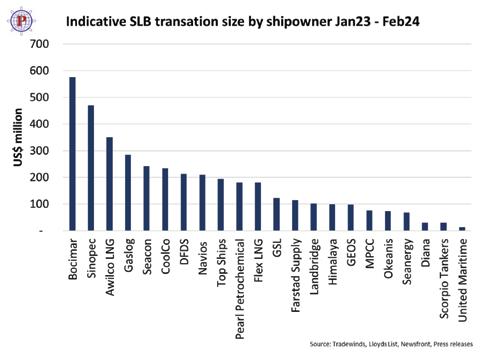
GRAPH 1
As seen in Graph 1 above, close to US$4 billion worth of transactions encompassing 105 vessels were reported in 2023 onwards. Although still substantial, the overall size of the SLB market is assumed to be much larger. Some Greek shipowners like Navios, Dorian, Diana Shipping, Mybulk and others have also taken advantage of such deals, although in many SLBs the exact amounts have not been disclosed.
may use SLB in newbuilding finance or in second-hand purchase finance, even though the latter is not as prevalent due to the time needed for SLBs, often involving 3-4 months to complete.
SLBs are often used to refinance assets, where their underlying loans have fallen in comparison to market value and where a higher LTV can be supported by the vessel’s cash flow. This method has been used widely by both public and private companies, especially during the last years when asset values have appreciated.

A key advantage of SLBs is that they usually are single asset financing on a vessel by vessel basis but fleets are also done simultaneously in such way. Another feature of SLBs is their lack of financial covenants, such as maintaining LTVs, interest cover and minimum net worth covenants. This provides comfort to the shadow-owner in that all it has to do is somehow meet the bareboat payments. Often in bank finance in a weak market, owners face both the need to repay their loan obligations, as well as the need to meet LTV breaches by
10 Financial Focus NAFS | MARCH 2024
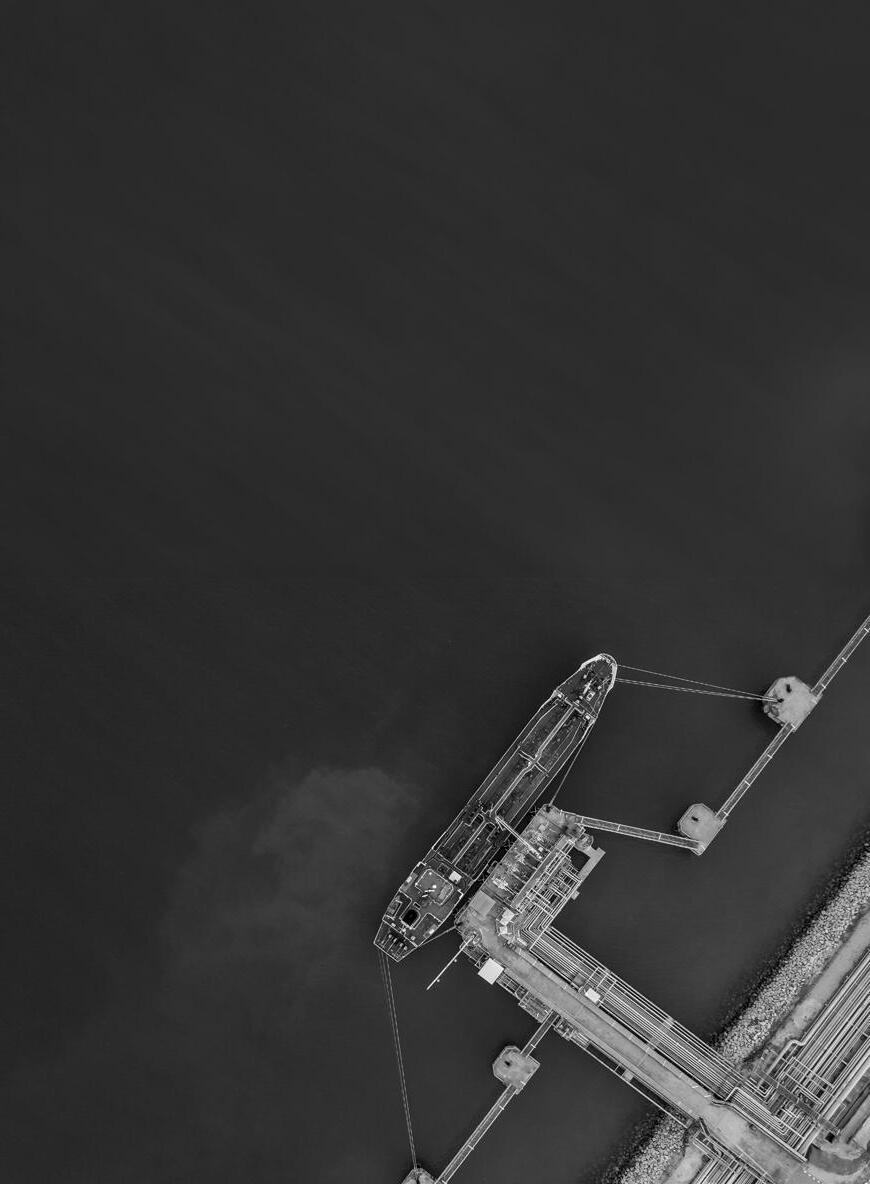
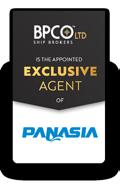
PANASIA GENUINE SPARE PARTS 24/7 SUPPORT & TROUBLESHOOTING TECHNICAL SUPERVISION SERVICE AGREEMENT & MAINTENANCE TRAINING CENTER HEAD OFFICE 13-17 Andrea Kalvou str. 15233, Chalandri, Athens, Greece +30 210 6850413, +30 211 7004512 products@bpco-group.com, repairs@bpco-group.com created by freshdesign.gr bpco-group.com
injecting additional capital.
Most SLBs are for amounts ranging between US$10-50m, but especially for newbuilding fleets done en block the amounts are considerably higher. A strong holding company guarantee is often required as a minimum in such transactions and ensures more competitive terms.
However, there are also drawbacks to SLBs. The main one is its inflexibility, as the bareboat obligations have to be paid ‘hell or high water’, in order to allow the Lessee (charterer) to have the right to pay off the balance of the underlying loans and regain ownership of the vessel at preset times varying between 1-5 years. As such, their method of finance is inflexible and subject to market volatility in shipping, thus increasing the underlying owner’s capital risk. In addition, legal costs are higher and the overall structure is more complex compared to traditional bank finance. However, law firms have by now become very proficient in such legal work.
Over time however, the concerns over SLBs have dissipated and they are now seen as a mainstream source / basis of ship finance.
Active SLB Markets
The Chinese market is considered to be the biggest SLB market and often represents the best solution for Chinese newbuildings. They tend to be more complex in structure. In recent years, numerous Chinese Lessors have developed interests from the largest to smaller transactions and have been offering services to second-hand vessel deals. Chinese Lessors have grown their ability and appetite for almost all vessel types, ages and amounts.
Japanese SLB activity has also grown substantially over the last 15 years. Invariably, it focuses on Japanese built or Japanese managed shipyards. Furthermore, Japanese trading houses play a pivotal role as well, as they usually identify one of their Japanese clients to be the owner. They structure and negotiate the terms, as well as continue to remain in the picture throughout the life of the transaction. They also negotiate with Japanese banks for financing the Japanese SLB owners.
As Japanese owners find themselves awash with liquidity and fewer newbuilding opportunities, their interest has turned to SLBs (JOLCO or with obligation to buy by the shadow owner) in the second-hand market. These are usually US Dollar de-
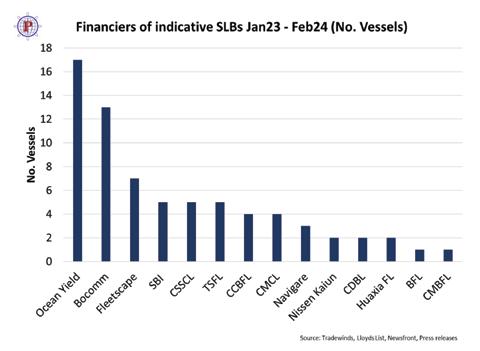
GRAPH 2
As seen in Graph 2 of SLB financiers, Ocean Yield has done a large number of transactions in terms of number of vessels. Also, it is noteworthy that many Chinese financiers were involved in such deals. Interestingly, Chinese SLBs usually involve higher numbers.
Furthermore, Japanese trading houses are reported to have entered into more than one hundred deals during 2023. This can partially be attributed to their increasing involvement in the Greek shipping market. Also, financiers like Fearnleys Securities, Maersk, North Cape, Berenberg and others have been active in 2023 / 2024. Interesting to note, that in this type of transaction clusters of vessels are commonplace. For example, MPCC concluded a deal for 12 containers with Bocomm and Bocimar did 10 bulkers with Ocean Yield. All these come under the guarantee of the parent company.
As long as the US Dollar remains a strong stable currency and shipping’s cash flows, liquidity and prospects remain positive, the SLB market should continue to thrive and provide a credible alternative to bank finance.
nominated and are attractive due to the low values of the Yen against the US Dollar. Japanese owners, such as Nissen Kaiun, Nisshin Shipping, Doun Kisen, but even smaller ones such as Shunzan Kaiun and Imahatsu Kaiun, have increasingly relied on Japanese SLBs with the support of regional Japanese banks, who are also keen to develop their shipping loan portfolios. However, similar SLBs are also done with non-Japanese owners, namely major charterers such as Oldendorff, Norden and others. Such names often also have the ability to arrange Chinese SLBs on most competitive terms for their newbuildings.
Over time, Western banks and finance houses have also developed the ability to structure SLBs in China and Japan always associated with local lessors / banks. The Korean market also provides SLB capability for Korean newbuildings, as well as Taiwan and Singapore and lately the

Middle East.
Available Information
There is no vast information on SLB transactions as, with the exception of publicly quoted companies, private owners have no obligation to report them and often will not reveal their terms. This represents a challenge to researchers. As such, there is no comprehensive picture of the total figures regarding amounts as well as number of owners who choose this method to release capital for / refinance of other ventures. There is also limited information on the number of vessels that are entered into SLBs and their terms. The following indicative table has focused on publicly available information via the companies themselves or other stakeholders in the SLB market. Interestingly, some Greek shipowners have been entering into such transactions taking the role of the shadow owner as featured in the table.
12 Financial Focus NAFS | MARCH 2024
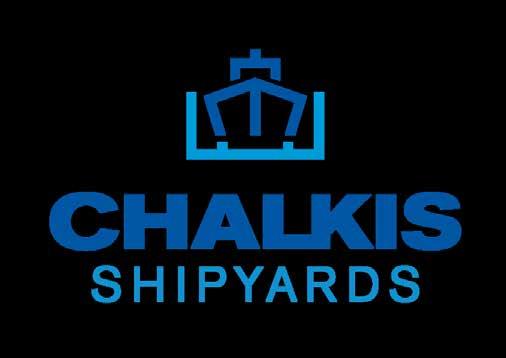
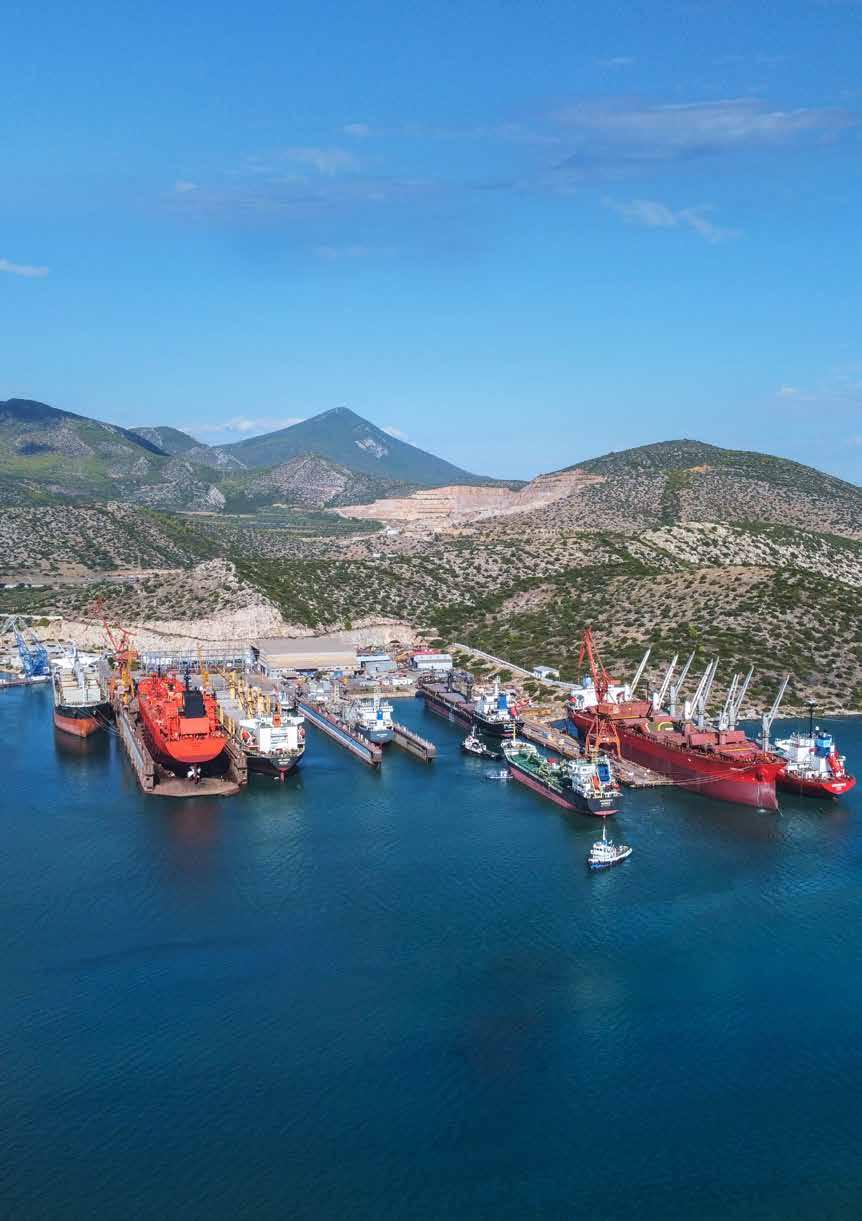
info@chalkis-shipyards.gr Vathi Avlidas-Evia 34100-Greece (+30)22210-33300 (+30)22210-30374 Conveniently Located Experience Elevated Quality Committed CHALKIS SHIPYARDS CHALKIS SHIPYARDS w w w . c h a l k i s - s h i p y a r d s . g r
Table 1: Indicative Sale-and-Leaseback deals, January 2023 - February 2024
Indica've Sale-and-leaseback deals

14 Financial Focus NAFS | MARCH 2024
Company Vessel Type Financier Financing Amount Dura'on Repurchase Terms Charter Rate Awilco LNG 2 LNGs CCBFL $175m each 10 years Buyback Price: $37.5m each + repurchase opDons $45,000/day Bocimar 10 Newcastlemaxes Ocean Yield $576m 15 years NA NA Capital Product Partners 1 LNG NA $196.3m 10 years Buyback Price: $98.2m + repurchase opDons aQer 1 year $5.5m/quarter (3 years)+ $1.1m Cetus MariDme 4 Handies SBI NA NA NA NA CoolCo 2 LNGs Huaxia FL $234m (6%<) 10 years Buyback Price: $234m each fixed daily rate Diana Shipping 1 Ultramax Japanese $29.85m 10 years Repurchase opDons aQer 3 years $8,950/day Dorian LPG 1 VLGC Japanese NA 13 years NA NA Euronav 2 VLCCs Ocean Yield NA 14 years NA NA 2 Suezmaxes Ocean Yield NA 14 years NA NA Euroseas 1 Container Japanese NA 8-10 years NA $17,000/day Farstad Supply 2 AHTS Ocean Yield $114m 12 years Repurchase opDons aQer 5 years NA Flex LNG 1 LNG SBI Leasing $180m 10 years NA NA Gaslog 2 LNGs CDBL $284m 5 years No repurchase opDon or obligaDon NA Global Ship Lease 4 Containers NA $123m 2 years NA 2+1 year chopt Golden Energy Offshore 6 PSVs + 1 SSV Fleetscape/ Vroon $98.55m (6.5% +SOFR) 5 years Put/call: $17.99m aQer 5 years + repurchase opt 2 years NA Himalaya Shipping 2 Newcastlemaxes CCBFL $49.3m each NA NA NA Landbridge Group 2 VLCCs CSSC Shipping $102m 7/9 years NA $172.4m + interest of $51.4m MISC 2 LNGs Nissen Kaiun NA NA NA NA MPC Container Ships ASA 12 containers Bocomm $75m NA NA NA DFDS 3 Ro-Ros Navigare $212m 5 years Right of first refusal to repurchase at end of lease NA Navios 1 dry bulk NA $32M (2% +LIBOR) 10 years NA NA 2 Containers + 2 Tankers NA $178m (2.1% +SOFR) 10 years NA NA Nordic American Tankers 1 Suezmax Ocean Yield NA 8 years NA NA Okeanis Eco Tankers 1 VLCC CMBFL US$73,50 7 years Repurchase opDons aQer 1 year and throughout term $13,000/day + variable 190 > SOFR Pearl Petrochemical 3 VLGCs CSSCL $180.4m 10 years NA $210.3m + interest of $46.7m Scorpio Tankers 3 MRs Taiping & Sinopec FL NA NA Buyback Price: $45.6m NA 3 MRs NA NA NA Buyback Price: $29m NA 2 MRs NA $29.1m NA N/A NA

16 Financial Focus NAFS | MARCH 2024
Indica've Sale-and-leaseback deals
Conclusions
Initial concerns by owners have dissipated over time. The advantages of SLBs are significant and so is their attractiveness. This is self-evident by the growth of reported SLBs in the industry and the increasing involvement of Greek shipowners. As can be seen in table 1, the increasing number of SLBs highlight their popularity.
With shipping enjoying a rare period of substantial liquidity and satisfactory cash flows, as well as on the whole rising vessel prices, SLBs have not recently come under threat as a method of financing. There remains to be seen how they might fare should there be a sizeable collapse in vessel cash flows, as happened in 2007/2008. The high liquidity in shipping, though, adds comfort in this regard.
For the time being, SLBs are thriving and are filling the gap created by the departure of many Western banks over the last decade.


Tankers NA +SOFR) 10 years NA NA Nordic American Tankers 1 Suezmax Ocean Yield NA 8 years NA NA Okeanis Eco Tankers 1 VLCC CMBFL US$73,50 7 years Repurchase opDons aQer 1 year and throughout term $13,000/day + variable 190 > SOFR Pearl Petrochemical 3 VLGCs CSSCL $180.4m 10 years NA $210.3m + interest of $46.7m Scorpio Tankers 3 MRs Taiping & Sinopec FL NA NA Buyback Price: $45.6m NA 3 MRs NA NA NA Buyback Price: $29m NA 2 MRs NA $29.1m NA N/A NA 3 Handymaxes NA NA NA Buyback Price: $33.7m NA Seacon shipping 2 Chemical tankers NA $14m each 2 Years NA $16,250/day + opt $16,500/day (TC) 1 Handy BFL $21.25m 10 years Repurchase opDons throughout term $11m total period 4 mulD purpose CMCL $166m 15 years Buyback Price: $13m each (aQer 2 years)+ repurchase opDons NA 1 Kamsarmax Bocomm $27m 10 years Buyback opDon 4 years NA Seanergy MariDme 1 Capesize Japanese $19m (2.8%+ SOFR) 6 Years Repurchase at end of term at no addiDonal cost. Repurchase opt 2 years $300,000/month 1 Capesize Japanese $19m (3% +SOFR) 53 months Buyback Price: $7.8m + repurchase opt 2 years $200,000/month 3 Capes Chinese $30m (3.3% +SOFR 3 years Buyback Price: $5m $140,000/month Sinopec 2 LNGs TSFL $235m each 15 years Buyback Price: $315.7m and $316.5m NA Top Ships 2 Suezmaxes Chinese $41m (2.65% +SOFR) 10 Years Buyback Price: $19m each + repurchase opDons NA 2 VLCCs Chinese $62.5m each 8 years Buyback Price: $37.5m each + repurchase opDons $20,000/day 1 MR Japanese $28m (2.6% +SOFR) 7 years Buyback Price: $14m NA United MariDme 1 Panamax Japanese $13.8m (2.65% +SOFR) 6 Years Buyback Price: $16.6m + repurchase opt 2 years $8,000/day
Source: Newsfront, Tradewinds, Lloyds List, Companies' Press Releases
Company Vessel Type Financier Financing Amount Dura'on Repurchase Terms Charter Rate Awilco LNG 2 LNGs CCBFL $175m each 10 years Buyback Price: $37.5m each + repurchase opDons $45,000/day Bocimar 10 Newcastlemaxes Ocean Yield $576m 15 years NA NA Capital Product Partners 1 LNG NA $196.3m 10 years Buyback Price: $98.2m + repurchase opDons aQer 1 year $5.5m/quarter (3 years)+ $1.1m Cetus MariDme 4 Handies SBI NA NA NA NA CoolCo 2 LNGs Huaxia FL $234m (6%<) years Buyback Price: $234m each fixed daily rate Diana Shipping 1 Ultramax Japanese $29.85m 10 years Repurchase opDons aQer 3 years $8,950/day Dorian LPG 1 VLGC Japanese NA 13 years NA NA Euronav 2 VLCCs Ocean Yield NA 14 years NA NA 2 Suezmaxes Ocean Yield NA 14 years NA NA Euroseas 1 Container Japanese NA 8-10 years NA $17,000/day Farstad Supply 2 AHTS Ocean Yield $114m 12 years Repurchase opDons aQer 5 years NA Flex LNG 1 LNG SBI Leasing $180m 10 years NA NA Gaslog 2 LNGs CDBL $284m 5 years No repurchase opDon or obligaDon NA Global Ship Lease 4 Containers NA $123m 2 years NA 2+1 year chopt Golden Energy Offshore 6 PSVs + 1 SSV Fleetscape/ Vroon $98.55m (6.5% +SOFR) 5 years Put/call: $17.99m aQer 5 years + repurchase opt 2 years NA Himalaya Shipping 2 Newcastlemaxes CCBFL $49.3m each NA NA NA Landbridge Group 2 VLCCs CSSC Shipping $102m 7/9 years NA $172.4m + interest of $51.4m MISC 2 LNGs Nissen Kaiun NA NA NA NA MPC Container Ships ASA 12 containers Bocomm $75m NA NA NA DFDS 3 Ro-Ros Navigare $212m 5 years Right of first refusal to repurchase at NA Navios 1 dry bulk NA 2 Containers + 2 Tankers NA Nordic American Tankers 1 Suezmax Ocean Yield Okeanis Eco Tankers 1 VLCC CMBFL Pearl Petrochemical 3 VLGCs CSSCL Scorpio Tankers 3 MRs Taiping & Sinopec FL 3 MRs NA 2 MRs NA 3 Handymaxes NA 2 Chemical tankers NA $14m each 2 Years NA $16,250/day + opt $16,500/day (TC) 1 Handy BFL $21.25m 10 years Repurchase opDons throughout term $11m total period
GRAPH 3
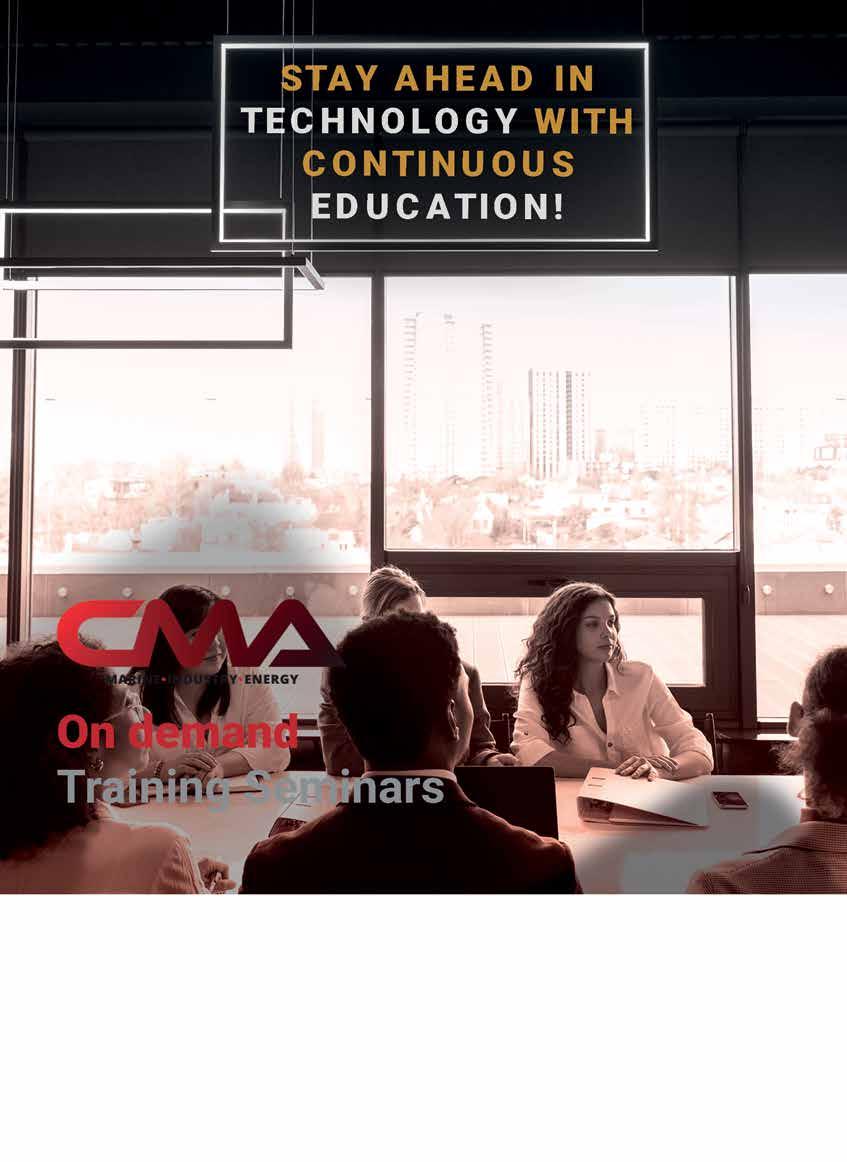


Γιώργος Ανδρούτσος
Director Audit, KPMG
Ο Ελληνικός Εφοπλισμός στην Παγκόσμια Ναυτιλία Προκλήσεις και Επιπτώσεις από τις Παγκόσμιες Εξελίξεις

“Προς το παρόν, για όλα τα προτεινόμενα εναλλακτικά καύσιμα, έχουν εκφραστεί από παράγοντες της ναυτιλίας, ισχυρές και στοιχειοθετημένες επιφυλάξεις ως προς την ασφάλεια χρήσης τους, την διαθεσιμότητα τους σε επαρκείς ποσότητες, τις επιπτώσεις σημαντικής περιβαλλοντικής ρύπανσης σε περίπτωση ατυχήματος, καθώς και για το ενεργειακό αποτύπωμα του κύκλου παραγωγής των εναλλακτικών καυσίμων. Μένει να αποδειχτεί, στο εγγύς μέλλον, εάν αυτές οι απόπειρες για εναλλακτικά καύσιμα θα μπορέσουν να εφαρμοστούν σε ευρεία κλίμακα”.
Συνέντευξη
Η στρατηγική του ΙΜΟ για τη μείωση των εκπομπών GHG είναι σήμερα η υπ’ αριθμόν ένα πρόκληση για τη ναυτιλιακή βιομηχανία. Πιστεύετε ότι σήμερα η παγκόσμια ναυτιλία βαδίζει σε έναν πράσινο διάδρομο προς την επίτευξη των μηδενικών εκπομπών; Τι θα πρέπει να γίνει από εδώ και πέρα για ένα βιώσιμο μέλλον στον κλάδο όσον αφορά την «καθαρότερη» ναυτιλία;
H παγκόσμια ναυτιλία έχει ξεκινήσει εδώ και αρκετά χρόνια τη διαδικασία μετάβασης προς την επίτευξη μηδενικών εκπομπών μέσω των δεσμεύσεων του ΙΜΟ, αρχικά για μείωση κατά 50% των εκπομπών διοξειδίου του άνθρακα και σύμφωνα με την προσφάτως αναθεωρημένη στρατηγική του για την επίτευξη μηδενικών εκπομπών διοξειδίου του άνθρακα έως και το 2050. Σταδιακά ο ΙΜΟ εισαγάγει διάφορους επιμέρους στόχους και κανονισμούς εναρμόνισης προς τον σκοπό αυτό ήδη από το 2011. Εκτός από τον IMO και άλλοι θεσμικοί φορείς, όπως η Ευρωπαϊκή Ένωση (ΕΕ), ωθούν τη ναυτιλία προς αυτή την κατεύθυνση μέσω του

ΕU Taxonomy για τις πράσινες επενδύσεις και της εισαγωγής της ναυτιλίας στο σύστημα εμπορίας δικαιωμάτων εκπομπών της ΕΕ (EU ETS). Βασικό ζητούμενο από εδώ και πέρα, για τη βιώσιμη και επιτυχή μετάβαση της ναυτιλίας σε μια βιομηχανία μηδενικών εκπομπών, είναι η εύρεση του κατάλληλου εναλλακτικού καυσίμου, ασφαλούς και συμβατού τεχνολογικά, το οποίο θα μπορέσει να αντικαταστήσει τα ορυκτά καύσιμα. Διάφορες προτάσεις έχουν γίνει προς αυτή την κατεύθυνση, και ήδη βλέπουμε τις πρώτες προσπάθειες πρακτικής εφαρμογής τους με κάποια νεότευκτα πλοία είτε να είναι τεχνικά έτοιμα να χρησιμοποιήσουν μελλοντικά με μικρές τροποποιήσεις κάποιο εναλλακτικό καύσιμο , ή να χρησιμοποιούν κάποιο εναλλακτικό καύσιμο ήδη (υδρογόνο, αμμωνία). Μένει να αποδειχτεί, στο εγγύς μέλλον, εάν αυτές οι απόπειρες θα μπορέσουν να εφαρμοστούν σε ευρεία κλίμακα. Προς το παρόν, για όλα τα προτεινόμενα εναλλακτικά καύσιμα, έχουν εκφραστεί από παράγοντες
exclusive 18
NAFS | MARCH 2024
της ναυτιλίας, ισχυρές και
επιφυλάξεις ως προς την ασφάλεια χρήσης τους, την
τους σε επαρκείς ποσότητες, τις επιπτώσεις
στοιχειοθετημένες
διαθεσιμότητα





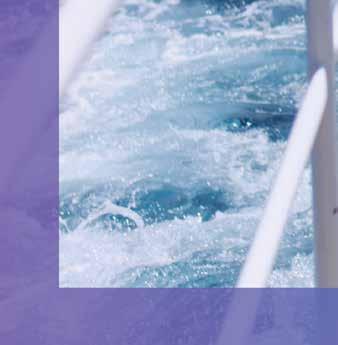


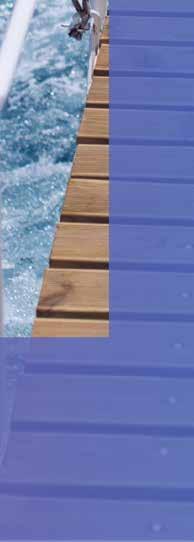
kpmg.com/gr/shippingandports Audit, Tax & Legal, Consulting, Deal Advisory General Electronic Commercial Registry 001352601000 © 2023 KPMG Certified Auditors S.A., a Greek Societe Anonyme and a member firm of the KPMG global organization of independent member firms affiliated with KPMG International Limited, a private English company limited by guarantee. All rights reserved. Come Onboard Shipping & Ports

ή περισσότερο, όλους τους κλάδους της παγκόσμιας οικονομίας, παρατηρούμε ότι η αξιολόγηση των σχετικών κινδύνων, και το πώς αυτοί γίνονται αντιληπτοί και αντιμετωπίζονται από τις εταιρείες, συγκεντρώνει την προσοχή των οργανισμών θέσπισης προτύπων και των επιτροπών κεφαλαιαγοράς και χρόνο με το χρόνο, οι διαδικασίες που απαιτούνται για την κάλυψη των συγκεκριμένων κινδύνων πληθαίνουν και ποσοτικά και ποιοτικά. Εκτός από τις ήδη διαδεδομένες μεθόδους κυβερνοεπιθέσεων, όπως η υποκλοπή δεδομένων από εταιρείες με την απαίτηση επιστροφής τους με χρηματικό αντάλλαγμα ως λύτρα (ransomware), και η ραγδαία ανάπτυξη της τεχνητής νοημοσύνης δημιουργεί σημαντικές νέες προκλήσεις στον τομέα της κυβερνοασφάλειας. Νέα εργαλεία, όπως η παραποίηση προσώπου, η παραποίηση φωνής, η συνθετική ταυτότητα, η εξελιγμένη πλαστογράφηση εγγράφων κ.ά., δημιουργούνται και εξελίσσονται συνεχώς, με σκοπό την ηλεκτρονική απάτη. Η αντιμετώπιση της αυξανόμενης απειλής των κυβερνοεπιθέσεων απαιτεί μια πολυδιάστατη προσέγγιση. Οι ναυτιλιακές εταιρείες πρέπει, εγκαίρως και επαρκώς, να ενισχύσουν το περιβάλλον κυβερνοασφάλειας των εταιρειών τους, υιοθετώντας τις πιο σύγχρονες τεχνολογίες και πολιτικές ασφαλείας, καθώς και να στελεχώσουν τις επιχειρήσεις τους με εξειδικευμένο και καταρτισμένο προσωπικό. Επίσης, τα διοικητικά συμβούλια και οι διάφορες υποεπιτροπές, όπως οι επιτροπές ελέγχου όπου υπάρχουν, είναι κρίσιμο και αναγκαίο να εξασκούν αποτελεσματικό έλεγχο και να διασφαλίζουν ότι η προστασία της εταιρείας από κακόβουλες ηλεκτρονικές επιθέσεις βρίσκεται στο υψηλότερο δυνατό επίπεδο. Τέλος, συνεχής εκπαίδευση και ενημέρωση στα θέματα της κυβερνοασφάλειας θα πρέπει να παρέχεται σε όλο το προσωπικό ανά τακτά χρονικά διαστήματα.
χρηματοδότησης του τραπεζικού κλάδου, δημιουργώντας ένα
Ανεμολόγιο
Ελληνόκτητος Στόλος: Νέα
Ρεκόρ σε Αριθμό, DWT και GT
“ Για 37η συνεχή χρονιά το Greek Shipping Cooperation Committee
παρουσιάζει στατιστικά στοιχεία, σχετικά με τα ελληνόκτητα πλοία άνω των
1.000 GT, νηολογημένα υπό ελληνική και άλλη σημαία. Τα στοιχεία
παρασχέθηκαν από την S&P Global Market Intelligence.“
Θα θέλαμε να μας σχολιάσετε την υποχώρηση των παραδοσιακών τρόπων χρηματοδότησης έναντι των εναλλακτικών που παρατηρείται τα τελευταία χρόνια στη ναυτιλιακή βιομηχανία.
Είναι γεγονός ότι οι εναλλακτικοί τρόποι χρηματοδότησης κερδίζουν συνεχώς έδαφος στη ναυτιλιακή βιομηχανία σε βάρος της παραδοσιακής τραπεζικής χρηματοδότησης, και αυτό οφείλεται σε αρκετούς παράγοντες. Πρώτα και κύρια, αρχής γενομένης από την τραπεζική κρίση του 2007, αλλά ιδιαίτερα μετά την πλήρη υιοθέτηση των κανονιστικών ρυθμίσεων της Βασιλείας ΙΙΙ, έχουν αυστηροποιηθεί σε εξαιρετικά μεγάλο βαθμό οι διαδικασίες
λιγότερο ευέλικτο και περισσότερο γραφειοκρατικό πλαίσιο για την δανειζόμενη επιχείρηση. Ακόμα και μικρές αλλαγές σε απλούς και επουσιώδεις όρους της δανειακής σύμβασης, που πριν από μερικά χρόνια θα μπορούσαν να εγκριθούν άμεσα από μεσαία τραπεζικά στελέχη, πλέον απαιτούν αυξημένες εγκρίσεις από ανώτερα στελέχη και επιτροπές, μέσω χρονοβόρων και γραφειοκρατικών διαδικασιών. Γνωρίζουμε ότι η ταχύτητα στη λήψη αποφάσεων είναι καθοριστικής σημασίας στο ναυτιλιακό κλάδο, καθώς το περιβάλλον στο οποίο επιχειρούν οι ναυτιλιακές επιχειρήσεις είναι άκρως ανταγωνιστικό, και τα παράθυρα ευκαιρίας για την πραγματοποίηση μιας επικερδούς συμφωνίας είναι πολύ μικρά, άρα οποιαδήποτε αργοπορία στη διασφάλιση χρηματοδότησης μπορεί να αποβεί μοιραία για την κατοχύρωση ενός καλού deal. Επιπλέον, στον Ευρωπαϊκό χώρο, η εφαρμογή του EU Taxonomy στις ναυτιλιακές μεταφορές και δραστηριότητες, ενδεχομένως αποκλείσει ολοκλήρους κλάδους της ναυτιλίας (π.χ. πετρελαιοφόρα) από τη λεγόμενη «πράσινη χρηματοδότηση», καθιστώντας τη χρηματοδότηση τους από τον ευρωπαϊκό τραπεζικό κλάδο από εξαιρετικά δαπανηρή, έως ανέφικτη. Ακόμα όμως και για τους κλάδους της ναυτιλίας που θα μπορούν να πληρούν τα κριτήρια της «πράσινης χρηματοδότησης», τα κόστη συμμόρφωσης με τα εν λόγω κριτήρια μπορεί να είναι απαγορευτικά για μικρές και μικρομεσαίες εταιρίες, αναγκάζοντάς τες να αναζητήσουν εναλλακτικές μη παραδοσιακές λύσεις χρηματοδότησης. Σε αυτά τα πλαίσια βλέπουμε μια εκθετική ανάπτυξη των εταιρειών που δραστηριοποιούνται στην παροχή εναλλακτικής χρηματοδότησης, τη συσσώρευση σημαντικών επενδυτικών κεφαλαίων στον κλάδο από παγκόσμια funds και την στελέχωση τους με έμπειρα πρώην τραπεζικά στελέχη. Η δυνατότητα ευελιξίας και ο μικρός χρόνος απόκρισης, το μικρότερο γραφειοκρατικό κόστος, το χαλαρότερο ρυθμιστικό πλαίσιο, η δυνατότητα παροχής εξατομικευμένων χρηματοδοτικών λύσεων στις ανάγκες της κάθε ναυτιλιακής επιχείρησης και η ποικιλία χρηματοδοτικών εργαλείων, είτε αυτά αφορούν δανεισμό, είτε leasing είτε εισφορά κεφαλαίου, έχουν καταστήσει τις εναλλακτικές πηγές χρηματοδότησης εξαιρετικά ελκυστικές για την ναυτιλία. Όλα δείχνουν ότι αυτή η τάση θα συνεχιστεί και τα επόμενα χρόνια, και δεν αποκλείεται η ναυτιλία να ακολουθήσει την πορεία όμορων κλάδων, όπως αυτός των αερομεταφορών, όπου οι εναλλακτικές πηγές χρηματοδότησης (κυρίως Leasing) αποτελούν σημαντικό μέρος της υφιστάμενης συνολικής χρηματοδότησης του κλάδου.
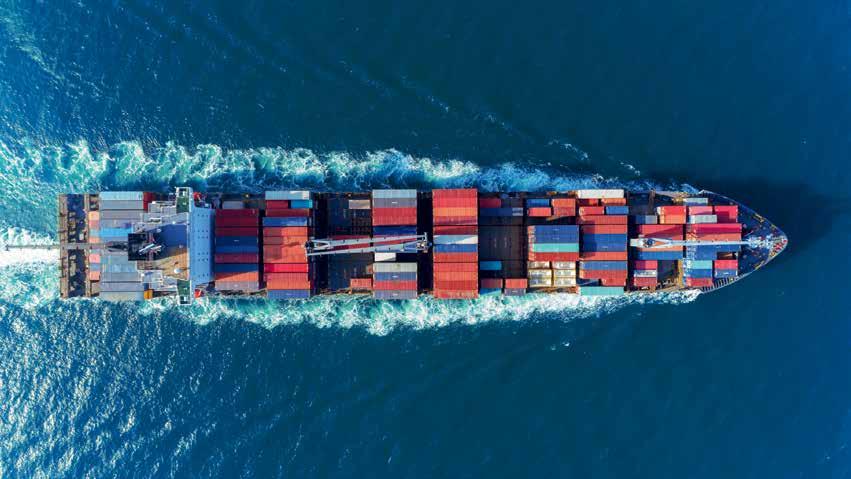

exclusive 22 NAFS | MARCH 2024
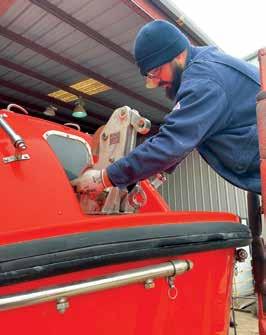

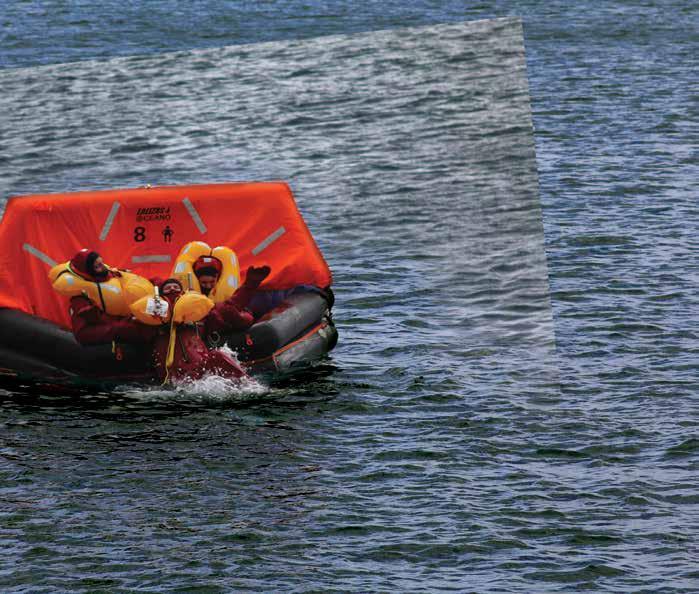


Navigating Excellence: The Norwegian – Greek Maritime Innovation Summit
A few Norwegians in Athens are always good for the booming Greek tourism economy, but what happens when more than a dozen carefully selected Norwegian maritime technologists come to Athens to share insights, connect with the customers, and participate in some insightful panel discussions? That happened just a few days ago in a unique location for a maritime technology conference.
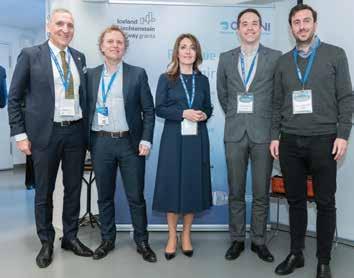
Oriani Hellas organized, curated, and hosted the event Navigating Excellence: The Norwegian – Greek Maritime Innovation Summit, held on March 13th & 14th at the Museum of Cycladic Art in Athens Greece. The event, supported by a grant from Iceland, Liechtenstein, and Norway through the EEA Grants Greece 2014-2021, in the frame of the Innovation, Business Development and SMEs program, brought together industry leaders, innovators, and stakeholders to explore digital and technological solutions that are and will transform the maritime landscape.
A dynamic mix of startups and global leading companies took center stage, showcasing the diversity and depth of Norway’s maritime technology landscape. From promising startups with fresh perspectives, to established industry players, the presence of these innovative entities led to a fruitful exchange of ideas and expertise. As Her Excellency Ms. Lajla Brandt Jakhelln, Ambassador of the Royal Norwegian Embassy in Athens, pointed out opening the event…
“The strong advantage for European economies has always been our ability to innovate and we must not forget this advantage in order to take the European shipping industry to the next level. Competition from Asia is fierce. Finding the right technology is crucial. These technologies again need the support of digitization and big data…”
Shipping is going through a period of MASSIVE change, at a much faster rate than ever before. Technology is being developed rapidly and while other industries are changing and adopting these tools, shipping is still traditional, and needs to catch up fast to ensure they remain competitive. We need technology, not only from a business perspective, where processes / people can become more efficient and more productive, but also to increase safety, to take better care of our crews, and to do everything we can to help save the planet.
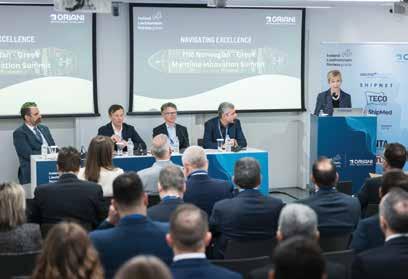
Regarding the “unique location” which was the Museum of Cycladic Art in Athens, Philip Nielsen the Co-founder of ORIANI HELLAS, mentioned:
“
…This building (the museum) has the aroma of the sea, of the Aegean Sea where Greek shipping began thousands of years ago. The Cycladic civilization placed human beings at its center. This same heritage, these same principles and same values are carried by the successful Greek shipping of TODAY, where human is still at the center for everything, we do…”
Outcomes of the event:
Day 1:
Session #1 focused on “Vessel Performance”, moderated by George Teriakidis, Area Manager at DNV Maritime Topics discussed:
• Hull Maintenance and its Role in Performance Optimization – Age Hojmark | CEO of Shipshave highlighted the critical importance of hull maintenance strategies in enhancing vessel performance, advocating for proactive approaches to achieve operational flexibility, cost reduction, and emission mitigation.
• Smarter Hull Management - a Proactive Approach - Manolis Levantis | Global Data Science Team Leader at Jotun, presented the benefits of proactive approach in hull management, fouling prediction algorithm and Jotun’s proactive solutions.
• “Practical Approach to Digital performance management” - Darri Gunnarsson | General Manager at Ascenz Marorka presented the value of performance monitoring, including real-life case studies and an overview of Ascenz Marorka’s solution.
Session #2, “Fuel Optimization,” moderated by Mike Konstantinidis, Managing Director at ZeroNorth A/S, continued the discourse on maximizing fuel efficiency and reducing environmental impact. Topics addressed:
• “Hydrogen Fuel Cells - a feasible pathway to zero emission ship

24 Conferences NAFS | MARCH 2024
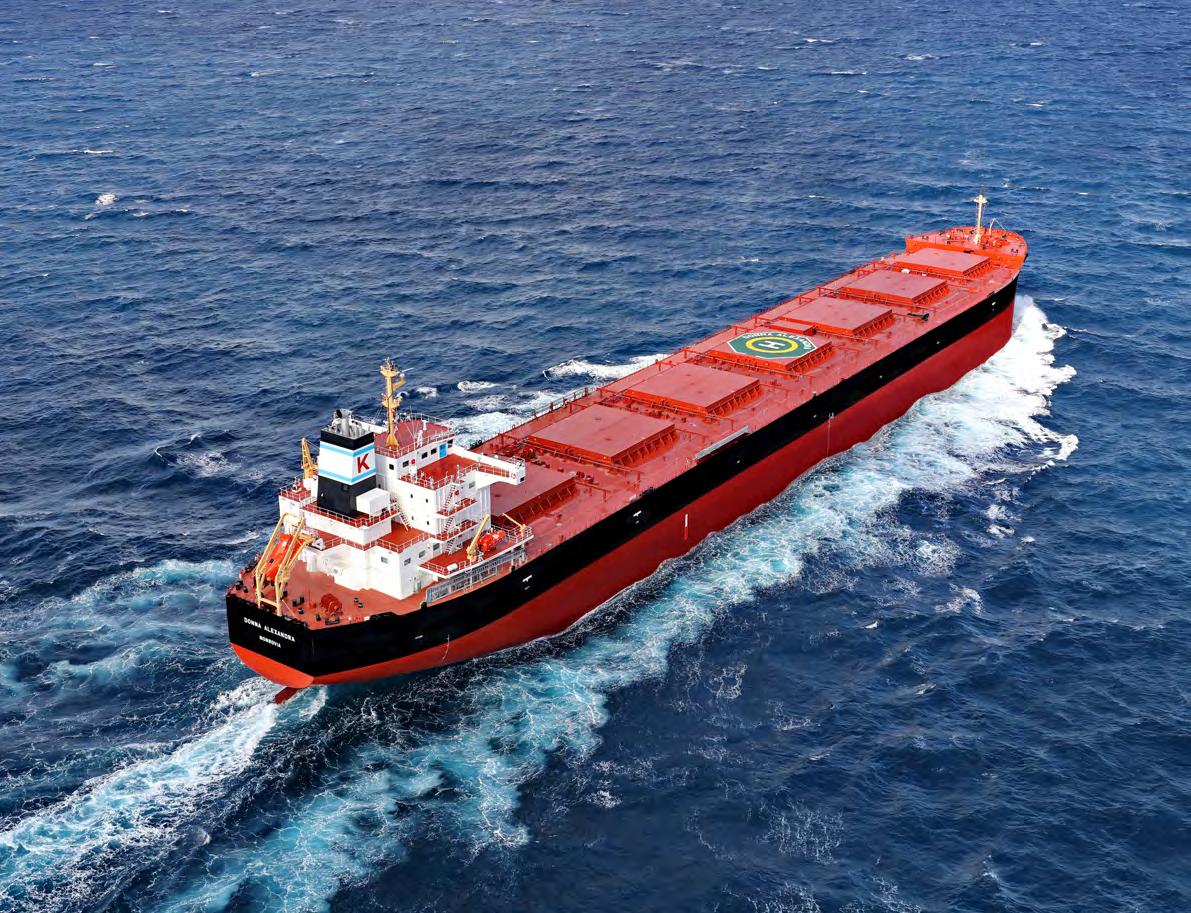
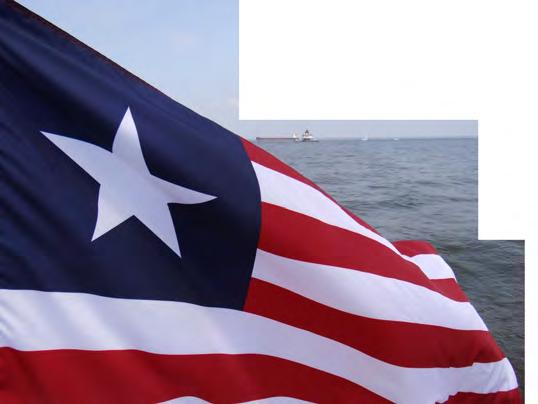
ΥΠΗΡΕΤΩΝΤΑΣ ΤΗΝ ΕΛΛΗΝΙΚΗ ΝΑΥΤΙΛΙΑ ΑΠΟ ΤΟ 1948 LISCR HELLAS S.A. ΕΥΠΛΟΙΑΣ 2, ΠΕΙΡΑΙΑΣ ΤΗΛ.: 210 4529670 - info@liscr.gr THE PREFERRED FLAG FOR GREEK SHIPOWNERS ΜΕ ΣΥΝΕΠΕΙΑ, ΥΠΕΥΘΥΝΟΤΗΤΑ, ΚΑΙ ΑΞΙΟΠΙΣΤΙΑ.
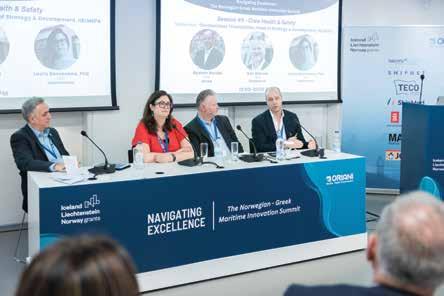
operations” - Cristian Skajem | Head of Communications, Teco 2030 presented the core technology of TECO 2030’s Hydrogen Fuel Cells and ongoing projects, plans and prospects of the company.
• “Quantifying Environmental Impact” - Tonje Sellevoll Imafidon | Commercial Director at Ecoxy AS presented the necessity for shipping companies to address their environmental impact, offering a solution to provide reliable emissions measurements data crucial for emissions reduction efforts.
• “FuelOpt Solution”- Richard Engelhart Bjercke | CCO at Manta Marine Technologies focused on FuelOpt, an on-board hardware solution to optimize fuel consumption based on vessel data from multiple sources, by fixing the speed and consumption settig and taking out continuous user changes.
The day concluded with Session #3 on “Big Data,” moderated by Dr. Ioannis Lagoudis, Associate Professor at UNIPI, exploring the transformative potential of big data in maritime operations. Panel topics:
• “Using Data to improve efficiency: Drydocking and beyond”John Wills | VP - Product Management at Shipnet, presented the untapped value of data in improving efficiency for the maritime industry and as an example, showed the audience the value of data management in optimizing their Dry-Docking procedure.
• “Simplify, Improve and Optimize your IT Solutions.” - Where Rolf Nøstdah | Sales Manager at The Ship AS, presented their solution for improved data registration and information access from various systems in a simpler and more streamlined way, with a focus on the difficult to track area of in-port operations.
• “How to build a solid digital strategy by leveraging your fleet’s data.”- Where Dionysis Asimakopoulos | Growth Manager at Kongsberg Digital, presented the crucial role of data collection in establishing a digital strategy for a shipping company, enabling enhanced safety, flexibility, and long-term viability.
One important element discussed during the event was that of collaboration, not only between vendors and clients but also among different vendors themselves. As John Vandoros, the General Manager of ORIANI, said regarding how digitalization with take-off in Greece; “The answer is through developing relations and getting people face to face to discuss the real issues of the end user...”. Meaning that, the most effective way to understand and resolve today’s complex maritime issues is by cultivating relationships and enabling a comprehensive understanding of the shipping companies’ requirements. As he also pointed out: “Frank
discussions and realistic promises by the software companies (to their clients) will build trust and allow time for them to deliver the right solution”. In other words, by fostering a culture of transparency and realistic expectations, software companies can build strong relationships with shipping companies. This will allow them the necessary time and space to develop and deliver solutions that are truly tailored to today’s market needs.
Session #4 on “Crew & Training” with moderator Katerina Skourtanioti, Managing Director at VENLYS, emphasizing the importance of human capital in maritime operations and its efficient training. Notable presentations included insights on:
• “Next Generation Safety Culture Program” - Didrik Svendsen | CEO, Sayfr presented how SAYFR has developed a state-of-the-art platform to cultivate behaviors - all based in science. He discussed the importance of data-driven interventions and how Value Propositions for the Culture Change Processes have changed dramatically over the last few decades.
• “Gamification Training for the Industry.” - Felix Gorbatsevich | CEO of PaleBlue explored the application of gaming engagement principles to workforce training and development, emphasizing the importance of enjoyable, interactive, and effective eLearning methods amongst a variety of digital training options, including Digital Interactive Training and Virtual Reality.
• “Data in action: optimized decision making in crewing” - Agapitos Diakogiannis | CEO & Co-founder of Seafair presented his solution and the value of digital approach to crew management, emphasizing how systems should serve humans and not the opposite.
And closing, Session #5 “Crew Health & Safety” with moderator Constantinos Triantafyllou, the Head of Strategy & Development at HELMEPA, outlined the importance of our seafarers’ safety and healthcare in efficient maritime operations.
• “Enhancing Maritime Safety with Dimeq Solutions” - Øystein Bondal | CEO of Dimeq presented his wearable sensor that connects to a smart platform with Man Overboard detection, location communication and a safety system that could lead to the transition to “smart vessels”.
• “Digital Management of ships medicine chest”- Geir Østrem | CEO of ShipMed AS, addressed the challenge of ensuring vessels always maintain adequate and compliant medical supplies and equipment onboard, regardless of flag, voyage, or crew size. ShipMed’s solution can proactively manage and document compliance, keeping vessels ahead of existing regulatory requirements.
• “Pioneering Maritime Healthcare with Data-Driven Innovation” - Laura Benzonana, PhD| CEO at Health4Crew, explained how shipping companies can take a proactive rather than a reactive approach to crew health and wellbeing, and how by choosing the right systems, you are able to access and analyze crew health data quickly in the event of a medical emergency.
As the experienced Capt. Dimitris Aslanoglou from Eletson Corporation wisely pointed out at the event’s closing remarks “…happier crews are safer crews...”.
To conclude, this gathering was not only about Norwegian companies showcasing maritime digital solutions. The summit provided Norwegian representatives the opportunity to gain firsthand knowledge of the intricacies of the Greek shipping industry. Likewise, Greek shipping executives had the chance to gain insights from Norwegian maritime solutions and operations through case studies and new technologies. An environment was created where both could engage in constructive dialogue and gain a deeper understanding of each other’s operational dynamics.

26 Conferences NAFS | MARCH 2024


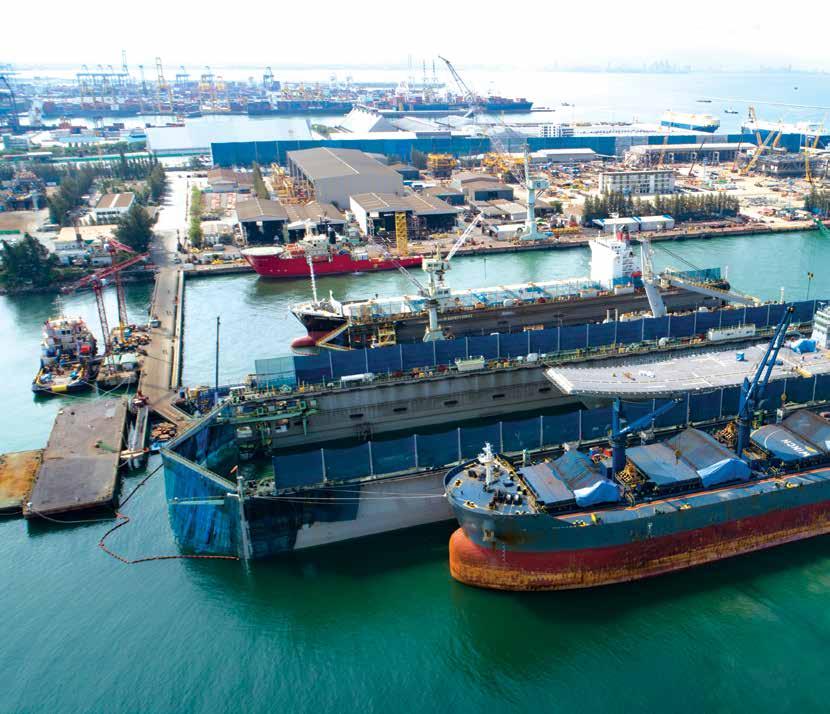
Highest level of quality to more than 100 vessels per year


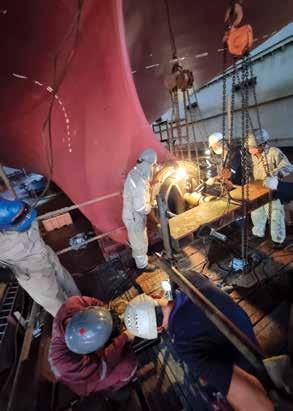
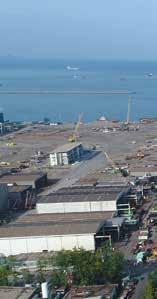
UNITHAI
28 Cover Story MARCH 2024
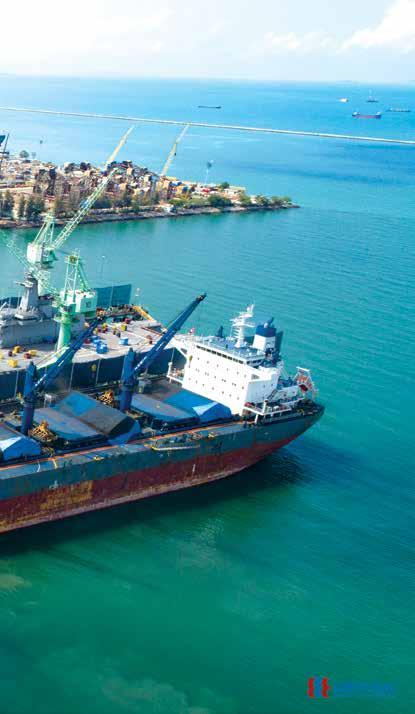
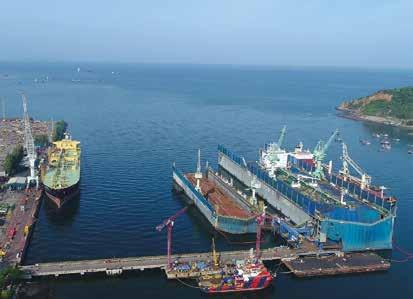
Unithai Shipyard and Engineering (UTSE) as the Thai arm of IMC Pan Asia Alliance was founded in 1990, strategically located within the deep-sea port of Laem Chabang, close to Bangkok, Ko Si Chang and Map Ta Phut port, which is at the heart of Thailand’s chemical and oil tankers, container, dry bulk, car and offshore trades. The success story of Unithai began with the docking of the first vessels in September 1993.
Its accomplished team is committed to the highest level of quality, with a capacity to repair more than a hundred vessels per year.
UTSE in Thailand and IMCZY in Zhoushan, China. They are both part of IMC Shipyard Services group and among the busiest and most successful shipyard in the area of operations.
The Values
UNITHAI can provide a complete range of ship repair services with excellent quality performances in mechanical and electrical repair work plus in-house facilities for BWMS retrofit, reconditioning services for main engine components, shaft alignment, ultrasonic cleaning tank, etc.
The Shipyard works closely in partnership with owners to determine their needs and to satisfy their requirements delivering on time at competitive cost. The yard grew and expanded over the years in capacity and capabilities to provide customers worldwide, a complete range of repair services for commercial and military vessels up to Aframax tanker and Panamax class.
UNITHAI provides supply chain solutions to support the region’s economic growth and rapid industrialization. With the rate of technological and social shifts that the shipyard is experiencing today, the world is metaphorically becoming a flat one. We are indeed living in a new world; a world where we need to look at opportunities differently; a world where we must operate our business differently. We are committed to conducting our business responsibly and doing the right thing in all aspects of our corporate function. This means adhering to the highest ethical standards, following their Code of Conduct, practicing good corporate governance, and operating with transparency, accountability, ethical behavior, and respect for human rights and stakeholder interests.
UNITHAI provides quality services that prioritize health, safety, security, and environmental protection to ensure that its operations do not negatively impact stakeholders. UNITHAI’s sense of corporate social responsibility is ingrained in its core values and culture, reflecting the long-term commitment to sustainability.
Unithai is in the right place at the right time for shipowners.
Competitive advantages
1.Proven track record with 2,700+ successful deliveries
2. Customer-Oriented mindset
3. On time delivery
4. Commitment to the wellbeing of key stakeholders, both internal and external
Greek shipowners are a major market
For more than three decades, UTSE has prided itself for establishing a client list which involves a great number of repeated ship repair contracts from major Greek shipowners.
Repeat business remains a major focus in UTSE’s strategy so the shipyard will continue delivering value and good quality ship repair to Greek customers.
Capabilities
UNITHAI Shipyards have the technical capabilities to repair and upgrade a wide array of vessels and type of services. Their track
29 Land area 688,000 m2 Unithai 2 191 x 34.4 m Upto 50,000 DWT Unithai 3 300 x 49.6 m Upto 180,000 DWT Quay 380 m, 1 x 45 t crane Floating Crane, 1 x 100 t


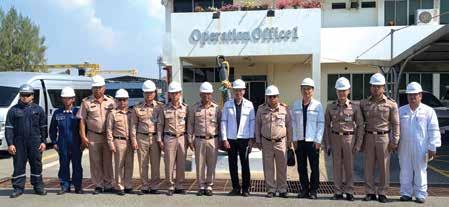
records are such as:
Bulk Carriers
UNITHAI
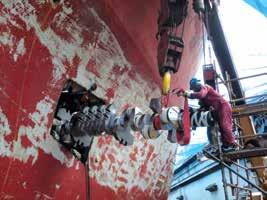
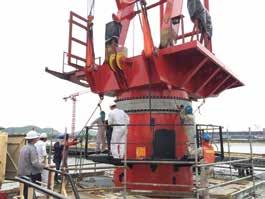
Unithai has built up a strong track record for the major repairs of bulk carriers, having successfully re-delivered projects for leading bulk carrier owners and operators.
Containers
As Laemchabang is the biggest container terminal in Thailand, (according to UNITHAI) therefore container vessels from valued customers regularly call at their shipyard for repair and maintenance works.
Oil Tankers
Tanker repairs and upgradings are a key sector of Unithai’s business. The company serve major tanker owners with the shipyard’s quality service, timely delivery and best HSE practices.
Gas Carriers
Since 2003, the company has track record in the repair and docking of more than 30 LPG vessels both refrigerated and pressurized type.
Machinery Services and Repairs
UNITHAI has a 3750 m2 multi-purpose mechanical / outfit shop houses a full range of boring machines, radial arm drills and lathes including a 12 m long tailshaft lathe. Chemical cleaning tanks up to 2m long. The workshop is equipped with 1 x 32 ton and 5 x 10 ton overhead cranes.
Paints & Coatings
Comprehensive facilities and trained workers for blasting and coating work both external hull and internal tanks including 2 x dehumidifiers and 2 x vacuum machines. As part of UNITHAI’s ESG goals, the company has also newly set up hydro blasting equipment and workforce training preparing for a green transition from grit blasting to hydroblast.
Afloat Repair
Unithai’s afloat repair team is dedicated to providing 24/7 ship repair services to ships in Thailand water areas. UNITHAI understands the importance of building relationships with our customers by providing prompt response and meeting your requirements.
The certified lists above show that UTSE has achieved the sustainability milestone since 2000. UNITHAI received ISO 9001:2015 Quality Management System certification in 2010. In addition, the company has international standards for waste management and environmental management, etc. with stakeholders around the company.
Also in 2023, continues to receive Green Industry System Level 3 certification from the government sector Green Industry Level 3 refers to a company with an environmental management system that involves follow-up, assessment, and revision aimed at continuous development, as well as receiving recognized awards on the environment and accreditations on a variety of topics.

30 Cover Story MARCH 2024
The Largest Shipyard in Thailand
The Largest Shipyard in Thailand
Unithai Shipyard and Engineering (UTSE) strategically located within the deep sea port Laem Chabang, closed to Bangkok, Ko Si Chang and Map Ta Phut port, which is at the heart of Thailand’s chemical and oil tankers, container, dry bulk, car and offshore trades. Our accomplished team are committed to the highest level of quality with a capacity to repair more than a hundred vessels per year.

Unithai Shipyard and Engineering (UTSE) strategically located within the deep sea port of Laem Chabang, closed to Bangkok, Ko Si Chang and Map Ta Phut port, which is at the heart of Thailand’s chemical and oil tankers, container, dry bulk, car and offshore trades. Our accomplished team are committed to the highest level of quality with a capacity to repair more than a hundred vessels per year.
Land area 688,000 m2
Unithai Shipyard and Engineering (UTSE) strategically located within the deep sea port of Laem Chabang, closed to Bangkok, Ko Si Chang and Map Ta Phut port, which is at the heart of Thailand’s chemical and oil tankers, container, dry bulk, car and offshore trades. Our accomplished team are committed to the highest level of quality with a capacity to repair more than a hundred vessels per year.
Unithai 2 191 x 34.4 m Upto 50,000 DWT
Unithai 3 300 x 49.6 m Upto 180,000 DWT

Quay 380 m, 1 x 45 t crane
Floating Crane, 1 x 100 t

Land area 688,000 m2
Land area 688,000 m2
Unithai 2 191 x 34.4 m Upto 50,000 DWT
Land area 688,000 m2
Unithai 2 191 x 34.4 m Upto 50,000 DWT
Unithai 3 300 x 49.6 m Upto 180,000 DWT
Unithai 3 300 x 49.6 m Upto 180,000 DWT
Unithai 2 191 x 34.4 m Upto 50,000 DWT
Quay 380 m, 1 x 45 t crane
Quay 380 m, 1 x 45 t crane
Floating Crane, 1 x 100 t
Floating Crane, 1 x 100 t
Unithai 3 300 x 49.6 m Upto 180,000 DWT
Quay 380 m, 1 x 45 t crane
Floating Crane, 1 x 100 t Moo 3 Tambon Tungsukhla, Sriracha District, Thailand
sbd.marketing@unithai.com Web : www.unithai.com
510 5559
Location: 48 Moo 3 Tambon Tungsukhla, Sriracha District, Chonburi 20230, Thailand
Email: sbd.marketing@unithai.com Web : www.unithai.com
Phone : +66 65 510 5559

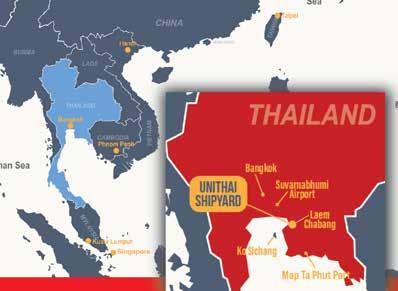
Location: 48 Moo 3 Tambon Tungsukhla, Sriracha District, Chonburi 20230, Thailand
Email: sbd.marketing@unithai.com Web : www.unithai.com
Phone : +66 65 510 5559
Challenges in Maritime Training Navigating Troubled Waters
Responses from Mikko Issakainen, Global Marine Academy Manager, ABB Marine & Ports

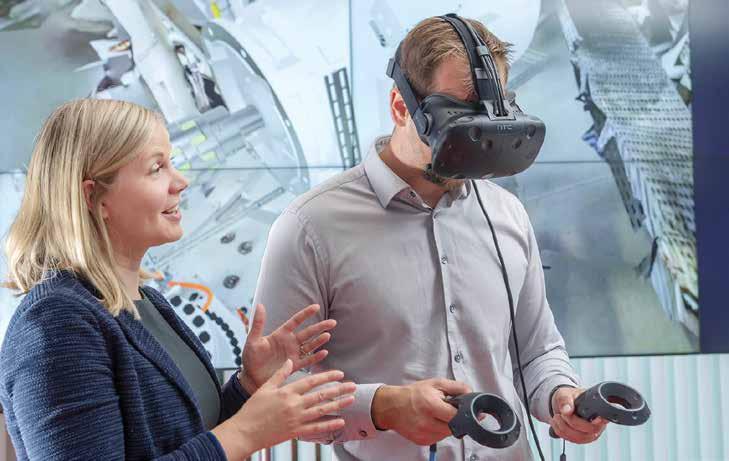
Focusing on technology:
Question: As automation and digitalization rapidly change the maritime industry, how are training institutions adapting to ensure graduates have the necessary skills to succeed in this evolving landscape?
Educational institutions must invest in the integration of new technologies into curricula, the participation of professionals and experts in training, continuity and retraining of education, cooperation with companies and the use of advanced teaching methods. As a marine technology supplier, ABB Marine & Ports collaborates with numerous educational institutions to make sure graduates have allthe necessary skills. Together with educational institutions, we develop new kinds of training and training methods that respond to the development challenges and opportunities brought about by automation and digitalization.
Focusing on economics:
Question: With funding for maritime training often limited, what innovative solutions can be implemented to ensure high-quality training remains accessible to future seafarers?

There are certainly many ways, but the remote learning opportunities available on the market have developed fast, which reduces travel costs and the carbon footprint of education and is more efficient in terms of time management. Digital training, improving efficiency, various partnerships and cooperation, grants and scholarships are methods that should be utilized more effectively.
Focusing on workforce:
Question: Given the demanding nature of maritime careers and the perception of limited career progression, what strategies can be employed to attract and retain young talent to the industry?
Several strategies can be used to attract and retain young talent in the maritime sector. The sector could offer young people the opportunity to receive quality training and mentoring from experienced professionals who are already working in the sector. Moreover, it should offer flexible working hours and opportunities to work shifts that suit young people’s life situations. While advancement in a marine career may be limited at certain
32 Training NAFS | MARCH 2024
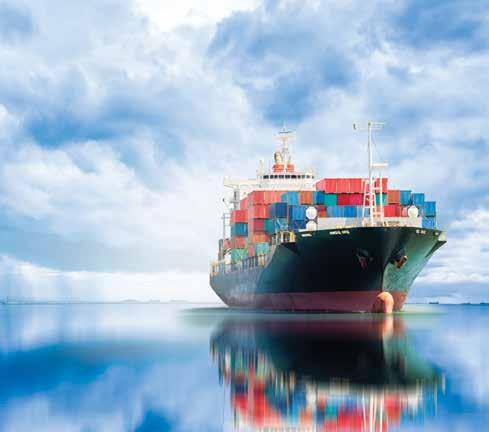







The maritime industry faces hurdles such as adapting to technological advancements, ensuring economic sustainability amidst environmental demands, attracting and retaining a skilled and diverse workforce, managing geopolitical and commercial complexities, and countering cyber threats as it embraces digitalization.

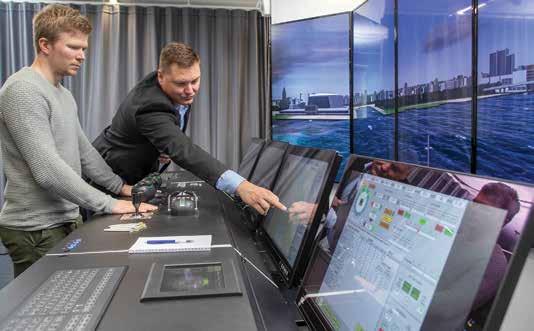
stages, offering clear career paths and incentives to earn higher positions or responsibilities over time is important, regardless of whether the person is working at sea or ashore. Companies and organizations can leverage new technologies and innovations in shipping and highlight to young people the opportunities they offer for the development of the sector, as well as communicate clearly about the opportunities and benefits and demonstrate the diversity and interesting aspects of the maritime professions. In addition, competitive pay and benefits such as healthcare, retirement plans and opportunities to work in different countries or regions play a role in making the maritime industry an attractive workplace.
Focusing on global impact:
Question: With varying maritime training standards across different countries, how can we create a more unified approach that ensures safety and competence across the global workforce?
Cooperation, coordination and commitment can create a more integrated approach that guarantees the safety and competence of the global workforce in the maritime sector, even if training standards vary from country to country.
Existing international agreements and standards, such as the International Convention on Standards of Training, Certification and Watchkeeping for Seafarers (STCW) issued by the International Maritime Organization (IMO), can be used to streamline competence levels globally.
Companies and organizations can also promote the mutual recognition of maritime training and certifications between countries, and develop international mechanisms for quality control and monitoring of training and qualifications. We can leverage technology such as online training programs and virtual simulators to facilitate access to maritime training and improve qualification assessment worldwide. Also promoting the involvement and commitment of stakeholders such as maritime companies, trade unions and educational institutions in developing and maintaining uniform standards and practices is important.
Focusing on diversity and inclusion:
Question: Traditionally dominated by men, what specific actions can be taken by maritime training institutions and industry stakeholders to promote greater diversity and inclusion within the workforce?

There are certainly many things that can be promoted to increase diversity. Training institutions and stakeholders can raise awareness of the opportunities in the maritime sector and encourage women to consider the sector as an option. Women should be offered equal access to maritime training. Creating a positive and equal atmosphere in maritime training institutions and workplaces makes all employees feel welcome and valued, regardless of gender. In addition, examples of successful female professionals should be highlighted in the maritime industry and introduced as role models for younger women.
Education and training institutions and stakeholders should promote a non-discriminatory recruitment process based on merit and ability, not gender, as well as offer more support and mentoring for women who are interested in or already working in the maritime sector.
Combining challenges:
Question: Balancing the need for technological advancement, economic sustainability, and a skilled and diverse workforce, what are the biggest hurdles the maritime industry needs to overcome to ensure its long-term success?
The shipping industry needs to adapt quickly to technological developments and automation, which can have impact on the need for manpower and tasks.
Continuous training, retraining and/or upskilling are needed to ensure that maritime professionals can take advantage of new technologies and adapt to changing work tasks. At the same time, the maritime sector must respond to increasing environmental demands and the fight against climate change. This may require investments in new, more environmentally-friendly technologies, energy sources and fuels, as well as new practices and regulations, which may pose challenges to economic sustainability.
Like other sectors, the maritime sector faces challenges in attracting and retaining a skilled and diverse workforce. Action is needed to promote diversity in order to attract more wide-ranging and skilled workers to the sector. The maritime sector often operates in a complex geopolitical and commercial environment. Flexible strategies and business models are needed that can adapt to changing circumstances and manage risks effectively.
In today’s world, more attention needs to be paid to countering cyber threats and security issues as the sector moves towards more digital and connected ways of working. Strong security practices and continuous preparedness are needed.
NAFS | MARCH 2024
34 Training



Ioannis Armenakis
ABS Academy Manager, ABS Athens
New approaches to training in a net zero shipping industry
The shipping industry is undergoing a transformation towards achieving net zero carbon emissions, requiring the integration of new fuels, technology, and data. Safety is paramount in this transition, driving innovation and necessitating comprehensive training for seafarers.
MetaSHIPs, advanced simulation technology, offer immersive training experiences, adaptable to various platforms and skill levels. As the industry evolves, seafarers need to develop new skills in technology literacy and safety mindset. Augmented and virtual reality technologies play a crucial role in enhancing training effectiveness and decision-making, facilitating collaboration between shore teams and mariners.


A new era for maritime operations requires a focus on safety and the use of technology to train a new generation of seafarers, writes Ioannis Armenakis, ABS Academy Manager, ABS Athens
The shipping industry is on a course towards a multi-dimensional world; where new fuels, technology and data must unite to create hybrid solutions required to achieve targets for net zero carbon emissions.
The transition to new fuels and technologies must be undertaken with safety as a central condition. This means ensuring that alternative fuels and propulsion systems are inherently safe, that safety protocols are adapted accordingly, and that seafarers are adequately trained to handle these advances.
Safety is not an impediment; rather, it serves as a catalyst for innovation. The pursuit of safer operations often leads to the development of new technologies and processes, which can contribute to decarbonization goals. For instance, advances in energy efficiency and vessel optimization can reduce emissions and enhance safety by minimizing the risk of accidents.
The future of safe and decarbonized shipping lies in a holistic, multidimensional approach to training and skills. Rather than rely on implicit assumptions and prescriptive rules, the industry must adopt

a more explicit and systems-oriented approach to safety.
The result will be a shift toward goal-based approaches over prescriptive measures, a change amplified by real-time data enabled by sensors. This future will be more people-driven, emphasizing collaboration and shared responsibility.
Training for a net zero industry
The process of decarbonization creates safety issues that need to be addressed. One of the most important safety issues is the familiarization of the crew with new and emerging fuels and technology. For example, the industry has well-established experience in handling ammonia as cargo, but not as fuel, so there is a need for training, education and guidance that enables this to be done safely. ABS has begun to address this challenge through the utilization of simulation technology, which we developed in our global centre in Singapore. Simulation technologies are helping to create scenarios and conditions that mirror the realities of the onboard ship experience. This allows us to offer exceptional training experiences, using
exclusive 36
NAFS | MARCH 2024
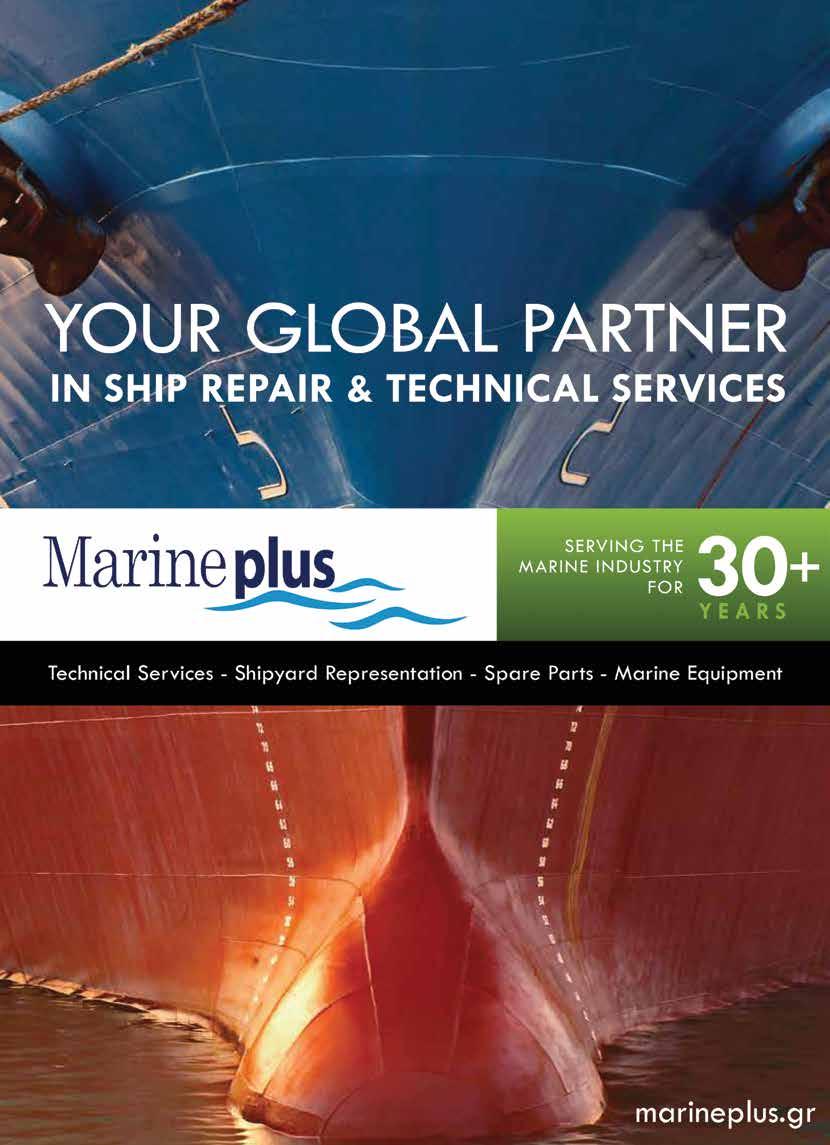

multiple simulations to replicate real-world onboard conditions.
ABS MetaSHIPs powered by Orka are one-of-a-kind highly realistic virtual assets. Built to scale from vessel drawings, they take users on virtual field trips - providing a powerful, immersive learning experience in a simulated training environment. Before boarding an ABS MetaSHIP, users will select their vessel and survey type.
Users may also select the vessel age to represent vessel conditions more accurately, such as the level of corrosion of a vessel. Once onboard, virtual users put their theoretical and practical training to the test. The MetaSHIP experience is highly engaging, so users interact with the vessel throughout the training –inspecting equipment, taking photographs, viewing certificates, documenting survey notes, and much more.
MetaSHIPs makes it possible for seafarers to spend several hours on the deck plate of a vessel before even so much as setting foot on the gangway.
The flexibility of MetaSHIP extends beyond its immersive experience, allowing its integration into different training environments. Whether in a classroom setting equipped with LED volumes for a shared immersive learning experience, above-average laptops for personal training sessions, or on personal PCs, MetaSHIP ensures accessibility for seafarers at various levels.
The adaptability of MetaSHIP goes even further, seamlessly integrating with virtual reality (VR), augmented reality (AR), and mixed reality (MR) platforms. This means that users can choose the version that best suits their training requirements, whether it’s a fully immersive VR experience, an interactive AR session, or a collaborative MR environment. This versatility enables a tailored approach to training, accommodating different skill levels and learning preferences.
The need for new skillsets
When we think of the new skills and competencies required for safety onboard the next generation of vessels, it is clear that tomorrow’s seafarer is going to have to be more technology-savvy than in previous years.
Quite apart from the array of challenges associated with handling and bunkering the new fuels, they will need literacy in the emerging digital and autonomous ecosystems as well as an entirely new safety mindset, which understands cyber threats, in addition to traditional physical dangers.
The industry will need to invest in training and development to ensure that these skills are effectively developed. This requires a coordinated approach, involving industry, regulators, and training providers, to ensure that seafarers are adequately prepared for the challenges ahead.
ABS is playing its part, pioneering new immersive learning techniques for the benefit of our employees and our clients. Today that means including virtual and augmented reality in our programs. Simulated environments using Augmented Reality (AR) and Virtual Reality (VR) equipment make it possible for users to immerse themselves in whatever world we design for them, such as walking around and interacting with a ship.
New technologies for training
AR enhances real world environments, overlaying digital information such as schematics or navigational information onto physical
objects. To achieve this, cameras, accelerometers, gyroscopes, and depth sensors continuously monitor the environment to answer questions about position, environment and risk.
The data collection and processing happen near-simultaneously as a digital overlay is projected to the user. Augmented reality headsets provide constant real-time information to crewmembers freeing them from computer screens and mobile devices.
VR, on the other hand, immerses users completely into a virtual world. Computer games in VR are common today. This is ideal to provide a scalable, low-cost solution simulating environments for training purposes. The ABS MetaSHIP environment and its ability to be reconfigured digitally makes it a great training tool.
Today, advances in spatial information capture with tools like 3D scanning or 360-degree cameras enhance the more traditional Computer-Aided Design or gaming object libraries to build even more realistic VR experiences. This allows for more realistic training scenarios than navigating 3D models, though perhaps with less ability to customize them.
VR and AR are well-developed technologies, but they have room to grow. They both can be used with wearables like head-mounted displays or standard hand-held devices like tablets, laptops, or smartphones.
AR, VR and mixed reality (MR) can enhance decision-making by allowing users to interact with and relate to an asset they are viewing. These technologies have the potential to help reduce cognitive load by providing users with visuals that support understanding and provide context.
This type of technology can be used both on and off the asset or vessel in a collaborative fashion, giving shore teams and mariners in training the ability to communicate and collaborate in ways that were previously impossible.


exclusive 38 NAFS | MARCH 2024
Photo: Pixabay

Dr. John Kokarakis
Technical Director, Bureau Veritas
Adapting Training in the Maritime Industry for Automation and Digitalization
This article explores the profound impact of automation and digitalization on the maritime industry and the corresponding challenges faced by training institutions in preparing graduates for this evolving landscape. It emphasizes the need for incorporating dedicated courses on automation principles, data analysis, and digital systems operation, while also highlighting the importance of soft skills development. It discusses the balance between automation and human skills, the importance of cybersecurity training, and the integration of advanced technologies like virtual reality (VR) into training curricula. It also suggests strategies for collaboration with industry stakeholders, continuous learning opportunities, and the development of adaptable skill sets to navigate the complexities of the digitalized maritime world.


As automation and digitalization rapidly change the maritime industry, how are training institutions adapting to ensure graduates have the necessary skills to succeed in this evolving landscape?
The impact of automation and digitalization is profound in the ever-evolving maritime industry. Training institutions must adapt to equip graduates with the essential skills to thrive in this dynamic landscape. Training institutions in the marine industry are facing a crucial challenge: preparing graduates for a future heavily influenced by automation and digitalization. They must introduce dedicated courses on automation principles, data analysis, and the operation of digital systems like navigation software and bridge automation technologies. Institutions must incorporate practical training in maritime software, data analytics, communication technologies, and emerging technologies such as Artificial Intelligence (AI) and the Internet of Things (IoT).
This knowledge ensures that students are familiar with the latest tools and technologies used in the industry. Graduates must be digitally literate and comfortable using technology tools and platforms. They also must emphasize improving the soft skills of the trainees, like critical thinking, problem-solving, decision-making, and com-

munication skills. It is well understood that automation will amplify the human role in managing complex situations. Automation can offer efficiency, but its overuse threatens jobs and potentially erodes seafarer skills essential for safe operations; it must be applied in areas where it enhances safety and efficiency without completely replacing human skills and judgment. Technological solutions complement and support human decision-making abilities but do not entirely replace them. The maritime industry must work alongside governments and environmental organizations to find solutions that benefit both the environment and economic viability. Industry must welcome change and innovation while focusing on the crucial role of well-trained and valued mariners.
In the decarbonization pathway, awareness of environmental regulations and sustainable practices is necessary, as well as understanding the importance of eco-friendly operations and compliance. Shifting to new fuels and technologies requires crew training and adaptation to ensure safe operation. More advanced training can
exclusive 40
NAFS | MARCH 2024
www.navios-mlp.com
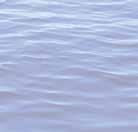



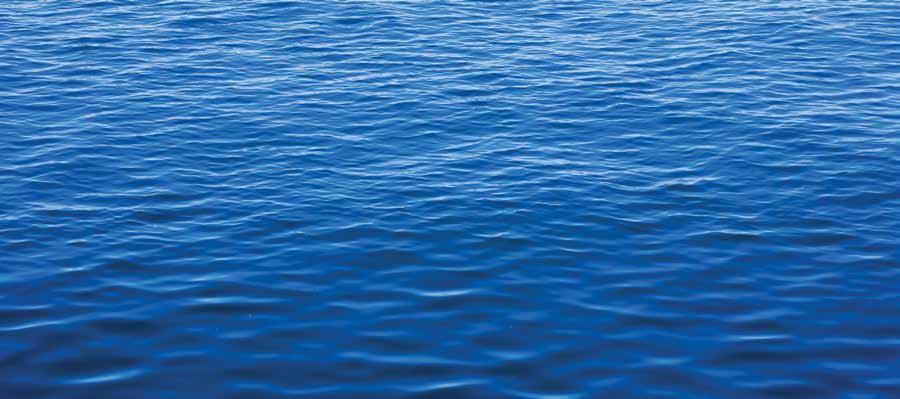 An International Owner and Operator of Dry Cargo and Tanker Vessels
An International Owner and Operator of Dry Cargo and Tanker Vessels

also cover data-driven decision-making, providing graduates with an understanding of how to analyze sensor data, predict equipment failures, or optimize maintenance schedules. Integrating complex technologies necessitates robust training and clear protocols to mitigate potential safety risks associated with automation failures. Digitalization can improve efficiency and optimize routes, potentially reducing fuel consumption and emissions.
With the integration of automation and digitalization comes new challenges related to safety and cybersecurity. Cybersecurity awareness and training must also be incorporated into the curriculum to equip graduates with the knowledge to identify and mitigate cyber threats in the increasingly digitalized shipboard operations. Inevitably, digitalization increases vulnerability to cyber threats. Thus, education about cybersecurity is a necessary element of the curriculum. That way, graduates learn to safeguard critical systems, protect data, and respond to cyber incidents.
Maritime academies must upgrade their simulators to incorporate critical scenarios involving automated systems, malfunction simulations, and cyberattacks, enabling seafarers to practice safe operations and decision-making in future technologically complex environments, replicating real-world scenarios. Virtual reality (VR) systems also must be integrated into the training curricula. The trainees can practice navigation, cargo handling, and emergency procedures in a safe and controlled environment. VR simulations enhance decision-making skills and crisis management. Utilization of VR simulations provides realistic training experiences for emergency procedures, navigation, and shipboard operations. While an initial investment, VR can offer cost-effective and repetitive training compared to traditional methods. Furthermore, trainees must be exposed to exercises that combine automation principles, soft skills application, and technical problem-solving within a virtual environment.
The Maritime Industry can contribute to enhancing training by establishing Advisory Boards with industry representatives to ensure training programs are aligned with current and future technology trends in the maritime sector. Academies should also partner with shipping companies to provide internship opportunities on vessels implementing advanced technologies, allowing graduates to gain practical experience. Forging partnerships with maritime companies and technology providers ensures their programs align with industry needs. A continuous learning culture must be cultivated through guest lectures and joint research projects. Recognizing that learning is a lifelong journey in a rapidly evolving industry, training institutions offer continuing education programs and professional development courses for maritime professionals. These programs allow graduates to stay updated on the latest advancements and further hone their career skills. Maritime academies collaborating closely with shipping companies, port operators, and technology providers expose students to real-world challenges and innovations.
A system of modular training programs will allow graduates to continuously upskill throughout their careers, adapting to emerging technologies and software updates. Online training resources and
platforms for alums to access new courses, webinars, and industry updates will foster a culture of lifelong learning. More specifically, interactive online modules covering core maritime training topics must be developed, enabling broader reach and self-paced learning and reducing the need for in-person instructor time. Short courses and workshops help the trainees to acquire new skills throughout their careers. Institutions must generate a repository of openly accessible online training materials and learning resources, reducing duplication of efforts and allowing institutions to leverage existing materials. Combine online modules with targeted in-person sessions led by qualified instructors, maximizing the benefits of both approaches while keeping in-person costs in check. Experienced seafarers can mentor and train junior crew onboard, fostering knowledge transfer and reducing reliance on solely professional instructors. It is also important to offer opportunities for seafarers to gain experience in different areas, like port operations or shore-based roles, to diversify their skill sets and increase career options.
Given the multifaceted nature of the future maritime world and its continuous technical progress, emphasis should also be devoted to adaptability, analytical thinking, and a willingness to learn to continuously thrive in a rapidly changing environment. This must be accomplished without undervaluing the necessary technical skills. Beyond technical skills, graduates must develop soft skills like adaptability, teamwork, and communication. These skills are essential for navigating the complexities of an evolving industry where collaboration between humans and automation is crucial. The challenge is to learn to navigate changing work environments and embrace lifelong learning. Training programs aim to cultivate strong leadership and teamwork skills to ensure effective communication and collaboration between humans and automated systems. Collaboration on funding research initiatives and incentivizing the implementation of modern technologies can reduce the financial strain on individual companies.
By adopting these strategies, training institutions can equip graduates with the necessary skill set to navigate the evolving maritime landscape. They must also encourage graduates to stay updated. The focus will be on a balanced approach, combining essential technical knowledge with the adaptability and analytical skills needed to operate alongside automation and emerging technologies safely and efficiently. The maritime industry faces a multifaceted challenge in balancing technological advancement, economic sustainability, and the needs of a diverse workforce. Gradual, modular technology implementation can help companies spread costs and reduce risks associated with full-scale overhauls. Maritime technological advancements require specialized skill sets, but the current workforce may lack the expertise to manage and fully utilize these systems. Investing in comprehensive upskilling for existing employees will develop the workforce needed for technological advancements.
Training institutions must proactively adjust their curricula, leveraging technology to prepare graduates for success in the digitalized maritime industry. By staying abreast of industry trends and collaborating closely with stakeholders, they ensure their graduates remain competitive and capable of driving innovation in the marine sector
exclusive 42 NAFS | MARCH 2024
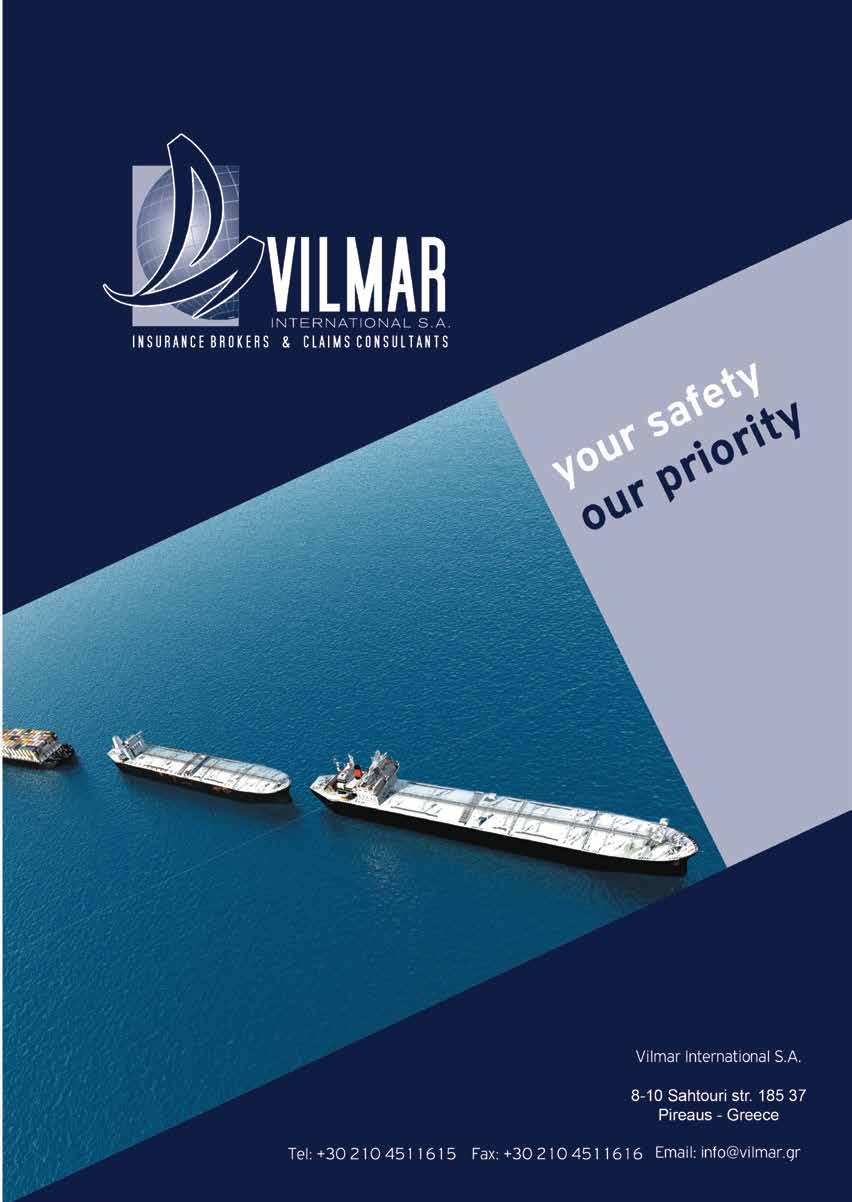
44 Training NAFS
Balancing the need for technological advancement, economic sustainability, and a skilled and diverse workforce, what are the biggest hurdles the maritime industry needs to overcome to ensure its long-term success?

Cosmos Nautical Training Centre & CMA D. ARGOUDELIS & CO S.A., listen attentively the market needs for continuous education.
Following this trend, CMA provides high level seminars to COSMOS, by experienced instructors, in order to meet the new standards of the maritime industry and enhance their capabilities and skills in the field.

Responses from Nikolaos Argoudelis, Owner/Technical Director (left) & Ioannis Argoudelis, Owner/CEO (right) exclusive
T
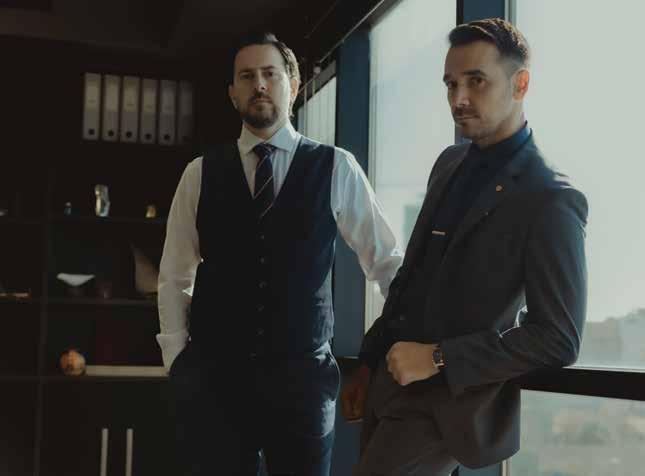

he maritime industry faces several significant challenges in balancing technological advancement, economic sustainability, and fostering a skilled and diverse workforce.
For CMA D. ARGOUDELIS & CO S.A., a marine, industry, and energy automation company, addressing these hurdles is crucial for long-term success.
In the dynamic landscape of the shipping industry, there is a pressing need for modernization to enhance efficiency, safety, and sustainability. Many vessels still operate with outdated technology and antiquated systems that not only hinder performance but also pose risks to both crew and the environment. Upgrading ship systems involves transitioning to advanced navigation and communication technologies, integrating state-of-the-art propulsion systems, and implementing automated cargo handling processes. These upgrades not only streamline operations but also contribute to reducing fuel consumption and emissions, aligning with the industry’s growing emphasis on environmental responsibility. Embracing innovation in ship systems is crucial for the shipping industry to navigate the challenges of the 21st century and ensure a more sustainable and technologically advanced future.
Compliance with increasingly stringent environmental regulations poses a financial challenge. Investing in eco-friendly technol-
ogies and sustainable practices may require significant capital expenditure. Economic fluctuations and geopolitical tensions can impact shipping demand, affecting the industry’s financial stability. Developing resilient business models and risk management strategies is essential.
The industry faces a shortage of skilled personnel, particularly in areas related to automation, data analytics, and digital technology. Providing training programs and partnering with educational institutions, such as our partnerships with Cosmos Nautical Training Center & BCA College, can help bridge this gap. The maritime workforce has traditionally been male-dominated. Promoting diversity and inclusion initiatives can enhance creativity, productivity, and bring a variety of perspectives to problem-solving. By navigating these hurdles, CMA D. ARGOUDELIS & CO S.A. and the broader maritime industry can position themselves for long-term success in a rapidly evolving global landscape Cosmos Nautical Training Centre & CMA D. ARGOUDELIS & CO S.A., listen attentively the market needs for continuous education. Following this trend, CMA provides high level seminars to COSMOS, by experienced instructors, in order to meet the new standards of the maritime industry and enhance their capabilities and skills in the field.

| MARCH 2024
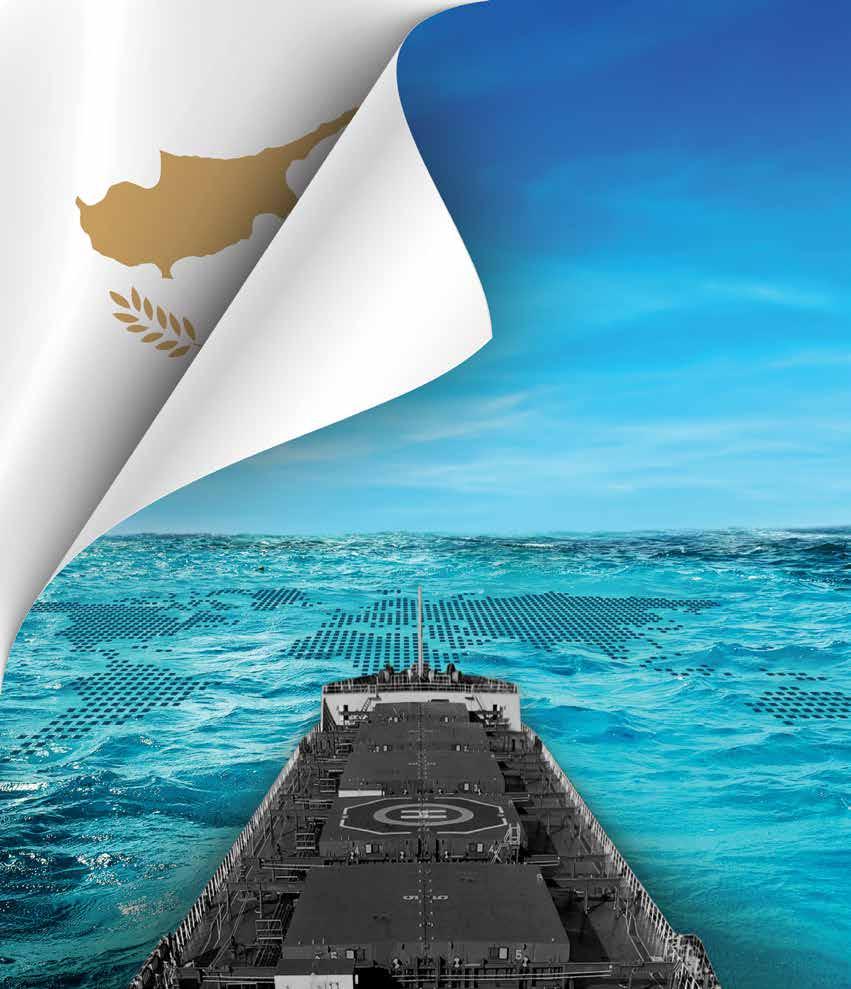
Dr Marina Papaioannou
Regional Maritime Academies Manager DNV


Reskilling and Upskilling
A trend or the new normality?

“Hopefully, we will have some clear directions in the near future that will allow for planning upskilling and reskilling of seafarers in the right direction which will also lead to the carrier advancement and development opportunities of people both onboard and ashore”.
Will the seafarer of the future be anything like the one of the present? That seems to be the question in everyone’s mind and concerns most if not all the seafarers themselves. But was that not always the case? Try to visualize the seafarer of the 1960s or 1970s; does he look like the seafarers of 2000’s much more of today’s?
Of course, developments are a lot faster during our times than what they used to be in the past, and naturally this affects all aspects of our work together with our human resources. Thinks have changed rapidly over the last couple of decades, and it will change even more so in the coming years. This should not be perceived as a lethal barrier but rather as a creative challenge.
The people who will be joining our vessels in the next 1 or 2 decades will be Generations Z and Alpha (born after 1997). These generation and in particular Generation Alpha, will be people born and raised entirely in the 3rd millennium, will have experienced the effects of COVID19 pandemic as children, would have access to everything dominated by electronic technology, social networks, and streaming services. They way they will have acquired knowledge will be completely different than ours, schooling days will be different, socializing will be different. Therefore, they will be the perfect group for implementing new technologies, working with smart digitalized systems, robots, autonomous devices and AI. All these things that may look like coming from a fiction movie today will be completely normal for them. But again, wasn’t this always the case at some degree?
The main issue is how fast will things change and how fast we need to adapt to the new reality. There will certainly be a change
of skills and competences that will have to be achieved shortly and the discussion is already on the table - with the update of the STCW discussed currently at the IMO - as to what will be these new skills and competencies that seafarers will need to possess to cope with the challenges of digitalization and decarbonization to come.
According to DNV’s study on the “Future of seafarers 2030” co-funded by SMF (Singapore Maritime Foundation) upskilling needs of seafarers in the areas of decarbonization and digitalization, eighty-one percent of seafarers surveyed (over 500 in total) indicated that they require either partial or complete training to effectively work with the advanced technology that will be present onboard future ships. Similarly, over 75 percent of the respondent expressed a requirement for partial or complete training on new fuel types such as liquefied natural gas (LNG), batteries or synthetic fuels. This training deficit rose to 87 percent of survey respondents for emerging fuels such as ammonia, hydrogen and methanol. Shipowners and operators are increasingly deploying modern technologies onboard and exploring the use of alternative fuels to stay compliant. Handling these fuels and technologies will require the crew to have additional skill sets and thus the need for comprehensive training. At the same time, growing automation of components and systems onboard is expected to bring about a rise in autonomous and smart ships, thus the need to consider remote shore monitoring in the future.
Hopefully, we will have some clear directions in the near future that will allow for planning upskilling and reskilling of seafarers in the right direction which will also lead to the carrier advancement and development opportunities of people both onboard and ashore.

46 Training NAFS | MARCH 2024
exclusive

Posidonia brings the maritime world together. Gathering in Greece to speak the common language of shipping.
At DNV we want to make sure you always have global expertise and a trusted local partner at your side. We understand your needs and through our experts around the world, we help you solve your challenges.
www.dnv.com/posidonia
speak your language!
us at
stand 4.115 to meet Leonidas Karystios, Global Fleet Technology Director, Gas Carriers, and George Teriakidis, Area Manager and experts from across our global network.
We
Join
Posidonia,
Natassa Kouvertari
Programme Manager at Lloyd’s Register Maritime Decarbonisation Hub
Meeting the Training Needs for New Fuel Technologies in Maritime Operations
As the maritime industry transitions towards alternative fuels like ammonia, methanol, hydrogen, and LNG, there’s a pressing need to enhance crew training and competence. This includes developing new technical skills, updating regulatory frameworks, and integrating automation to minimize risks associated with these fuels. Key areas for improvement include bunkering operations, maintenance, safety protocols, and leadership skills. Initiatives like Lloyd’s Register Maritime Decarbonisation Hub and the Maersk Mc-Kinney-Møller Center for Zero Carbon Shipping are leading efforts to assess risks and develop comprehensive training programs. The goal is to ensure seafarers are well-prepared for the challenges of the industry’s green transition.


exclusive
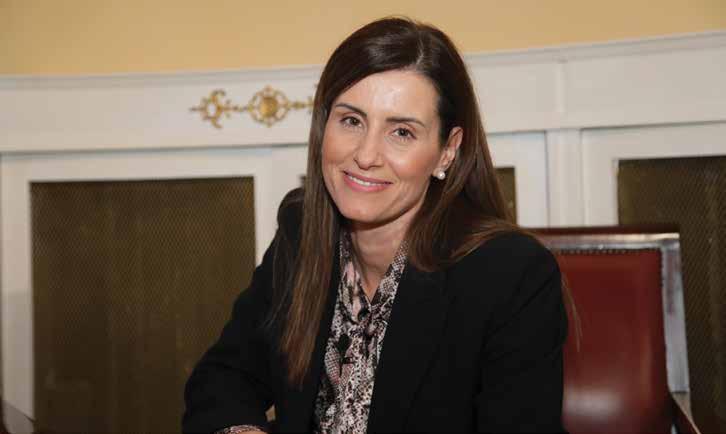
What is the current state of crew training that you see in the industry regarding crew training for handling ammonia, methanol, hydrogen, and LNG?
Different parts of the industry are at varying stages with regards to crew competences and new fuels. The regulatory framework for using methanol, hydrogen and ammonia as marine fuels, the standards defining their properties, the acceptable thresholds for their use onboard and the competencies to safely handle them in day-to-day operations are all at different stages of development. Decarbonisation also goes hand in glove with digitalisation. In this area alone, the amount of training and upskilling required across the industry to ensure that seafarers have the relevant new competencies and training is highly significant. This decade will be the defining age of technology as new technologies and projects appear in the horizon. New fuels and technologies will present significant challenges, and for some companies an overall shift in safety culture will be required to ensure a safe transition.
IMO Standards for Training and Watchkeeping (STCW) detail the current knowledge, skills and competency requirements for seafarers on vessels operating with conventional fuels. It also outlines further requirements for specific ship types, like tankers, as well

as for ships using low flashpoint fuels, like LNG / LPG (see IGF Code). Additionally, the marine industry has developed competency guidelines (e.g., SGMF and SIGTTO) for low flashpoint gases and already has experience with carrying and handling some of the new fuels, such as ammonia, as cargo.
The LNG shipping industry has already built a robust safety culture within its fleet. This level of best practice will be required across all segments, including the bulker and container industries. A topdown approach, involving everyone in the business starting at the C-suite and cascading down to all employees at sea and onshore is necessary for a culture change programme to be effective.
What can be done to improve the level of crew knowledge regarding the topic as the orders for engines, retrofits, and newbuilds which run on such fuels are more and more prevalent in the shipping sector?
Further competencies will need to be established to address the unique characteristics of new fuels, notably ammonia, methanol and hydrogen. Crew training will be essential in order to equip them with the new technical skills required to manage the support systems, equipment and components for these new fuels. Increased automation is also anticipated to minimise crew contact
48 Training NAFS | MARCH 2024
INTERVIEW
FUEL FOR THOUGHT Ammonia

Exper t insights into the future of alternative fuel s

with certain toxic substances that accompany the use of alternative fuels and should also be factored into crew training programmes. As a minimum, regulators and industry stakeholders will need to conduct a gap analysis to determine the current knowledge and skills level, compare them with the anticipated skills required and determine any essential upskilling. Moreover, regulators should work with industry and manufacturers to identify the new or unique knowledge requirements that will emerge as technology evolves. The levels of training will vary depending on the systems and equipment. Often this will simply require familiarisation with the manufacturer’s training/ orientation information package, but in other scenarios, as we have seen with the use and handling of LNG, STCW will need to be updated to formalise new competency and training requirements. Existing knowledge related to dual-fuel engines, running on fuels such as LNG/LPG, and the carriage of proposed alternative fuels as cargo will make the task of projecting new requirements for alternative fuels less onerous.
Areas that will most likely be required to be updated or new competencies and training modules created include:
- Bunkering operations and SIMOPS
- Maintenance to accommodate material requirements
- Occupational health and safety
- Process safety management
- Data analytics
- Automation
- Risk assessments
- Updated technical knowledge and non-technical skills related to decision making, communication, supervision and leadership, especially for potentially high-risk operations including emergency response.
The integration of alternative fuel systems on existing ships and the skills to be deployed for the retrofit projects should also not go unnoticed. Areas of intervention for upskilling are mentioned below:
▪ Naval architecture: The design and location of system elements including tanks, fuel preparation rooms and piping are expected to need careful consideration to comply with safety requirements, particularly for venting and hazardous zones. Assessing the impact of each part on the vessel’s structural strength and stability will also be critical.
▪ Electrical engineering: Enhanced monitoring (leak and fire detec-

tion), automated mitigation systems (including purging, firefighting, venting and ventilation)
▪ Fuel handling: Especially during the commissioning and testing stages of the retrofit projects, yards will need to have the capability to perform fuel conversions. This capacity is limited at the moment given the limited exposure of yards to existing alternative fuelled ships in operation.
Tangible steps demonstrating commitment to crew training and competency development
In enhancing preparedness in the deployment of ammonia as a marine fuel, Lloyd’s Register Maritime Decarbonisation Hub and the Maersk Mc-Kinney-Møller Center for Zero Carbon Shipping (MMMCZS) completed a multi-disciplinary programme to assess the design challenges and identify the risks to seafaring personnel.
Some of the key risk areas that emerged as part of this research were the following:
- Technical and non-technical skills, knowledge, understanding, and application
- Documented processes and work practices
- Occupational Health Hazards
- Process Safety Hazards
- Ergonomics Design and the human-machine interface and
- Management of change
Within a broader context, placing seafarers at the heart of shipping’s energy transition has been flagged by the Maritime Just Transition Task Force, an effort that is collaboratively led by the UNGC, the IMO, the ILO, ICS and ITF, which has now progressed to phase 2. Research commissioned by the Maritime Just Transition Task Force in 2023 identified that 800,000 seafarers may require additional training by the mid-2030s to operate vessels run on zero or near zero emission fuels. This training is vital to ensure a successful and just green transition. The training framework, funded through the International Maritime Organization (IMO) and Lloyd’s Register Foundation, will equip seafarers with skills in decarbonization, and provide guidance for trainers and the industry.
Embracing seafarers’ capacity and confidence to safely perform their duties in a fast-evolving industry is high on the agenda of all stakeholders in the maritime ecosystem with the first check point in sight at the end of the decade.
50 Training NAFS | MARCH 2024
Photo: Pixabay

Panos Kirnidis
HCG, BEng, MSc, Honorary Consul General of the Republic of Palau to Greece, Chief Executive Officer at Palau International Ship Registry
Transforming Maritime Training for the Digital Era
The interview delves into the evolving landscape of maritime training amidst automation and digitalization. It explores how training institutions are adapting to equip graduates with necessary skills, especially in developing countries. The discussion includes innovative solutions for accessible training despite financial constraints, strategies to attract and retain young talent, achieving unified training standards globally, promoting diversity, and overcoming hurdles for long-term industry success. Panos Kirnidis CEO of Palau International Ship Registry (PISR) emphasizes the critical role of technology and education in preparing seafarers for the challenges of the digital era.

exclusive
As automation and digitalization rapidly change the maritime industry, how are training institutions adapting to ensure graduates have the necessary skills to succeed in this evolving landscape?
Training institutions are undergoing a transformative journey in response to the dynamic shifts brought about by automation and digitalization in the maritime industry. The focus has shifted towards a two-tiered training approach to compliance and competency. Firstly, adherence to the STCW Convention is emphasized, aligning with a level of education equivalent to a bachelor or applied higher education. Secondly, there is greater importance on softer and the skills needed for the new technology and fuels, which are increasingly being undertaken through digital and simulation training. To captain a ship today, they need a blend of seafaring experience and soft skills in addition to their mandatory training requirements. This means they need a level of


52 Training NAFS | MARCH 2024
INTERVIEW

HEAD OFFICE EUROPE I GREECE I 5 SACHTOURI STR, PIRAEUS - Tel: + 30 210 4293500 REGIONAL OFFICES USA I TEXAS I THE WOODLANDS I 9595 SIX PINES DRIVE - Tel: + 1 832 631 6061 CYPRUS I LIMASSOL I ZENAS KANTHER 2B I - Tel: +357 25 747638 UK I LONDON I NEW BROAD STREET I NEW BROAD STREET HOUSE - Tel: +44 (0) 207 417 1701 Palau InternatIonal ShIP regIStry info@palaureg.com l www.palaureg.com The
Registry
World’s Leading Digital

training akin to a modern university Master’s degree, specifically emphasizing ICT for effective ship management.
While training institutions in developed countries have quickly adapted, those in developing nations face a more extended road to meeting the industry’s evolving demands. Palau International Ship Registry (PISR) stands out by directing attention to maritime training centres approved by the Palau Flag, advocating for diverse methods, experienced instructors, and a strong emphasis on technology, encouraging ICT education.
The maritime training sector is undergoing a vital transformation due to its adoption of technology to help meet legislative and decarbonization demands. This has led to a mixture of blended learning becoming increasingly the main form of training. PISR recognizes the role of Flag States in approving training centres and endorses the utilization of e-learning and Learning Management Systems (LMS) to provide accessible and flexible learning opportunities for seafarers.
With funding for maritime training often limited, what innovative solutions can be implemented to ensure high-quality training remains accessible to future seafarers?
Addressing the financial constraints associated with maritime training, PISR acknowledges the high cost and complexity.
One way that companies are not just improving the learning experience is the adoption of digital and digital simulation training, which saves on travel costs but as importantly allows the seafarer to undertake the training when it suits them.
Another potential solution lies in the collaboration of shipping companies, which stand to benefit directly from a pool of qualified maritime professionals. Industry experts highlight the importance of Virtual Reality (VR) and Augmented Reality (AR) tools, along with simulator-based learning, in developing digital skills. A proposed Sponsorship Pool program involving various stakeholders could be explored to support the upgrading of training facilities, ensuring the industry’s development and global impact.
Given the demanding nature of maritime careers and the perception of limited career progression, what strategies can be employed to attract and retain young talent in the industry?
The industry needs a multifaceted strategy to attract and retain young talent. PISR suggests raising the industry’s profile, offering better wages and career progression, and ensuring good-quality living conditions onboard. Appropriate education and combining classroom studies, digital training with practical experience are crucial to building confidence among prospective seafarers. This holistic approach aims to create a positive perception of maritime
careers, ensuring a steady influx of skilled professionals.
With varying maritime training standards across different countries, how can we create a more unified approach that ensures safety and competence across the global workforce?
PISR emphasizes the importance of established international standards outlined in the STCW Convention. Maritime Administrations play a vital role in monitoring and enforcing these standards, ensuring the uniform application of basic requirements worldwide. While STCW sets minimum global standards, PISR advocates for industry-specific training programs that go beyond these standards, contributing to a more competent and skilled global maritime workforce.
Traditionally dominated by men, what specific actions can maritime training institutions and industry stakeholders take to promote greater diversity and inclusion within the workforce?
Recognizing the gender disparity in maritime careers, PISR suggests specific actions to promote diversity and inclusion. These actions include providing female-friendly facilities on ships, fostering inclusive shipboard cultures, implementing policies on work-life balance, and communicating long-term career opportunities to increase awareness. By addressing these aspects, the industry can break down gender stereotypes and attract a more diverse workforce.
Balancing the need for technological advancement, economic sustainability, and a skilled and diverse workforce, what are the biggest hurdles the maritime industry needs to overcome to ensure its long-term success?
In the era of a global digital revolution, the maritime industry faces significant challenges in building a skilled workforce that can navigate environmental, social, and technological developments. PISR highlights the imperative of addressing the digital divide, particularly in developing economies, through cooperative endeavours and knowledge transfers. The industry must collectively overcome hurdles, leveraging tools and technology to ensure a sustainable and successful future.
Panos Kirnidis, CEO of Palau International Ship Registry (PISR), emphasizes the importance of technology and training in the maritime industry. He states, “In the rapidly evolving maritime landscape, the intersection of technology and education is critical. PISR is committed to endorsing advanced training methods, focusing on blended learning and ensuring that seafarers are well-equipped to navigate the challenges of the digital era.”

54 Training NAFS | MARCH 2024
Photo: Pixabay

Interactive 360 vir tual tours, available on any computer, tablet or phone (Android and iOS)
Online/Offline and VR compatible
Immersive walkthroughs, making the familiarization and learning experience widely accessible and tailor made 360 VR-Tour
Enabling vir tual remote inspections
tototheo.com
Scan me
Katerina Lyrintzis
Chief Operations Officer, OMS Maritime Training Center, Piraeus, Greece


With funding for maritime training often limited, what innovative solutions can be implemented to ensure high-quality training remains accessible to future seafarers?
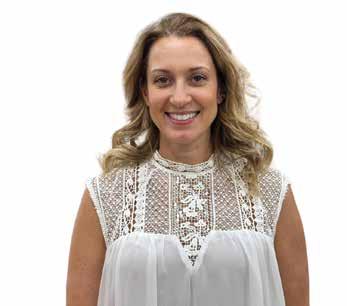
Financial limitations often hinder the availability and quality of training resources. Budgetary constraints and resource availability may impede investments in modern training equipment and facilities. This could have a potentially detrimental effect on the sustainability of maritime training and education. To overcome this, QMS MTC is committed to remaining accessible to its clients and seafarers and, to this end, we have developed a series of innovative approaches to meet our client’s budgets. We choose to channel these training and education budgets back into our client’s pockets by focusing on the below value-added initiatives which will save owners time and, most importantly, funds.
QMS MTC holds as its ‘modus operandi’ a series of initiatives which all share one core common factor: the maritime training industry is ever evolving. It frequently faces new challenges that significantly influence maritime safety, regulatory compliance, and the overall sustainability of maritime operations. These challenges necessitate continuous adaptation and improvement in our own training methodologies as a Maritime Training Center to better service our clients. QMS MTC, with its established experience of nearly three decades of operation, has been able develop a series of key solutions to overcome these challenges. Spurred upon by COVID-19, we faced, and overcame a series of technological challenges as QMS MTC had to enter into a new era for online training. We adapted our learning content into live online webinars, our LMS platform, online assessments and interactive training tools – these new initiatives all showcased a new education methodology which we were called upon to create new and flexible content to maintain our high-quality standards.
QMS MTC recognizes financial constraints in maritime training but focuses on innovative solutions. They adapt to evolving regulations, offer diverse cultural training, and invest in simulation technology. Addressing instructor shortages, they prioritize continuous professional development. Resource sharing and competence assessment ensure cost-effective, accessible training. By listening to client needs, QMS MTC aims to make high-quality education widely available, fostering industry sustainability.
Some of our key initiatives to meet the economic challenges of the maritime training industry are outlined below:
Dynamic Regulatory Landscape
The maritime industry is subject to ever-evolving international and national regulations. Maintaining alignment with the latest statutory requirements is an ongoing challenge for training programs and keeping up to date with new trends, regulatory changes and charterer demands. Non-compliance due to outdated training content can lead to serious consequences. The impact of regulatory compliance is what make maritime training a necessity, and should always be up to date and current. Since our job is to provide education, QMS MTC is in a key position to understand, and break down, the complexities of regulatory compliance. We work with our clients to provide tailor made courses as we understand that each of our client has different needs and competitive advantages and must meet different stakeholder needs (charterers, inspection authorities, pool of Officers, crew agents, etc.)
Crew Diversity and Cultural Sensitivity
With a diverse maritime workforce encompassing individuals from various cultural backgrounds, effective communication becomes paramount. Training programs must address cultural differences and language barriers to foster improved communication, teamwork, and, consequently, safety. The soft skills component takes “center stage” both at QMS MTC as well as within the commercial market with increased vessel inspection regimes focusing on human element competencies rather than technical skills. All provided QMS MTC training programs, whether theoretical or practical, encompass soft skills assessment based on the latest industry OCIMF

56 Training NAFS | MARCH 2024
exclusive

guidelines. Through our integrated programs, we work with both Deck and Engine teams, of various nationalities to integrate the BRM/ERM training on own-ship vessel which promotes the realities of onboard life, and simulates the same scenario so that both teams can cooperate and work together during their role play. We also do this for our Bridge and Pilot Interaction courses, Fire Command and Control and upon client request we develop role-based training courses, for office and seagoing staff, that puts their technical and soft skills ‘to the test’!
Evolution of Simulation Technology
Simulation technology is integral to maritime training for providing practical experience in controlled environments. However, staying abreast of the latest simulation technologies requires continual investment and development on the part of the MTC. Outdated simulation tools may fall short in adequately preparing seafarers for real-world challenges and could potentially be dangerous. QMS MTC provides fully interactive online courses and remote simulation centers which are accessed by seafarers without the need for extensive travel. These simulation centers provide a controlled learning environment even if the seafarer is located far from traditional classroom facilities. Our mobile learning environment allows seafarers flexible and convenient access to our updated training content on their devices (tablets or smartphones), in real time, from the comfort of wherever they may be located – even at sea!
QMS MTC closely partners with its Simulator Providers to monitor and update hardware and software requirements as per regulatory changes, improved graphics and user interaction experience to accommodate its client requests. We also provide a variety of manufacturers so our clients can choose which manufacturer can meet fleet needs. I believe that the next step will also follow with the Flag Administrations who will start to accept online Simulation training for national statutory certification.
Shortage of Qualified Instructors
A scarcity of qualified maritime instructors, particularly those with hands-on industry experience, poses a challenge and can seriously impact the quality of training services offered. This shortage can compromise the quality of training programs and the ability to impart practical insights to trainees. In our years of operation, QMS MTC has had the honor of working with key professionals in the industry with a ‘calling’ to offer their knowledge and make it accessible. My team works closely with our Trainers to ensure they are coached, continuously updated and they consistently renew their manufacturer Trainer accreditations in alignment with our company goals and quality management system. Apart from these qualifications, we also endeavor to develop their skills as Assessors in order to provide competence assessment services, thus developing a well-rounded Maritime Instructor and Assessor who can adapt and modify content and approach basis ability, rank, weaknesses and strengths of trainees to give our clients a transparent, 3rd party profiling of their Officers.
Continuous Professional Development
The dynamic nature of the maritime industry necessitates ongoing professional development for seafarers to stay current with new technologies, regulations, and safety protocols. Developing training
programs that facilitate continuous learning is essential for maintaining compliance and enhancing safety. Effectively addressing these challenges requires collaborative efforts among industry stakeholders, regulatory bodies, and training institutions such as QMS MTC. Such cooperation is vital for developing comprehensive, up-to-date training programs and learning content that prioritize safety, compliance, and sustainability in maritime operations. For example, QMS MTC works with organizations such as Hellenic Yacht Crew Members Association (HYCA) to refine and develop skills in the particular yachting sector, joint training programs with the Nautical Institute, GTT UK Ltd for LNG LICOS specialized training courses, MARLINS (part of OTG) as an accredited English Language Test Center and other key stakeholders to develop and enhance MET programs.
Resource Allocation
QMS MTC chooses to openly share its educational resources including digital e-books, videos and training tools to enhance the end user experience and provide freely accessible content to its trainees. We leverage our extensive range of live online training webinars which provide inclusivity and are of high international education standards. We deploy our Bridge/Engine and LCHS Simulators externally to ‘bring the machine to the man’ to make our courses accessible in Chios, Manila, France, at the crewing agents office and on board the vessel. QMS MTC Instructors work to facilitate a community-driven approach to learning and our students can share practical insights and best practices through our remote chat rooms and classrooms. In this way, the online training platforms developed by QMS MTC allow experienced Instructors and seafarers to contribute their knowledge and mentorship online, in real time.
Competence Assessment
An additional measure QMS MTC has taken to ensure its services reach a wider range of audiences and is cost effective is our range of developed Competency Based Assessment services, based on OCIMF recommended standards. These Assessments are simulator based, focus extensively on practical skills and real-world problem solving. They are usually absorbed by our clients following either: a near miss where QMS MTC provides re-enactment scenarios; for rank promotion; and, initial Officer onboarding.
Our Assessment approaches are outcome-based which allow Officers to demonstrate proficiency in specific tasks without unnecessary theoretical emphasis. They provide an immersive environment with challenging scenarios in a controlled setting with the sole purpose of building proficiency. In this way, our Competency Assessments focus on key skills, without spending time and resources on irrelevant topics.
As training budgets for shipping companies are not always at the forefront of the spreadsheets, QMS MTC has become very adaptable at finding cost effective and easily accessible solutions. QMS MTC continues to grow and listen to its client needs and is committed to implementing these innovative turn-key solutions to address the challenges of limited funding for maritime training. We work to ensure our high-quality education services remain accessible to all seafarers and bring economies of scale. In this way, we hope the industry as whole can foster similar initiatives, yield results and ensure long term sustainability for maritime training and education.

58 Training NAFS | MARCH 2024

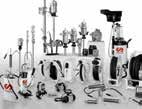







Katerina Palla
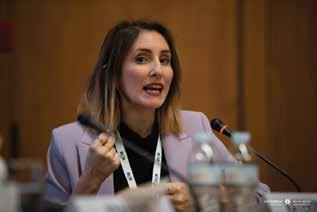

exclusive
The Significance of Maritime Training
The importance of maritime training & the challenges we face
“We would all agree that the maritime industry is a cornerstone of the modern economy. However, behind the scenes of this busy industry lie a lot of challenges, particularly in the realm of training. Training in the maritime sector is not merely about imparting knowledge and skills; it is about preparing seafarers to confront the unique and often hazardous conditions they will encounter at sea daily”.
Firstly, let’s highlight the criticality of maritime training. The maritime industry is a complex working environment where professionals operate within strict safety protocols, environmental regulations, and technological advancements. Whether it’s mastering navigation techniques, understanding maritime laws, or implementing safety procedures, well-trained personnel are essential. Competent training not only ensures compliance with international standards but also enhances operational efficiency and reduces the risk of accidents at sea.
Furthermore, the marine system is experiencing a fast transformation with the advancements in technology, automation, and digitalization. Consequently, the training needs of maritime professionals are also increasing. Seafarers will have to deal with the integration of new navigation technologies, remote monitoring equipment, Artificial Intelligence in shipping applications together with cybersecurity protocols. Marine Engineers need to master principles of maintenance of advanced technologies and the introduction of green practices. The fact that continuous professional development is the best way to stay up-to-date shows that the industry will remain an innovator.
Challenges Facing Maritime Training
Due to its paramount significance, marine training encounters a few challenges which are a great barrier to its efficiency and accessibility.
Technological Complexity: A rise in quick maritime technological improvements such as autonomous vessels, digital navigation systems, AI and smart port infrastructure, leads to the need of frequent training curriculum change and delivery tools. In order to ensure that training programs are updated according to technological developments and mariners will be capable of operating modern vessels efficiently, major investment is required to upgrade training facilities and courses’ material.
Regulatory Compliance: The maritime sector deals with a thorough system of comprehensive international regulations in addition to the national laws. New regulations are developed and established constantly in order to increase the safety onboard and all of them must

be integrated into training programs. Even though training centers and all maritime stakeholders will run into deep-rooted obstacles trying to pass through regulative maze, regulatory updates shall be incorporated into training modules.
Crew Diversity and Cultural Competence: Our industry is inherently international, with multicultural crew members speaking a multitude of languages. Effective communication and teamwork are essential for safe and efficient operations at sea. However, cultural and language barriers can pose significant challenges onboard. Hence, training must take into account the diverse backgrounds of seafarers and provide opportunities for language learning and cultural exchange to promote mutual understanding and teamwork.
Cost and Accessibility: Access to quality maritime training remains a challenge for individuals from economically disadvantaged backgrounds or regions where the maritime education infrastructure is either underdeveloped or non-existent. High courses fees, travel expenses, and accommodation costs for attending trainings present barriers for new maritime professionals, therefore causing inequalities within. Hence enhancing online learning platforms and establishing regional training centers in underserved areas is of high importance.
Retention and Skills Shortages: Talent retention in the maritime industry has become a big issue: old mariners retire, and people with skills leave in search of jobs in other sectors with better working conditions. The loss of experienced talent aggravates skills shortages and decreases operational efficiency and safety. To mitigate this issue, initiatives are required to identify new career development routes, attractive wage packages, and promote positive mix between work and family onboard the vessels.
Conclusion
Training in the maritime industry is fraught with challenges. However, overcoming these challenges is essential for ensuring the safety, security, and sustainability of maritime operations. By investing in comprehensive training programs that address the unique needs and challenges of the maritime sector, stakeholders can equip seafarers with the knowledge and skills they need to navigate these complexities and return home to their loved ones safe and sound.
RINA Training Manager, Global Marine Training Center
60 Training NAFS | MARCH 2024

From project conception to decommissioning, bridge the gap with RINA.
Make it sure, make it simple. rina.org
Dr Antonios Fringas
General Manager of SQLearn S.A.


Leveraging Computer-Based Training and AI in the Maritime Industry
steps to reduce these impacts. One of the main advantages of e-learning is that it allows students to access educational content from anywhere, at any time eliminating the need for students to travel to a physical classroom, which significantly reduces carbon emissions from transportation.
What do you believe about the use of Artificial Intelligence (AI) in maritime training? Are you including any AI applications in your portfolio?
Artificial Intelligence (AI) can play a significant role in enhancing maritime training for vessel operators and crew members. It can develop interactive and immersive training programs simulating real-life scenarios, providing hands-on experience, and enabling learners to gain practical skills and knowledge.
What is the demand for Computer Based Training in the post COVID maritime landscape?
During COVID, there was a shift towards online CBT dictated by the imposed lockdown. Many companies and seafarers embraced online training and soon became accustomed to its advantages over traditional training methods. In the following years, more companies recognized the increased ROI offered by online training, while seafarers appreciated the amount of knowledge accessible 24/7 without needing to travel in a training center. Today, IMO and flag administrations recognize more online courses easing the burden on seafarers during shore leave.
helps companies reduce their carbon footprint, how can this be possible?
Computer Based Training (CBT) can be a powerful tool to support companies in achieving decarbonization goals. At SQLearn, we are proud that for more than 10 years we have developed a high level of expertise in modern seafarer e-training methods, offering shipping companies innovative solutions tailored to their needs. CBT provides reduced environmental impact, compliance with environmental regulations, improves safety, offers enhanced efficiency, and reduces carbon emissions from student transportation. By utilizing CBT programs, operators can educate their crews on the best practices for reducing emissions, such as optimal voyage planning, fuel-efficient operation, and maintaining proper vessel speed. Additionally, CBT can help minimize the risk of spills and other accidents, which can have severe environmental impacts. Safety is a top priority for the maritime industry, and CBT programs can improve safety outcomes by regularly training crews on emergency response procedures, risk assessment, and other safety-related topics. This can help to reduce accidents and minimize the risk of injuries, ultimately improving the safety of crew members and vessels. CBT can also provide personnel with an understanding of regulations and standards they must comply with, helping them identify any areas of non-compliance. Furthermore, CBT can raise awareness among personnel about the environmental impacts of their actions and encourage
AI-powered simulators create a safe and controlled environment for trainees to learn and practice skills, reducing risks associated with on-board training. Additionally, AI can assess learners’ performance and provide personalized feedback, allowing trainers to identify areas for improvement and adjust the training program accordingly. This helps vessel operators and crew members better understand safety protocols, emergency response procedures, and best practices, ultimately leading to improved safety and efficiency in maritime operations. Moreover, combining AI with a system designed for maritime training, along with CBTs courses, can give optimal results. Specifically addressing vetting inspections, SQLearn has developed a Maritime Training AI Assistant, CaptAIn, a revolutionary learning aid embedded within each of its Computer-Based Training (CBT) courses. The assistant provides instant responses to questions, personalized feedback, and valuable insights to help mariners better comprehend and retain course material while also preparing them for the rigorous demands of vetting inspections. The reporting data collected in the training system can be utilized by an AI powered system to fine-tune training procedures by identifying deficiencies and improving training results. Furthermore, the training needs analysis can extend to address specific requirements such as those requested by vetting inspections like OCIMF’s SIRE 2.0 or RISQ by RightShip.

Companies have a strong need to better prepare their crews and vessels for vetting inspections. With SIRE 2.0 focusing more on the human element how can maritime training assist companies with this new workload?
SQLearn proposes a comprehensive solution to cover training requirements arising from OCIMF’s SIRE 2.0. This includes specific CBTs for each SIRE 2.0 chapter, specialized software for overall training activities management and reporting, specialized competency management software, cloud-based simulator training, and vessel-specific virtual familiarization. SQLearn’s CBT courses cover various chapters of OCIMF SIRE 2.0, preparing seafarers and ashore personnel for SIRE inspections. In addition, SQLearn’s “Vetting Inspections preparation software” (“Vetti”) allows crew personnel to initiate virtual vessel vetting inspection based on well-known questionnaires like RISQ, VIQ or create custom/ company specific ones. This software provides a detailed overview of the vessel status, identifies potential deficiencies, and better prepares for actual inspections. “Vetti” not only offers a comprehensive approach to conducting pre vetting inspections with precision but also stands as a sentinel for identifying crew training gaps and needs, ensuring teams are proficient, compliant, and ready for any challenge.
Furthermore, “Vetti” offers unparalleled customization, allowing companies to adapt the software to meet company specific questionnaires, inspection criteria, and/or operational requirements, assigning each crew member only the relevant questions based on their rank.
62 Training NAFS | MARCH 2024 exclusive
INTERVIEW

Leading safety and innovation in the Hellenic Maritime Community.
Working closely with our clients, ABS develops solutions and services that directly respond to the complex technical, operational and regulatory challenges the maritime industry faces today.
more today at www.eagle.org/Greece
TOGETHER TOWARD TOMORROW Learn
Χρήστος
Στυλιανίδης
Η εκπαίδευση του ναυτιλιακού ανθρώπινου δυναμικού ύψιστη προτεραιότητα για την Ελλάδα
Η παρέμβαση του Υπουργού Ναυτιλίας και Νησιωτικής Πολιτικής Χρήστου Στυλιανίδη στην “Διάσκεψη των Βρυξελλών για την ευημερία των ναυτικών” και οι αλλεπάλληλες επαφές του στις Βρυξέλλες

Την ύψιστη προτεραιότητα που έχει για την Ελλάδα το ναυτιλιακό ανθρώπινο δυναμικό και η εκπαίδευσή του τόνισε ο Υπουργός Ναυτιλίας και Νησιωτικής Πολιτικής Χρήστος Στυλιανίδης στην παρέμβασή του στη «Διάσκεψη των Βρυξελλών για την Ευημερία των Ναυτικών» (Brussels Conference on the Wellbeing of Seafarers) που οργάνωσε η Βελγική κυβέρνηση στο πλαίσιο των δράσεων της Βελγικής Προεδρίας του Ευρωπαϊκού Συμβουλίου. «Η Ελλάδα» υπογράμμισε ο κ. Στυλιανίδης, «ως μία από τις ισχυρότερες ναυτιλιακές δυνάμεις στον κόσμο και χώρα με το μεγαλύτερο εργατικό δυναμικό ναυτικών στην Ευρωπαϊκή Ένωση αναλογικά με τον πληθυσμό της, θεωρεί το ανθρώπινο δυναμικό ως το πολυτιμότερο κεφάλαιο της ναυτιλιακής βιομηχανίας». Ο κ. Υπουργός ανέφερε, παράλληλα, ότι «οι εξελίξεις στη ναυτιλία, όπως η ψηφιοποίηση, οι φιλικές προς το περιβάλλον τεχνολογίες, η επικοινωνία και οι επιλογές συνδεσιμότητας, θα αποτελέσουν χρήσιμα εργαλεία για τη βελτίωση της ευημερίας των ναυτικών μας και κατά συνέπεια θα καταστήσουν το ναυτικό επάγγελμα πιο ελκυστικό σε νέες και νέους ταλαντούχους, γυναίκες και άντρες». «Αποτελεί υποχρέωσή μας» πρόσθεσε «το πλοίο να αποτελεί ένα ασφαλές και φιλικότερο εργασιακό περιβάλλον. Οι Διεθνείς Συμβάσεις των κατ’ εξοχήν αρμόδιων οργανισμών ΙΜΟ και ΙLO αποτελούν τον θεματοφύλακα των δικαιωμάτων των ναυτικών και είμαι περήφανος γιατί η Ελλάδα, πέραν από την κύρωση και την τήρηση όλων των σχετικών Διεθνών Συμβάσεων, έχει θεσμοθετήσει στη βάση διαλόγου με τους κοινωνικούς εταίρους ένα νομοθετικό πλαίσιο που παρέχει ευνοϊκότερες συνθήκες εργασίας και
διαβίωσης των ναυτικών».
Επεσήμανε, παράλληλα, ότι «η διά βίου εκπαίδευση όσο και η διαρκής αναβάθμιση των δεξιοτήτων είναι απαραίτητο να συμβαδίζουν με τις συνεχείς τεχνολογικές αλλαγές και τις σύγχρονες απαιτήσεις της βιομηχανίας. Οι ικανοί ναυτικοί με ανεπτυγμένες δεξιότητες αποτελούν προαπαιτούμενο για την ασφαλή και τη

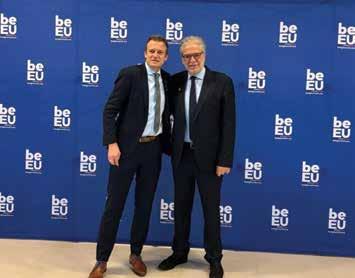
φιλική στο περιβάλλον λειτουργία των πλοίων. Τόσο οι ναυτιλιακές
διοικήσεις όσο και ο ιδιωτικός τομέας θα πρέπει να ενεργήσουν για
να διασφαλίσουν ότι το περιεχόμενο της κατάρτισης διαμορφώνεται
κατά τρόπο που να παρέχει δεξιότητες που ανταποκρίνονται
στις τεχνικές βελτιώσεις του κλάδου και στους νέους κανόνες
και κανονισμούς. Καμία έκπτωση από τα πρότυπα της Διεθνούς
Σύμβασης για την Εκπαίδευση των Ναυτικών (STCW) δεν μπορεί
να γίνει αποδεκτή» κατέληξε.
Στο περιθώριο της Διάσκεψης, ο Υπουργός είχε διμερή συνάντηση με τον Αναπληρωτή Πρωθυπουργό και Υπουργό Βόρειας
Θάλασσας του Βελγίου Paul Van Tigchelt.
Κατά την παραμονή του στις Βρυξέλλες ο κ. Στυλιανίδης είχε συναντήσεις με τον Ευρωπαίο Επίτροπο Προϋπολογισμού και Διοίκησης Johannes Hahn, την Ευρωπαία Επίτροπο Συνοχής και Μεταρρυθμίσεων Elisa Ferreira, την Ευρωπαία Επίτροπο Εσωτερικών Υποθέσεων Ylva Johansson, τον Γενικό Διευθυντή Φορολογίας της Ευρωπαϊκής Επιτροπής (DG TAXUD) Γεράσιμο Θωμά και τη Γενική Διευθύντρια Περιφερειακής Πολιτικής και Αστικής Ανάπτυξης της Ευρωπαϊκής Επιτροπής (DG REGIO) Θέμις Χριστοφίδου.
Στις συναντήσεις συζητήθηκαν τρόποι αξιοποίησης των ευρωπαϊκών προγραμμάτων και οι χρηματοδοτήσεις των προτεραιοτήτων του Υπουργείου Ναυτιλίας και Νησιωτικής
Πολιτικής στους τομείς της πράσινης ναυτιλίας και των πράσινων υποδομών των ελληνικών λιμένων. Επίσης, συζητήθηκαν
κ. Υπουργός συναντήθηκε, τέλος, με την Πρόεδρο της
Ευρωπαϊκής Ένωσης Εφοπλιστών Karin Orsel και άλλους
αξιωματούχους της Ένωσης.
64 Training NAFS | MARCH 2024
οι
και οι προκλήσεις
τον κρίσιμο ρόλο
εξελίξεις
που σχετίζονται με την μετανάστευση δια θαλάσσης. Ο κ. Στυλιανίδης υπογράμμισε
του Λιμενικού Σώματος – Ελληνικής Ακτοφυλακής στην προστασία της ανθρώπινης ζωής και των ευρωπαϊκών θαλάσσιων συνόρων. Ο


ΣΥΝΕΝΤΕΥΞΗ
Κώστας
Κωνσταντίνου & Πηνελόπη Κασανή
Με το ESG οι ναυτιλιακές εταιρίες θα
πρέπει να ξανασυστηθούν στην κοινωνία
Guide to ESG Reporting από το Ναυτικό Επιμελητήριο Ελλάδος σε συνεργασία με την
Moore Greece

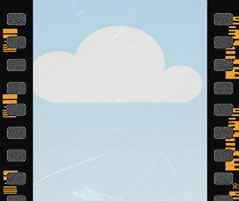
Π
ρόσφατα το Ναυτικό Επιμελητήριο Ελλάδος σε συνεργασία με την Moore Greece ανέπτυξαν τον Οδηγό “Guide to ESG Reporting” με στόχο την εφαρμογή κατευθυντήριων γραμμών ώστε να δημιουργηθούν θετικές αλλαγές στην ναυτιλιακή βιομηχανία και να
ενισχυθεί η φήμη του κλάδου. Τα κριτήρια ESG έχουν γίνει ολοένα και πιο σημαντικό θέμα για τα ενδιαφερόμενα μέρη όπως εταιρείες, επενδυτές, χρηματοδότες, πελάτες, εργαζόμενους και μη κυβερνητικές οργανώσεις για τα οποία η υποβολή εκθέσεων καθώς και η δημοσιοποίηση των επιδόσεων της επιχείρησης σε θέματα ESG θα συνδέεται ακόμα και με την πρόσβαση σε βιώσιμη χρηματοδότηση αλλά και ευκολότερη διείσδυση σε νέες αγορές.

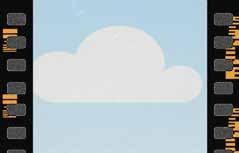
Περισσότερα για το θέμα αυτό συζητάμε στην συνέντευξη αυτή με τον κ. Κώστα Κωνσταντίνου Global Maritime Leader του δικτύου της Moore και Managing Partner της Moore Greece την κα. Πηνελόπη Κασανή Governance, Risk & Compliance Partner της Moore Greece.
Η συνέντευξη έλαβε χώρα στον φιλόξενο χώρο της Ναυτιλιακής Λέσχης Πειραιά
ΝΑΥΣ: Ας ξεκινήσουμε αυτήν την συνέντευξη με την ερώτηση γιατί το ESG είναι σημαντικό για τις ναυτιλιακές εταιρείες.

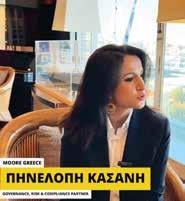

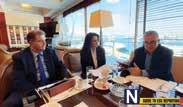
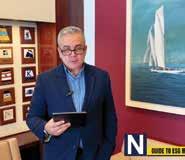

Κ.Κ: Οι ναυτιλιακές εταιρείες είναι και αυτές μέρος της παγκόσμιας οικονομίας και της εφοδιαστικής αλυσίδας. Έτσι λοιπόν βρίσκονται και αυτές στον πυρήνα της αυξημένης έγνοιας που έχουν οι καταναλωτές και ειδικότερα οι νεότερες γενιές στα θέματα του περιβάλλοντος, της κοινωνίας και της εταιρικής διαφάνειας. Συνεπώς οι ναυτιλιακές εταιρείες δεν μπορούν να παραμείνουν άπραγες. Αργά ή γρήγορα το κύμα αυτό θα ακουμπήσει και τις ναυτιλιακές. Πρέπει λοιπόν οι εταιρείες αυτές να γνωρίζουν όλο αυτό το περιβάλλον και το νέο πλαίσιο που έρχεται, προκειμένου να προσαρμοστεί στα νέα δεδομένα. Εν προκειμένω, όταν μιλάμε για ESG στη ναυτιλία μιλάμε για τον τρόπο του reporting. Πώς δηλαδή μία εταιρεία που έχει πάρει ήδη το μήνυμα ότι ο έξω κόσμος ενδιαφέρεται για τον τρόπο με τον οποίο λειτουργεί, θα δείξει στον κόσμο αυτόν τι ακριβώς κάνει και με ποιον τρόπο για τους τρεις πυλώνες του ESG. Τα τελευταία χρόνια λοιπόν έχει αποκρυσταλλωθεί το πλαίσιο με το οποίο ορίζεται ο τρόπος επικοινωνίας των πεπραγμένων μίας εταιρείας με την κοινωνία. Είναι απαραίτητο για τις εταιρείες και ειδικά τις ναυτιλιακές να είναι εναρμονισμένες με αυτό το πλαίσιο. Το ESG Reporting προσομοιάζει με το Financial Reporting που ξεκίνησε στην Ακτή Μιαούλη πριν 30-40 χρόνια. Συνεπώς πριν από μερικές δεκαετίες

66 NAFS | MARCH 2024
με τον ίδιο τρόπο που μία ναυτιλιακή εταιρεία έμαθε να ενημερώνει τα ενδιαφερόμενα μέρη για τα οικονομικά της πεπραγμένα και η συνεχής επικοινωνία κυρίως με τον τραπεζίτη μετεξελίχθηκε σε οικονομικές καταστάσεις, έτσι λοιπόν και σήμερα με τον ίδιο τρόπο ταυτίζεται η ανάγκη να ενημερώσεις τον έξω κόσμο όχι μόνο για τα οικονομικά πεπραγμένα αλλά και για το περιβάλλον την κοινωνία και
Έτσι λοιπόν βλέπουμε ότι το ESG είναι μία μετεξέλιξη των οικονομικών πεπραγμένων του παρελθόντος και αν έχουμε αυτό στο μυαλό μας τότε τα πράγματα είναι ακόμα πιο ξεκάθαρα. ΝΑΥΣ: Πως προέκυψε η ιδέα της δημιουργίας του οδηγού για το ESG Reporting
την εταιρική διακυβέρνηση.


σε συνεργασία με το Ναυτικό Επιμελητήριο Ελλάδος και ποιος είναι ο στόχος του οδηγού αυτού;
Π. Κ: Η ανάγκη προέκυψε από τις ίδιες τις ναυτιλιακές εταιρείες οι οποίες ενημερώθηκαν από διάφορους ειδικούς του κλάδου. Επί της αρχής λοιπόν, ξεκίνησε μία συζήτηση ανάμεσα στην ναυτιλιακές εταιρείες με πρώτο ερώτημα εάν το ESG τις αφορά, ή όχι και εν συνεχεία ‘τί είναι το ESG’, ‘τί πρέπει να κάνει μία εταιρία, αν πρέπει να κάνει κάτι’. Σε αυτήν την ανάγκη, και με όλο αυτόν τον θόρυβο που δημιουργήθηκε με το ESG, το Ναυτιλιακό Επιμελητήριο ανταποκρίθηκε και μας ανέθεσε την δημιουργία του οδηγού. Ο οδηγός είναι ένα πολυσέλιδο έγγραφο γιατί ο σκοπός του είναι να αποτελέσει το σημείο έναρξης και αναφοράς για τις ναυτιλιακές εταιρείες. Μέσα στον οδηγό υπάρχουν οι βασικές έννοιες και συγκεκριμένες οδηγίες και πρότυπα - πλαίσια που εφαρμόζονται συγκεκριμένα στην ναυτιλιακή βιομηχανία. Ο οδηγός περιλαμβάνει και παραπομπές προκειμένου μία εταιρεία που θέλει να ασχοληθεί με το πώς θα εφαρμόσει τις έννοιες αυτές να μπορεί να έχει τις επίσημες πηγές για να συνεχίσει την μελέτη της.
ΝΑΥΣ: Ποια είναι τα βήματα για την ενσωμάτωση της βιωσιμότητας στην επιχειρηματική στρατηγική σύμφωνα με το Guide to ESG Reporting;
Π. Κ: Ο οδηγός του ESG περιλαμβάνει πολλά βήματα. Ουσιαστικά τα βήματα αυτά ομαδοποιούνται σε πέντε. Ακολουθώντας τα, οι ναυτιλιακές εταιρίες θα μπορέσουν να ενσωματώσουν τις ιδέες του ESG στην στρατηγική τους και να τις αποτυπώσουν σε μία έκθεση. (1) Πάντοτε ξεκινάμε με την κατανόηση η οποία προκύπτει είτε από εκπαίδευση είτε από την μελέτη βασικών εννοιών. (2) Το δεύτερο βήμα αφορά τον εντοπισμό των κύριων θεμάτων του ESG σε κάθε έναν από τους πυλώνες (Περιβάλλον, Κοινωνία & Άνθρωπος, Διακυβέρνηση) πάντοτε σε συνδυασμό όχι μόνο με το τι θέλει η ίδια η εταιρεία και η διοίκηση της αλλά και με το τι είναι σημαντικό και για τα υπόλοιπα ενδιαφερόμενα μέρη, για παράδειγμα πελάτες

και επενδυτές. (3) Το τρίτο βήμα αφορά την επιμέτρηση βασικών δεικτών που δείχνουν ουσιαστικά την επίδοση της εταιρείας σε κάθε έναν από τους πυλώνες όπου εκεί χρησιμοποιούνται συγκεκριμένα πλαίσια και πρότυπα. Η έκθεση βιωσιμότητας δεν είναι μία έκθεση ιδεών και για να είναι αξιόπιστη θα πρέπει να εντάσσεται σε συγκεκριμένα πλαίσια παρουσίασης. (4) Το επόμενο βήμα είναι η στοχοθεσία. Η έκθεση βιωσιμότητας ουσιαστικά κοιτάζει προς το μέλλον. Συνεπώς πρέπει οι εταιρείες να εντοπίσουν πως θα μπορέσουν να βελτιώσουν τις επιδόσεις τους για τους στόχους που έχουν θέσει. (5) Με όλα αυτά τα θέματα κατά νου οι εταιρείες κάθε χρόνο καταρτίζουν την έκθεση βιωσιμότητας, το ESG Report, η οποία μπορεί να ελέγχεται από κάποιον ανεξάρτητο φορέα όπως είναι μία ελεγκτική εταιρεία.
ΝΑΥΣ: Από την εμπειρία σας πώς αντιμετωπίζει η ναυτιλιακή βιομηχανία το ανθρακικό της αποτύπωμα και πώς βοηθά το ESG στη μείωση των εκπομπών αερίων του θερμοκηπίου;
Κ.Κ: Η ναυτιλία αντιμετωπίζει το θέμα της απανθρακοποίησης, χωρίς να είναι αποκλειστικά δικό της πρόβλημα, με ιδιαίτερη σοβαρότητα και υπευθυνότητα. Υπάρχουν πάρα πολλές προτάσεις για νέα καύσιμα στη ναυτιλία και μάλιστα κάποιες προτάσεις έχουν μελετηθεί εις βάθος ώστε να εφαρμοστούν σε παγκόσμια κλίμακα. Οι ναυτιλιακές εταιρείες δεν
exclusive
μιλώ, έχουν ενστερνιστεί τους στόχους
να μειωθεί το περιβαλλοντικό αποτύπωμα από τα πλοία τους. Μέσω του ESG Reporting η κάθε ναυτιλιακή επιχείρηση έχει ένα εργαλείο με το οποίο μπορεί να θέσει στόχους και να τους παρακολουθεί, να τους μέτρα, να τους αναλύει, το οποίο έχει αρχή, μέση και τέλος. Με τον τρόπο αυτό μία ναυτιλιακή εταιρεία μπορεί να παρακολουθήσει αν η στρατηγική που έχει χαράξει σχετικά με την απανθρακοποίηση είναι στο σωστό δρόμο ή χρειάζεται να προβεί σε διορθωτικές κινήσεις. Χρησιμοποιούμε λοιπόν ένα εργαλείο στοχοθεσίας και επιμέτρησης προκειμένου να επιτύχουμε τους στόχους που έχουμε θέσει. Από αριστερά ο κ. Κώστας Κωνσταντίνου Global Maritime Leader του δικτύου της Moore και Managing Partner της Moore Greece, η κα. Πηνελόπη Κασανή Governance, Risk & Compliance Partner της Moore Greece με τον δημοσιογράφο & Εκδότη του ΝΑΥΣ Πάνο Δούκα.
το έχουν πάρει αψήφιστα. Οι εταιρείες όλες με τις οποίες
προκειμένου
ΣΥΝΕΝΤΕΥΞΗ
ΝΑΥΣ: Πώς εξασφαλίζεται η διαφάνεια ώστε κάποιες από τις εταιρίες να φαίνονται πιο βιώσιμες από ότι είναι, να επιδίδονται δηλαδή στο λεγόμενο “greenwashing”;
Π.Κ: Η διαφάνεια εξασφαλίζεται με την ύπαρξη προτύπων. Όταν μιλάμε για πρότυπα ως προς την έκθεση βιωσιμότητας εννοούμε ουσιαστικά δύο ειδών πρότυπα. Μιλάμε για τα πρότυπα και τα πλαίσια αναφοράς με τα οποία καταρτίζεται η έκθεση βιωσιμότητας αλλά και τα πρότυπα με τα όποια μπορεί να παρέχει διασφάλιση επί της έκθεσης βιωσιμότητας ένας ανεξάρτητος τρίτος φορέας.
Κ.Κ: Αυτό που περιέγραψε η Πηνελόπη είναι ουσιαστικά και ο λόγος για τον οποίο οι ελεγκτικές εταιρείες ασχολούνται και με αυτό τον τομέα. Το επάγγελμα μας εδώ και πολλά χρόνια είναι σχεδιασμένο να ακολουθεί μεθοδολογία για το πώς παρέχει διασφάλιση. Έτσι και σε αυτή την περίπτωση ο παγκόσμιος φορέας ο οποίος εκδίδει τα ελεγκτικά πρότυπα έχει πάρει κάτω από την σκέπη του και τα πρότυπα αυτά καθώς υπάρχει μεγάλη εμπειρία. Το ESG θα αποτελεί μέρος αυτού που λέμε στην δική μας γλώσσα “μη χρηματοοικονομική πληροφόρηση”. Μία εταιρεία λοιπόν, μαζί με τις οικονομικές καταστάσεις θα πρέπει να παρουσιάζει και μη χρηματοοικονομική πληροφόρηση όπου μία τέτοια είναι και το ESG Reporting. Ο ρόλος ο δικός μας λοιπόν δεν είναι να πούμε με ποιο τρόπο μία ναυτιλιακή εταιρεία θα οδηγηθεί προς την απανθρακοποίηση αλλά να την βοηθήσουμε να συγκεντρώσει σχετικές πληροφορίες και να προβεί σε γνωστοποιήσεις, οι οποίες θα πιστοποιηθούν. Με τον τρόπο αυτό μπορεί να αποφευχθεί το greenwashing.
ΝΑΥΣ: Καθώς το ESG αποτελεί ένα νέο αλλά πολλά υποσχόμενο κεφάλαιο στην ζωή των εταιριών πιο γράμμα από τα τρία (e - s - g) Environmental, Social, and Governance καταλαμβάνει μεγαλύτερο κομμάτι της πίτας και γιατί; Κ.Κ: Σίγουρα στην παρούσα φάση μονοπωλεί το Ε. Όλη αυτή η συζήτηση για την απανθρακοποίηση και τους στόχους του ΙΜΟ, το ‘τι καύσιμο θα χρησιμοποιήσουμε’ μονοπωλεί το ενδιαφέρον των ναυτιλιακών κύκλων. Καμιά ναυτιλιακή εταιρεία δεν μπορεί να λύσει το Ε μόνη της. Το πρόβλημα των καυσίμων θα λυθεί από την αγορά εν ευθέτω χρόνω και τότε η ναυτιλιακή κοινότητα θα προσαρμοστεί στα δεδομένα. Τότε θα μπορούσαμε να ισχυριστούμε ότι το Ε αποτελεί πια κουβέντα του παρελθόντος. Κατά την άποψή μου η κουβέντα του σήμερα είναι το S. Σε όλες τις εταιρείες την διοίκηση την απασχολεί πάντα πως θα μπορέσει να διατηρηθεί στους κόλπους της πολύ καλό κόσμο. Οι νέες γενιές που έρχονται να στελεχώσουν μία ναυτιλιακή εταιρεία δίνουν πάρα πολύ μεγάλη σημασία στην εταιρεία για την οποία θα εργαστούν. Συνεπώς κατά την δική μου εκτίμηση σε λίγο καιρό δεν θα είναι εύκολο να προσελκύσεις και να διατηρήσεις σωστό ανθρώπινο δυναμικό το οποίο θα είναι ικανό να τρέξει και τα σύγχρονα πλοία αλλά και τις σύγχρονες τεχνολογίες στην στεριά χωρίς να πεις στον έξω κόσμο ποιος είσαι και τι κάνεις. Χρειάζεται να προσέχεις το περιβάλλον, να έχεις σωστό ανθρώπινο δυναμικό και διαφάνεια στις πράξεις σου ως εταιρεία. Το S λοιπόν είναι πολύ κρίσιμο για το μέλλον.
ΝΑΥΣ: Μπορείτε να μας πείτε έναν μύθο και μία αλήθεια για κάθε ένα πυλώνα (e - s - g);
Π.Κ: Σχετικά με το Ε γίνεται μία πολύ μεγάλη κουβέντα για την απανθρακοποίηση. Δεν αφορά όμως μόνο αυτή. Αφορά και πολλά άλλα θέματα όπως για παράδειγμα την προστασία του υποθαλάσσιου περιβάλλοντος, την εξοικονόμηση ενέργειας, την προστασία της βιοποικιλότητας. Όσον αφορά το S η συζήτηση φαίνεται να εξαντλείται στην ισότητα των δύο φύλων ενώ συνδέεται
και με πολύ μεγάλα θέματα όπως η υγεία και η ασφάλεια των πληρωμάτων, η θέση που έχει η ναυτιλιακή εταιρεία στην κοινωνία και η σημασία της ναυτιλιακής εταιρείας και των φορέων της
στην κοινωνία. Τώρα για το G, μύθος είναι ότι θα μας επιφέρει μεγαλύτερη γραφειοκρατία. Η αλήθεια είναι όμως ότι πάρα πολλά από τα αντικείμενα τα οποία άπτονται του G αφορούν πεδία που ήδη αντιμετωπίζει μία ναυτιλιακή εταιρεία και για τα οποία υπάρχουν ήδη πολιτικές και διαδικασίες.
ΝΑΥΣ: Ποιο θα είναι κατά την γνώμη σας το κέρδος για τον πλανήτη και την κοινωνία με την εφαρμογή του ESG Report;
Π.Κ: Το κέρδος είναι ότι μπαίνουμε πλέον σε μία εποχή όπου και οι καταναλωτές και οι επενδυτές έχουμε μεγαλύτερη ευαισθησία και μεγαλύτερη κατανόηση για θέματα μη-οικονομικά και πλέον οι αποφάσεις μας στηρίζονται και σε μη οικονομικούς παράγοντες και μη οικονομικά κριτήρια. Έτσι λοιπόν δε μας απασχολεί μόνο το ‘πόσο’ αλλά και το ‘πώς’. Φαίνεται πως οδηγούμαστε σε μία εποχή που θα έχουμε μεγαλύτερο σεβασμό ως προς το περιβάλλον και τον άνθρωπο με αποτέλεσμα την πιο υπεύθυνη αξιοποίηση των πόρων.
Κ.Κ: Εδώ πρέπει να διαχωρίσουμε την ναυτιλία από την ναυτιλιακή εταιρεία. Η ναυτιλία δεν έχει να φοβάται τίποτα ή να υποστεί κάτι από το ESG. Έχει περάσει μέσα από μεγάλες αλλαγές τα τελευταία 200 χρόνια, από το πανί στο κάρβουνο εν συνεχεία στο Diesel και στα double hulls, και θα συνεχίσει να υπάρχει και να ευημερεί καθώς η θάλασσα είναι ξεκάθαρα ο πιο ασφαλής και οικονομικός τρόπος μεταφοράς προϊόντων. Το ερώτημα λοιπόν είναι τί θα
κάνει η ναυτιλιακή εταιρεία σε αυτό το νέο περιβάλλον. Δεδομένης λοιπόν της ανάγκης της κοινωνίας να μάθει και να συναλλάσσεται με μέρη τα οποία δίνουν μεγάλη έμφαση όχι μόνο στα κέρδη τους, θα πρέπει να βρει τον χώρο της και να γίνει ορατή μέσα σε αυτό το περιβάλλον. Θα πρέπει να χρησιμοποιήσει το ESG Report και κατάλληλο ESG Process, και να ενσωματώσει την στοχοθεσία στον στρατηγικό της σχεδιασμό. Με αυτό τον τρόπο η ναυτιλιακή εταιρεία θα μπορεί να συνεχίσει να υπάρχει και τα επόμενα χρόνια.
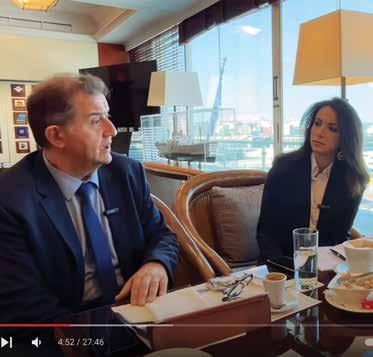

68 NAFS | MARCH 2024

Your link to the future of shipping.
www.oceanking.gr
Από την Τεχνολογία στην Περιβαλλοντική Δράση: Η Πρωτοβουλία της TURBOMED SA
Η TURBOMED SA, ηγέτιδα δύναμη στον κλάδο των τουρμπινών πλοίων, επιβεβαιώνει την αφοσίωσή της στην περιβαλλοντική βιωσιμότητα και την εταιρική κοινωνική ευθύνη μέσα από μία αξιοσημείωτη πρωτοβουλία. Σε συνεργασία με τη Μεσογειακή Εταιρεία Προστασίας Περιβάλλοντος (MEPP) και με την υποστήριξη της HELMEPA, διοργάνωσε επιτυχώς στις 2 Μαρτίου 2024 ένα εκτεταμένο υποθαλάσσιο καθαρισμό στο αλιευτικό καταφύγιο Ήλιδας, ακολουθούμενο από μια ενημερωτική ημερίδα. Κατά τη διάρκεια της δράσης, ομάδες επαγγελματιών δυτών συνέλεξαν περισσότερα από δύο τόνους απορριμμάτων από τον πυθμένα του λιμανιού, υπογραμμίζοντας την επείγουσα ανάγκη για δράση προς όφελος των θαλάσσιων οικοσυστημάτων. Η συνέχεια δόθηκε με την ημερίδα που ακολούθησε στον Πολυχώρο Πολιτισμού Ήλιδας, όπου υπό τον συντονισμό του κ. Χρήστου Σούλη, Γενικού Γραμματέα Περιβάλλοντος και Κλιματικής Αλλαγής της ΝΔ, καταξιωμένοι ομιλητές και ειδικοί στον τομέα της περιβαλλοντικής προστασίας μοιράστηκαν γνώσεις και εμπειρίες, με στόχο την ενίσχυση της περιβαλλοντικής συνειδητοποίησης και την προώθηση της συλλογικής δράσης για την προστασία του πλανήτη. Ο κ. Ιωάννης Παρασκευόπουλος, Πρόεδρος και Διευθύνων Σύμβουλος της TURBOMED SA, τόνισε τη σημασία της ενσωμάτωσης της περιβαλλοντικής βιωσιμότητας στην επιχειρηματική στρατηγική, υπογραμμίζοντας ότι «Δεν μπορούμε να μιλάμε για ανάπτυξη στον τόπο μας, χωρίς να υπολογίζουμε το παραλιακό μας μέτωπο». Επιπρόσθετα, επεσήμανε την καθοριστική σημασία της θάλασσας για την εθνική αλλά και οικονομική ανάπτυξη της Ελλάδας, προσθέτοντας ότι «Η θάλασσα έχει τη δύναμη να οδηγήσει την Ελλάδα σε μια νέα εποχή ανάπτυξης και ευημερίας».
Η εν λόγω πρωτοβουλία αποτελεί μέρος ενός ευρύτερου προγράμματος δράσεων της TURBOMED SA για την ενίσχυση της βιωσιμότητας και της περιβαλλοντικής προστασίας. Η εταιρεία δεσμεύεται να συνεχίσει την υποστήριξη και την πρωτοπορία σε περιβαλλοντικές πρωτοβουλίες, καθώς και να προωθήσει την ενεργό συμμετοχή τόσο των εργαζομένων της όσο και της ευρύτερης κοινότητας.
Με ακλόνητη την πίστη στη δύναμη της συλλογικής προσπάθειας, προσβλέπουμε σε ένα πιο βιώσιμο μέλλον για τις επόμενες γενιές. Μαζί, μπορούμε να κάνουμε τον κόσμο μας καλύτερο, προστατεύοντας τον πλούτο και την ομορφιά των θαλασσών μας και διαφυλάσσοντας το περιβάλλον για τις επόμενες γενιές.
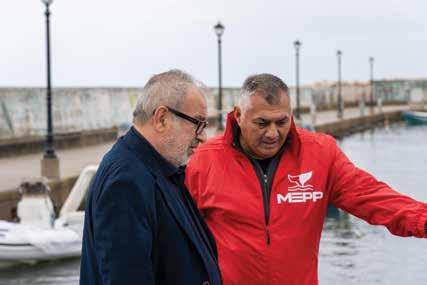
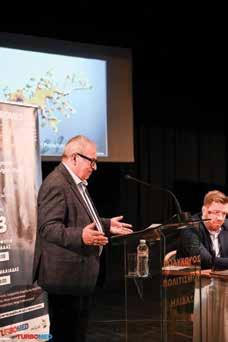

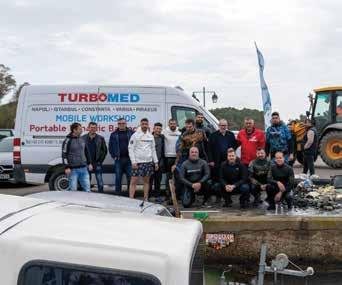
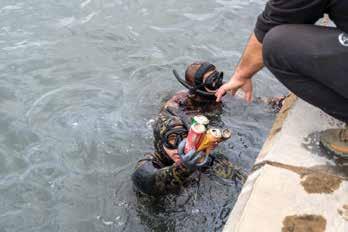

70 Market news NAFS | MARCH 2024

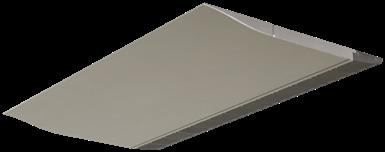
A smooth path to real energy savings
Save fuel on any vessel with OceanGlide
Air lubrication reduces drag and fuel consumption, and it’s never been easier to implement. Alfa Laval OceanGlide gets proven results with fewer compressors, minimal hull penetrations and no large sea chest. So even existing vessels can achieve fuel savings of up to 12%.
The secret is OceanGlide’s unique combination of air lubrication with fluidic technology. Fast and simple to retrofit, it creates an even, controllable air layer across the entire flat bottom. To see why fluidic air lubrication is your path to savings, visit www.alfalaval.com/oceanglide
Απολογισμός του Υφ. Ναυτιλίας Κύπρου για τον πρώτο χρόνο διακυβέρνησης του Νίκου Χριστοδουλίδη
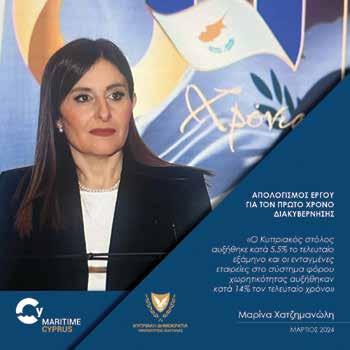
Το έργο και τις δράσεις του Υφυπουργείου Ναυτιλίας κατά τον πρώτο χρόνο διακυβέρνησης Νίκου Χριστοδουλίδη, παρουσίασε σήμερα, 28 Μαρτίου 2024, σε Διάσκεψη Τύπου, η Υφυπουργός Ναυτιλίας κα. Μαρίνα Χατζημανώλη.
Η Υφυπουργός αναφέρθηκε στη σημαντικότητα του ναυτιλιακού τομέα για την οικονομία και την ανάπτυξη της Κύπρου, αλλά και στο σημαντικό ρόλο που διαδραματίζει η Κύπρος διεθνώς ως ένα ναυτιλιακό κράτος. Η κα Χατζημανώλη τόνισε ότι «η χώρα μας, αποτελεί ένα παγκοσμίου φήμης ναυτιλιακό σύμπλεγμα, που περιλαμβάνει ένα ευρύ φάσμα δραστηριοτήτων που σχετίζονται με την ναυτιλία. Η αναβάθμιση των υπηρεσιών μας, η υψηλή ποιότητα εξυπηρέτησης, η ασφάλεια των πλοίων, η εξειδίκευση και η τεχνογνωσία του προσωπικού, η αποτελεσματικότητα και ευελιξία, καθώς και οι σημαντικές διμερείς συμφωνίες με άλλες χώρες έχουν καθιερώσει την Κυπριακή ναυτιλία σημαντικό πυλώνα ανάπτυξης και την Κυπριακή σημαία μια από τις πιο αξιόπιστες και ανταγωνιστικές στην παγκόσμια ναυτιλία».
Η κα. Χατζημανώλη παρουσίασε τα σημαντικά αποτελέσματα και τους στόχους που επιτεύχθηκαν κατά τους τελευταίους 12 μήνες:
• Σημαντική αύξηση της τάξεως του 5.5% ή διαφορετικά κατά περίπου 1.1 εκ. τόνους, τους τελευταίους 6 μήνες, στον στόλο των εγγεγραμμένων υπό κυπριακή σημαία ποντοπόρων πλοίων. Αυξημένο ενδιαφέρον νέων πλοιοκτητών και ναυτιλιακών εταιρειών, οι οποίοι έχουν εγγράψει τα πλοία τους στο κυπριακό νηολόγιο
• Τους τελευταίους 12 μήνες σημειώθηκε σημαντική αύξηση της τάξης του 14% στις ενταγμένες εταιρείες στο εγκεκριμένο από την Ευρωπαϊκή Ένωση Σύστημα Φόρου Χωρητικότητας, φτάνοντας τις 420
• Η θαλάσσια επιβατική σύνδεση Κύπρου – Ελλάδας
λειτούργησε με μεγάλη επιτυχία για δεύτερη συνεχή χρονιά, με περισσότερους από 7400 επιβάτες, περισσότερα από 2400 αυτοκίνητα και μηχανές και περισσότερα από 250 κατοικίδια. Αριθμοί που δείχνουν ότι η θαλάσσια επιβατική σύνδεση Κύπρου – Ελλάδας είναι και απαραίτητη, αλλά και με προοπτικές βιωσιμότητας.
• Μεγάλη επιτυχία με αυξημένη συμμετοχή σημείωσε το Φεστιβάλ «ΘΑΛΑΣΣΑ» το οποίο διοργανώθηκε για τρίτη συνεχή χρονιά. Στόχος του η καλλιέργεια θαλάσσιας και ναυτιλιακής κουλτούρας, και η ανάδειξη της σημασίας και των προοπτικών του τομέα της ναυτιλίας και της Γαλάζιας Οικονομίας. Φέτος για πρώτη φορά συμμετείχε στο Φεστιβάλ και η Διοίκηση Ναυτικού διενεργώντας Διέλευση Σκαφών του Πολεμικού Ναυτικού.
• Θεσμοθετήσαμε την Συμβουλευτική Επιτροπή Ενίσχυσης της Ανταγωνιστικότητας και της Ποιότητας της Κυπριακής Σημαίας, καθώς και την Συμβουλευτική Επιτροπή Ενίσχυσης της Ανταγωνιστικότητας του Κυπριακού Ναυτιλιακού Συμπλέγματος, στα πλαίσια του στόχου της συνεχούς βελτίωσης και ενίσχυσης της ανταγωνιστικότητας της κυπριακής σημαίας και της κυπριακής ναυτιλιακής βιομηχανίας.
• Με πρωτοβουλία και πρόταση του Υφυπουργείου Ναυτιλίας, το Υπουργικό Συμβούλιο ενέκρινε την σύσταση Επιτροπής για αντιμετώπιση θαλάσσιας ρύπανσης στις ακτές της Κύπρου
• Μετά από την πρόσφατη απόφαση του Υπουργικού Συμβουλίου για παραχώρηση κρατικής γης για την ανέγερση των νέων κτιριακών εγκαταστάσεων του Υφυπουργείου Ναυτιλίας τροχοδρομήθηκαν όλες τις απαραίτητες ενέργειες προς υλοποίηση, αυτού του πολύ σημαντικού έργου.
• Το Μονοθυριδικό Ναυτιλιακό Κέντρο Εξυπηρέτησης – One Stop Shipping Center- τέθηκε σε λειτουργία τον Νοέμβριο, ικανοποιώντας ένα αίτημα χρόνων της Ναυτιλιακής βιομηχανίας.
• Το Υφυπουργείο Ναυτιλίας προχώρησε σε σειρά ενεργειών για την πλήρη ψηφιοποίηση των υπηρεσιών του. Το έργο αναμένεται να ολοκληρωθεί εντός του 2024, με το Υφυπουργείο Ναυτιλίας να είναι το πρώτο Υπουργείο/Υφυπουργείο που θα ψηφιοποιήσει ΟΛΕΣ τις υπηρεσίες του.
• Η εντυπωσιακή άνοδος της κυπριακής σημαίας από την 13η θέση, στην 8η θέση της Λευκής Λίστας του PARIS MoU επιβεβαιώνει τις υψηλές προδιαγραφές ποιότητας και ασφάλειας των πλοίων που φέρουν την κυπριακή σημαία και αντανακλά τις προσπάθειες
• Υιοθετήθηκε νομοθετικό πλαίσιο για την περαιτέρω ενίσχυση των επιπέδων ασφάλειας της ναυσιπλοΐας και της προστασίας του θαλάσσιου περιβάλλοντος.
• Το Υπουργικό Συμβούλιο, ενέκρινε αναθεωρημένη σειρά πράσινων κινήτρων για την επιβράβευση πλοίων που επιδεικνύουν αποτελεσματικές μειώσεις εκπομπών αερίων

72 Market news NAFS | MARCH 2024
που καταβάλλονται για τη βελτίωση των
και ενισχύει το κύρος
πρακτικών ελέγχου και εποπτείας
και την αξιοπιστία του κυπριακού νηολογίου.

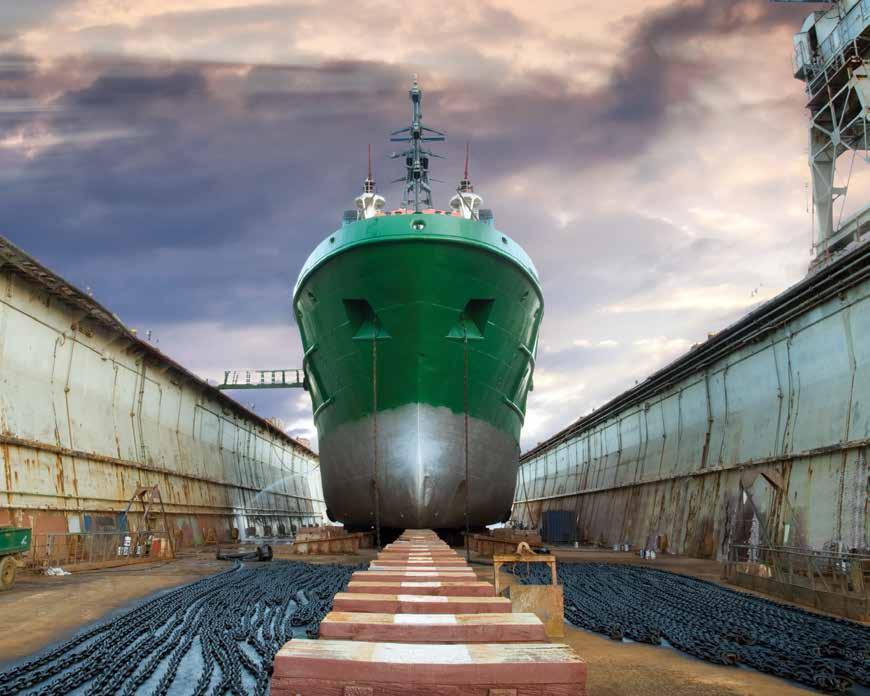


Excellence at the highest level Dry-dock & Ship Repairs | Marine Spares Supply | Riding Squads | BWMS | DeSOx Scrubber Technology 24 Vallianou Str. | 17455 Alimos | Athens, Greece Tel: +30 210 8986203 | Fax: +30 210 8986206 | Email: technical@psbpapadakis.gr www.psbpapadakis.gr Exclusive Agents of Korea Global Service (KGS) Official Agents of MS-SOx GlOBAL ECHO – The only Scrubber system that can be installed in 14 days AFLOAT – No need for DD
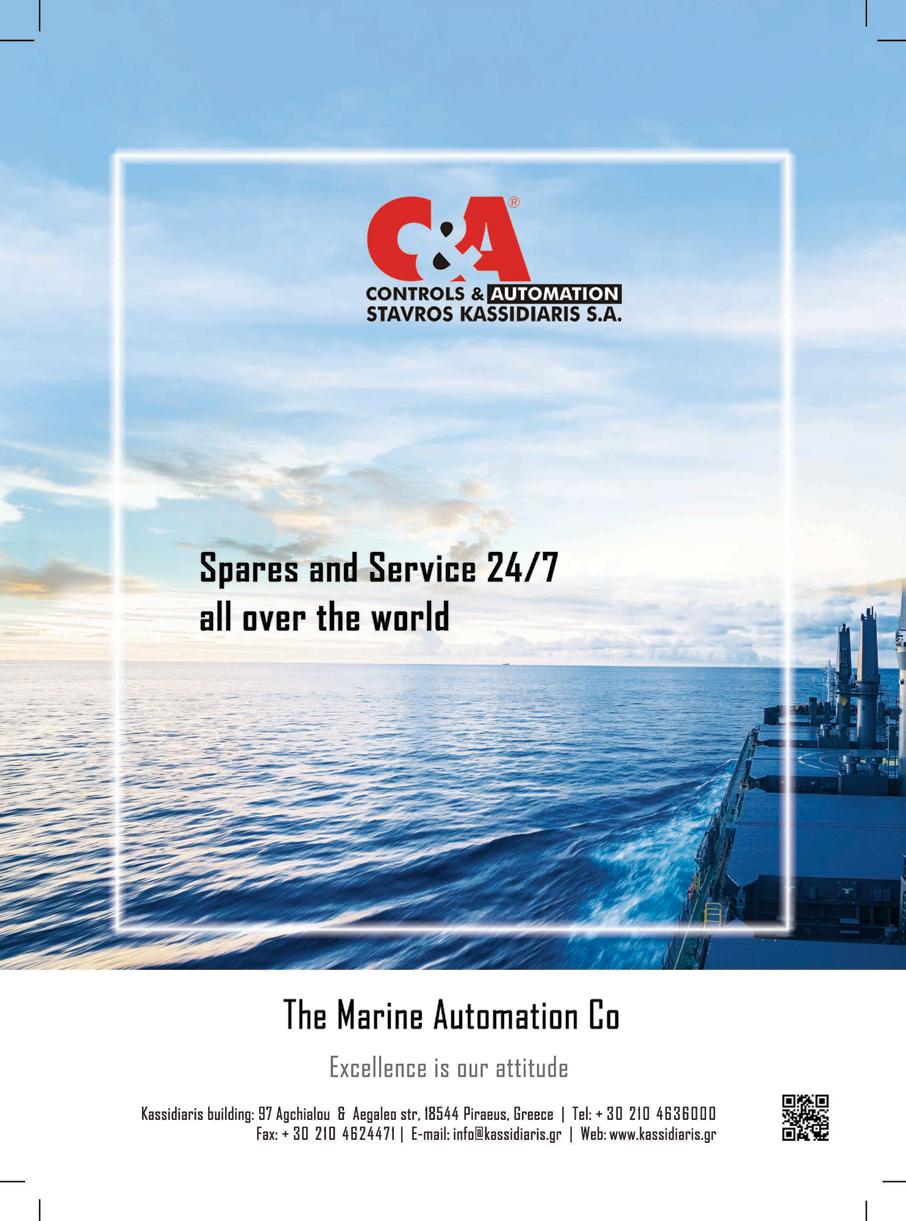
Hδυναμική παρουσία της Ναυτιλίας των Ελλήνων
στο 9o Οικονομικό Φόρουμ των Δελφών
Καίριες παρεμβάσεις της ΕΕΕ στα πεδία της ναυτιλίας, της οικονομίας, της κοινωνίας, της εκπαίδευσης και του περιβάλλοντος
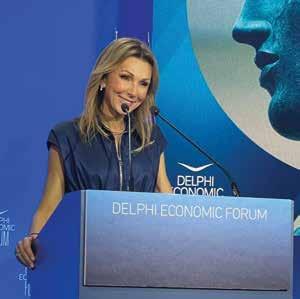



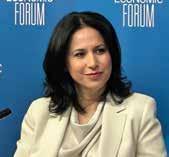



Από αριστερά επάνω - Μελίνα Τραυλού, Πρόεδρος της Ενώσεως Ελλήνων Εφοπλιστών, Αντώνης Λαιμός, Αντιπρόεδρος της Ενώσεως Ελλήνων Εφοπλιστών, Δημήτρης Φαφαλιός, Γενικός Γραμματέας της Ενώσεως Ελλήνων Εφοπλιστών, Ιωάννης Ξυλάς, Ταμίας της Ενώσεως Ελλήνων Εφοπλιστών, Κυριακή Μητρούση, Επικεφαλής του τμήματος εξωτερικών υποθέσεων της ΕΕΕ, Γιάννης Λύρας, Μέλος του ΔΣ της ΕΕΕ, Σεμίραμις Παληού, Μέλος του ΔΣ της ΕΕΕ, Κατερίνα Πέππα, Διευθύντρια της ΕΕΕ.
Η Ένωση Ελλήνων Εφοπλιστών έδωσε δυναμικό «παρών» στο 9ο Οικονομικό Φόρουμ των Δελφών, με την παρουσία της να είναι καταλυτική στις εργασίες του.
Η Πρόεδρος της ΕΕΕ, Μελίνα Τραυλού, στο πλαίσιο της ομιλίας της στην έναρξη των εργασιών του 9ου Οικονομικού Φόρουμ των Δελφών, έδωσε το «στίγμα» της ελληνικής ναυτιλίας, ως παγκόσμια ηγέτιδα, καθώς και την πορεία που χαράσσει σε εθνικό και διεθνές επίπεδο, ενώ απηύθυνε ισχυρό μήνυμα στους ηγέτες κρατών να θωρακίσουν τη σταθερά που ενώνει τον πλανήτη, τη ναυτιλία.
Επίσης, εκπρόσωποι της Ένωσης Ελλήνων Εφοπλιστών συμμετείχαν σε ζωτικής σημασίας συζητήσεις θέτοντας στο επίκεντρο θέματα που αφορούσαν τα πεδία της ναυτιλίας, της οικονομίας, της κοινωνίας, της εκπαίδευσης και του περιβάλλοντος, αποδεικνύοντας την πολυεπίπεδη δράση της ΕΕΕ. Πιο συγκεκριμένα ο Αντώνης Λαιμός, Αντιπρόεδρος της ΕΕΕ, συμμετείχε σε συζήτηση στην ενότητα του Φόρουμ «WORLD & EU ECONOMY», ο Δημήτρης Φαφαλιός, Γενικός Γραμματέας της ΕΕΕ, στην ενότητα «SHIPPING» και στην ενότητα «PLANET», ο Γιάννης Ξυλάς, Ταμίας της ΕΕΕ, στην ενότητα «SHIPPING», ο Γιάννης Λύρας, Μέλος του ΔΣ της ΕΕΕ, στην ενότητα «WORLD & EU ECONOMY», η Σεμίραμις Παληού, Μέλος του ΔΣ της ΕΕΕ, στην ενότητα του Φόρουμ «PLANET», η Κατερίνα Πέππα, Διευθύντρια της ΕΕΕ, στην ενότητα «EDUCATION» και η Κυριακή

Μητρούση, επικεφαλής του τμήματος εξωτερικών υποθέσεων της ΕΕΕ, στην ενότητα «SHIPPING».
Οι εκπρόσωποι της ΕΕΕ ανέδειξαν τις σύγχρονες προκλήσεις της ελληνικής ναυτιλίας και την άμεση, διαχρονική και στρατηγικής σημασίας σύνδεση με την Ελλάδα, την Ευρώπη και την παγκόσμια κοινότητα.
H κα Μελίνα Τραυλού, Πρόεδρος της Ένωσης Ελλήνων Εφοπλιστών, εκπροσωπώντας θεσμικά τον ηγετικό κλάδο της εθνικής οικονομίας, την ελληνική ναυτιλία, δήλωσε στο Opening
Session:
«Βιώνουμε μία πρόκληση πρωτόγνωρα καθολική. Πανανθρώπινη. Σε αυτήν την οικουμενική πρόκληση, η ιστορία μπορεί να λειτουργήσει ως ο σοφός μέντορας. Και
76 Delphi Forum NAFS | MARCH 2024
η ιστορία
στις θάλασσες του κόσμου. Δια μέσου της θάλασσας, ανακαλύφθηκε ο πλανήτης μας. Τα πλοία συνέβαλαν
της ρότας της ιστορίας του παγκόσμιου πολιτισμού. Η
είναι συνδιαμορφωτής της Ιστορίας μας. Η ποντοπόρος ναυτιλία των Ελλήνων, είναι διαχρονικά η αιχμή του δόρατος της παγκόσμιας ναυτιλίας. Πάντα σε εγρήγορση, σε αέναη κίνηση και ανοιχτούς ορίζοντες. Πάντα πρωτοπόρος! Το όραμά μας ήταν και
απλά ποσοτική, αλλά και ποιοτική. Ωφέλιμη για την κοινωνία. Έτσι,
παγκόσμιο
success story με ελληνική ταυτότητα και ψυχή. Τη Ναυτιλία των Ελλήνων. Σήμερα, η ελληνική
συνδέεται άρρηκτα με τα ταξίδια του ανθρώπου
στη χάραξη
ναυτιλία
είναι, η ηγεσία μας να μην είναι
δημιουργήσαμε και εξελίσσουμε το
επιχειρηματικό
ναυτιλία,

Want your machines to perform better? Don’t change oil.
What if you could get cleaner oil in your application without having to change it? With RecondOil Box from SKF, you can use the same oil over and over again. In fact, you can get cleaner oil than ever before. Your machines can perform better, and at the same time, your oil can be transformed from a costly CO footprint into a sustainable asset.
Don’t change oil. Change to circular use of oil.












® SKF and RecondOil are registered trademark of the SKF Group. | © SKF Group
#circularuseofoil
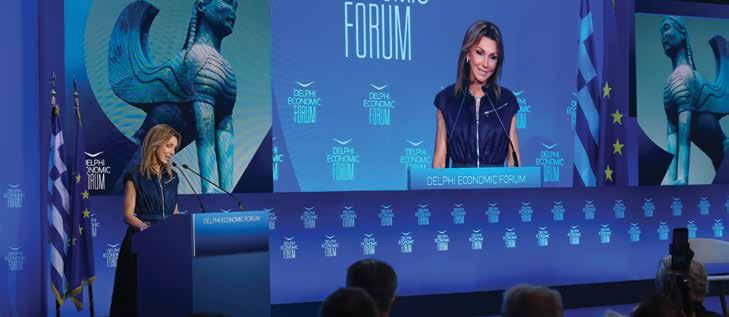
κατέχοντας πάνω από το 60% της ευρωπαϊκής, είναι η ραχοκοκαλιά της. Οι Έλληνες, συμβάλαμε και συμβάλλουμε ουσιαστικά, ώστε η ευρωπαϊκή ναυτιλία που αποτελεί το 40% της παγκόσμιας, να διασφαλίζει την εύρυθμη λειτουργία του διεθνούς οικοσυστήματος. Είναι ύψιστης προτεραιότητας, σε αυτή τη μετάβαση, οι σταθερές που λειτουργούν για το καλό της ανθρωπότητας να θωρακιστούν. Ιδιαίτερα για την Ευρώπη, οι θεσμοί είναι ουσιαστικό να προνοήσουν, ώστε να προστατευτεί η ισχύς και η ανταγωνιστικότητα της ευρωπαϊκής ναυτιλίας. Η μεγάλη μετάβαση μάς καλεί σε κοινό σχέδιο πλεύσης. Μας καλεί σε μετάβαση νοοτροπίας. Μας καλεί στο «μαζί». Από το ιστορικό τοπόσημο της ανθρώπινης νόησης, τους Δελφούς, απευθύνω μία δημόσια πρόσκληση προς όλους τους ηγέτες κρατών, κυβερνήσεων, οργανισμών, ιδρυμάτων, εταιριών: Να προχωρήσουμε με ενσυναίσθηση. Να συμπράξουμε με σεβασμό στην ιστορία που καλούμαστε να συν-δημιουργήσουμε για τις επόμενες γενιές. Η ναυτιλία θα είναι πάντα εδώ, συνοδοιπόρος για το κοινό καλό.»
O κ. Α. Λαιμός, Αντιπρόεδρος της ΕΕΕ, κατά τη διάρκεια συζήτησης με θέμα «HELLENIC SHIPPING: INTERNATIONAL
LEADERSHIP MADE IN GREECE», μεταξύ άλλων, ανέφερε: « Η ναυτιλία των Ελλήνων είναι διεθνής και με μεγάλη προσαρμοστικότητα στις σύγχρονες προοπτικές και προκλήσεις. Η πράσινη μετάβαση αποτελεί ευκαιρία για την ελληνική ναυτιλία, η οποία πρωτοπορεί και σε αυτόν τον τομέα παγκοσμίως. Είναι όμως αναγκαία η συμμετοχή όλων των βιομηχανικών κλάδων στην πράσινη μετάβαση, ώστε να εξασφαλιστεί ένα βιώσιμο μέλλον για τις επόμενες γενιές».
Ο κ. Δ. Ι. Φαφαλιός, Γραμματέας της Ένωσης Ελλήνων Εφοπλιστών, κατά τη διάρκεια της συζήτησης με τίτλο «PERSPECTIVES ON NEW ENERGY REGULATIONS IN SHIPPING» που
συμμετείχε, τόνισε: «Ενώ στην καθημερινότητα των ναυτιλιακών εταιριών οι καινούργιοι περιβαλλοντικοί κανονισμοί θα φέρουν μεγάλο γραφειοκρατικό βάρος, η ναυτιλία και, ιδιαίτερα η ελληνόκτητη ναυτιλία, είναι πιο έτοιμη από ποτέ να αντιμετωπίσει τα εναλλακτικά καύσιμα και τις καινοτόμες ή καινούργιες τεχνολογίες για τη μείωση των εκπομπών GHG».
Ο κ. Ι. Ξυλάς, Ταμίας της ΕΕΕ, υπογράμμισε μεταξύ άλλων στο πλαίσιο της συζήτησης «MARITIME EDUCATION: EMPOWERING
THE FUTURE OF SUSTAINABLE SHIPPING»:
« Ο ελληνικός εφοπλισμός έμπρακτα και με συνέπεια επιδιώκει και

ενθαρρύνει την προσέλκυση της νέας γενιάς στη ναυτιλία
Ο κ. Ι. Κ. Λύρας, μέλος του ΔΣ της ΕΕΕ συμμετέχοντας στη συζήτηση με τίτλο «THE LONG-TERM CONTRIBUTION AND THE STRATEGIC SIGNIFICANCE OF GREEK SHIPPING IN THE GREEK AND EUROPEAN ECONOMY» αναφέρθηκε στα εξής: «Η ελληνική ναυτιλία, η οποία δραστηριοποιείται στη μεταφορά αγαθών απαραίτητων για τη διαβίωση και την ευημερία όλων των λαών, εξασφαλίζει την αδιάλειπτη λειτουργία του παγκόσμιου εμπορίου, έχοντας πάντα ως επίκεντρο τον άνθρωπο».
Η κ. Σ. Παληού, μέλος του ΔΣ της ΕΕΕ σημείωσε στη συζήτηση με τίτλο « NAVIGATING THE CURRENTS: STRATEGIES FOR A SUSTAINABLE PLANET» μεταξύ άλλων: «Η βιώσιμη ανάπτυξη και η επιχειρηματική δραστηριότητα χρειάζεται να είναι αλληλένδετες».
Επίσης, στο πλαίσιο της συζήτησης με τίτλο « NAVIGATING THE CURRENTS: STRATEGIES FOR A SUSTAINABLE PLANET», ο κ. Δ. Ι. Φαφαλιός, Γραμματέας της Ένωσης Ελλήνων Εφοπλιστών, ανέφερε: « Η ενεργειακή μετάβαση ενέχει πολλές προκλήσεις για τη ναυτιλιακή βιομηχανία. Δεν υπάρχει λύση-πανάκεια, καθολική για όλους τους τύπους πλοίων. Ωστόσο η ναυτιλία δεν υστερεί πια, αλλά ηγείται στο πεδίο της ενεργειακής μετάβασης».
Η κ. Κ. Πέππα, Διευθύντρια της ΕΕΕ αναφέρθηκε στη συζήτηση με τίτλο « NAVIGATING TOMORROW: HUMAN CENTERED SHIPPING AND CAREER HORIZONS» στα εξής:
«Το ανθρώπινο δυναμικό είναι κινητήριος δύναμη της
SHIPPING IN A CHANGING WORLD. SETTING SAIL FOR A MORE RESILIENT AND SUSTAINABLE FUTURE » επισήμανε,
και την
κατάρτιση της στα
άρτια
σύγχρονα δεδομένα, με πίστη στη δύναμη και τη δυναμική του ανθρώπινου κεφαλαίου».
και εξέλιξης του κλάδου στις σύγχρονες προκλήσεις». Τέλος, η κ. Κ. Μητρούση, επικεφαλής του τμήματος εξωτερικών υποθέσεων της ΕΕΕ στη συζήτηση με τίτλο
Η ναυτιλία δεν είναι μόνο ένα μέσο μεταφοράς. Η ελληνική ναυτιλία, με την ηγετική της θέση, έχει στρατηγικό ρόλο για την οικονομική και ενεργειακή ασφάλεια των πολιτών όλου του κόσμου και ιδιαίτερα για την ανθεκτικότητα και βιωσιμότητα των ευρωπαϊκών οικονομιών».
NAFS | MARCH 2024 Μελίνα Τραυλού, Πρόεδρος της Ενώσεως Ελλήνων Εφοπλιστών
ανθρωποκεντρικής ελληνικής ναυτιλίας. Αποτελεί εχέγγυο αντοχής
«
μεταξύ άλλων: «
78 Delphi Forum

Επιδιορθώσεις


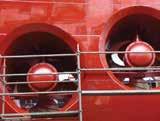
Η Coral Piraeus ship repairs PC είναι εταιρεία με μεγάλη εμπειρία από το 1990 στην προετοιμασία επιφανειών με μεθόδους σύγχρονης τεχνολογίας Αμμοβολής-Υδροβολής υψηλής πίεσης και Υδροβολή υπέρ υψηλής πίεσης (U.H.P.W.J.), με ρομποτικά συστήματα και εφαρμογή σύγχρονων μεθόδων χρωματισμού. Επίσης παρέχει υπηρεσίες καθαρισμού GAS FREE κ.α. Η εταιρεία είναι εφοδιασμένη με όλες τις πιστοποιήσεις ISO. (ISO 9001:2015, ISO 14001:2015, ISO 45001:2018)

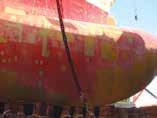

Coral Piraeus ship repairs PC is a company with extensive experience since 1990 in the procedures of surface preparations, using modern sandblasting –High Pressure Jet technology and Ultra High Pressure Water Jet (U.H.P.W.J). Moreover, it is also equipped with robotic systems and application of synchronous coating methods.
Furthermore the company provides cleaning services
GAS FREE. Coral Piraeus ship repairs PC holds all the certifications ISO. (ISO 9001:2015, ISO 14001:2015, ISO 45001:2018)
Βαφής Σιλικόνης στο Πέραμα
CORAL PIRAEUS SHIP REPAIRS PC ΔΙΕΥΘΥΝΣΗ: ΣΚΟΥΖΕ 14- ΠΕΙΡΑΙΑΣ 18536 - ΤΗΛ: 2104520060-1 - info@coral-piraeus.gr VASSILIS KANAKAKIS Προετοιμασία επιφάνειας με ULTRA HIGH PRESSURE WATER
President and Managing Director
JET 2500 BAR
Μελίνα Τραυλού προς ηγέτες κρατών
«Θωρακίστε την σταθερά που ενώνει τον πλανήτη: Τη ναυτιλία»
Η Πρόεδρος της Ένωσης Ελλήνων Εφοπλιστών, Μελίνα Τραυλού στην έναρξη των εργασιών του 9ου Οικονομικού Φόρουμ των Δελφών.


Το εμβληματικό Οικονομικό Φόρουμ των Δελφών, που τελεί υπό την Αιγίδα της Α.Ε. της Προέδρου της Δημοκρατίας, κας Κατερίνας Σακελλαροπούλου ξεκίνησε σήμερα Τετάρτη 10 Απριλίου τις φετινές διεργασίες του. H κα Μελίνα Τραυλού, Πρόεδρος της Ένωσης Ελλήνων Εφοπλιστών, εκπροσωπώντας θεσμικά τον ηγετικό κλάδο της εθνικής οικονομίας, την ελληνική ναυτιλία, σημείωσε κατά την εναρκτήρια εκδήλωση: «Βιώνουμε μία πρόκληση πρωτόγνωρα καθολική. Πανανθρώπινη. Σε αυτήν την οικουμενική πρόκληση, η ιστορία μπορεί να λειτουργήσει ως ο σοφός μέντορας. Και η ιστορία συνδέεται άρρηκτα με τα ταξίδια του ανθρώπου στις θάλασσες του κόσμου. Δια μέσου της θάλασσας, ανακαλύφθηκε ο πλανήτης μας. Τα πλοία συνέβαλαν στη χάραξη της ρότας της ιστορίας του παγκόσμιου πολιτισμού. Η ναυτιλία είναι συνδιαμορφωτής της Ιστορίας μας. Η ποντοπόρος ναυτιλία των Ελλήνων, είναι διαχρονικά η αιχμή του δόρατος της παγκόσμιας ναυτιλίας. Πάντα σε εγρήγορση, σε αέναη κίνηση και ανοιχτούς ορίζοντες. Πάντα πρωτοπόρος! Το όραμά μας ήταν και είναι, η ηγεσία μας να μην είναι απλά ποσοτική, αλλά και ποιοτική. Ωφέλιμη για την κοινωνία. Έτσι, δημιουργήσαμε και εξελίσσουμε το παγκόσμιο επιχειρηματικό success story με ελληνική ταυτότητα και ψυχή. Τη Ναυτιλία των Ελλήνων. Σήμερα, η ελληνική ναυτιλία, κατέχοντας πάνω από το 60% της ευρωπαϊκής, είναι η ραχοκοκαλιά της. Οι Έλληνες, συμβάλαμε και συμβάλλουμε ουσιαστικά, ώστε η ευρωπαϊκή ναυτιλία που αποτελεί το 40% της παγκόσμιας, να διασφαλίζει την εύρυθμη λειτουργία του διεθνούς οικοσυστήματος. Είναι ύψιστης προτεραιότητας, σε αυτή τη μετάβαση, οι σταθερές που λειτουργούν για το καλό της ανθρωπότητας να θωρακιστούν. Ιδιαίτερα για την Ευρώπη, οι θεσμοί είναι ουσιαστικό να προνοήσουν, ώστε να προστατευτεί η ισχύς και η ανταγωνιστικότητα της ευρωπαϊκής ναυτιλίας. Η μεγάλη μετάβαση μάς καλεί σε κοινό σχέδιο πλεύσης. Μας καλεί σε μετάβαση νοοτροπίας. Μας καλεί στο «μαζί». Από το ιστορικό τοπόσημο της ανθρώπινης νόησης, τους Δελφούς, απευθύνω μία δημόσια πρόσκληση προς όλους τους ηγέτες κρατών, κυβερνήσεων, οργανισμών, ιδρυμάτων,
80 Delphi Forum NAFS | MARCH 2024
που καλούμαστε να συν-δημιουργήσουμε για τις επόμενες γενιές. Η ναυτιλία θα είναι πάντα εδώ, συνοδοιπόρος για το κοινό καλό.» Η ομιλία της Πρόεδρου της Ένωσης Ελλήνων Εφοπλιστών, Μελίνα Τραυλού, κατά την έναρξη των εργασιών του φετινού Οικονομικού Φόρουμ των Δελφών, το οποίο έχει θέμα «Η Μεγάλη Μετάβαση»: «Το 9ο Φόρουμ των Δελφών μάς θέτει, πράγματι, μπροστά σε μία ζωτική πρόκληση. Μια πρόκληση πρωτόγνωρα καθολική. Μελίνα Τραυλού, Πρόεδρος της Ενώσεως Ελλήνων Εφοπλιστών
εταιριών: Να προχωρήσουμε με ενσυναίσθηση. Να συμπράξουμε με σεβασμό στην ιστορία


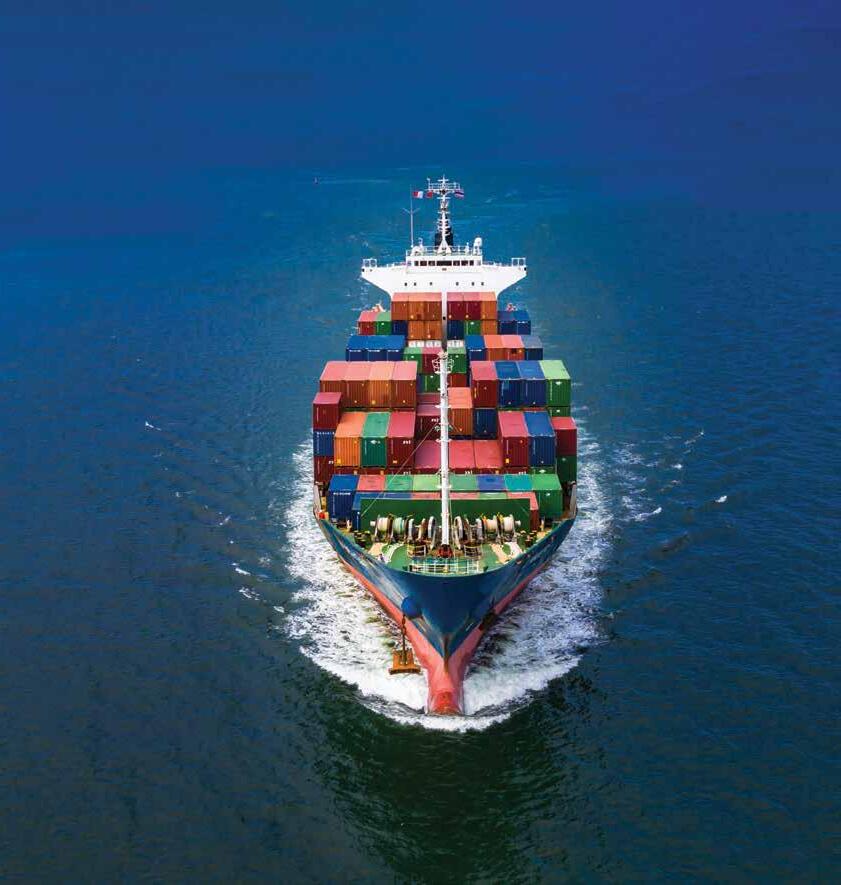

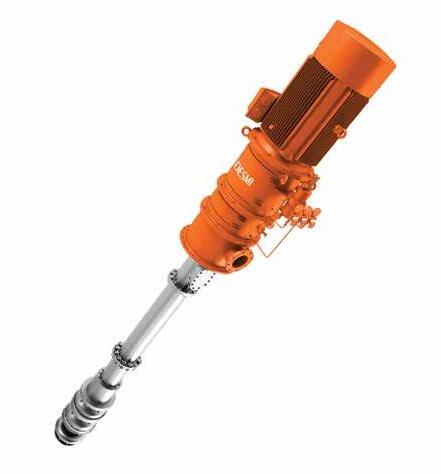
HIGH-EFFICIENCY & RELIABLE MARINE SOLUTIONS Fresh- and Seawater Cooling Ballast Water Fire-Fighting Scrubber / Exhaust Gas Cleaning Etc. Centrifugal Pumps ENERGY SAVING SYSTEM OptiSaveTM Optimizing pump & fan speed to current conditions & saving fuel CompactClean BALLAST WATER MANAGEMENT SYSTEM desmigreece@desmi.com www.desmi.com FULL RANGE OF BWMS 35 m3/h - 2500 m3/h
Πανανθρώπινη. Βιώνουμε μία εποχή, όπου συνεχώς γεννιούνται παράλληλοι, πολυεπίπεδοι μετασχηματισμοί, που δοκιμάζουν τον πυρήνα μας. Όσα γνωρίζουμε, αποδεχόμαστε, ακολουθούμε, με όσα νιώθουμε ασφαλείς, ανατρέπονται. Το αποτέλεσμα; Νέα πρότυπα, άγνωστα και, κυρίως ρευστά, αναδύονται παγκόσμια. Είναι σαφές ότι πλέουμε στα αχαρτογράφητα νερά μιας μεγάλης μετάβασης, που τα ιδιαίτερα χαρακτηριστικά της συνθέτουν παράλληλα και μια μεγάλη ευκαιρία: την αξιοποίηση της καθολικότητάς της, προς όφελος της ανθρωπότητας. Είναι καθοριστικής σημασίας, λοιπόν, να προχωρήσουμε στο μέλλον, αφού πρώτα αναγνωρίσουμε το που βρισκόμαστε και το πως φτάσαμε εδώ. Το επιτακτικό «τώρα», που ορθώνεται μπροστά μας, μας καλεί να διαμορφώσουμε σχέδιο πλεύσης για να οδηγήσουμε τον πλανήτη σε ένα βιώσιμο αύριο. Απαιτείται ταχύτητα, αλλά με ανάλυση, σύνδεση και σύνεση και πάνω από όλα σεβασμό στην πανανθρώπινη κλίμακα της μετάβασης αυτής.
Κυρίες και κύριοι, σε αυτήν την οικουμενική πρόκληση, η ιστορία μπορεί να λειτουργήσει ως ο σοφός μέντορας. Και η ιστορία συνδέεται άρρηκτα με τα ταξίδια του ανθρώπου στις θάλασσες του κόσμου. Δια μέσου της θάλασσας, ανακαλύφθηκε ο πλανήτης μας. Τα πλοία συνέβαλαν στη χάραξη της ρότας της ιστορίας του παγκόσμιου πολιτισμού. Η ναυτιλία είναι συνδιαμορφωτής της Ιστορίας μας. Ό,τι και αν συμβαίνει στον πλανήτη, είναι η ακλόνητη σταθερά, που συνεχίζει την αποστολή της να ενώνει, εδώ και χιλιετίες, τους λαούς. Να μας ενώνει. Η ποντοπόρος ναυτιλία των Ελλήνων, είναι διαχρονικά η αιχμή του δόρατος της παγκόσμιας ναυτιλίας. Πάντα σε εγρήγορση, σε αέναη κίνηση και ανοιχτούς ορίζοντες. Πάντα πρωτοπόρος!
Είναι η ναυτιλία που ανέδειξε και αναδεικνύει τη δύναμη της ανθρωποκεντρικής δημιουργίας και ηγεσίας. Ο φάρος της ελληνικής ναυτιλίας είναι ο άνθρωπος, ο οποίος είναι πάντα στο επίκεντρο των αποφάσεων. Αυτός κρατά σταθερά, το πηδάλιο της ανάπτυξης σε κάθε μετάβαση. Έτσι πορευθήκαμε στο πέρασμα των χρόνων και έτσι πορευόμαστε στις θάλασσες του κόσμου, ως η ηγέτιδα ναυτιλία. Εργαζόμαστε μεθοδικά, ώστε να προλαβαίνουμε τις εξελίξεις της κάθε εποχής. Πάντα, με οδηγό τη συλλογική δυναμική, την μακρόχρονη τεχνογνωσία μας και τον σεβασμό στη ναυτοσύνη μας. Οι Έλληνες πλοιοκτήτες επενδύουμε, συνεχώς, σε νεότευκτα πλοία και εξοπλισμό υψηλής περιβαλλοντικής απόδοσης, κατέχοντας έναν υπερσύγχρονο στόλο. Αξίζει να σημειωθεί ότι ο ελληνικός στόλος, που αποτελεί το 20% της παγκόσμιας ναυτιλίας, πρωτοστατεί και στην πράσινη μετάβαση του κλάδου. Το όραμά μας ήταν και είναι, η ηγεσία μας να μην είναι απλά ποσοτική, αλλά και ποιοτική. Ωφέλιμη για την κοινωνία. Έτσι, δημιουργήσαμε και εξελίσσουμε το παγκόσμιο επιχειρηματικό success story με ελληνική ταυτότητα και ψυχή. Τη Ναυτιλία των Ελλήνων.
Ένα διαχρονικό, ισχυρό, γεωπολιτικό μας πλεονέκτημα, που η συμβολή του υπήρξε καταλυτική σε πολλές εμβληματικές στιγμές της ιστορίας μας. Από την έκβαση της ελληνικής Επανάστασης, μέχρι την ένταξη της Ελλάδας στην Ευρωπαϊκή Ένωση. Όταν η χώρα μας γινόταν το 10ο μέλος της τότε ΕΟΚ, διέθετε ένα υπερόπλο. Την ελληνική εμπορική ναυτιλία, η οποία – 43 χρόνια πριν – ενίσχυσε πολιτικά, οικονομικά και εμπορικά την Κοινότητα διεθνώς.
Η ναυτιλία είναι συνδιαμορφωτής της Ιστορίας μας. Η ποντοπόρος ναυτιλία των Ελλήνων, είναι διαχρονικά η αιχμή του δόρατος της παγκόσμιας ναυτιλίας. Πάντα σε εγρήγορση, σε αέναη κίνηση και ανοιχτούς ορίζοντες. Πάντα πρωτοπόρος! Το όραμά μας ήταν και είναι, η ηγεσία μας να μην είναι απλά ποσοτική, αλλά και ποιοτική. Ωφέλιμη για την κοινωνία. Έτσι, δημιουργήσαμε και εξελίσσουμε το παγκόσμιο επιχειρηματικό success story με ελληνική ταυτότητα και ψυχή. Τη Ναυτιλία των Ελλήνων. Σήμερα, η ελληνική ναυτιλία, κατέχοντας πάνω από το 60% της ευρωπαϊκής, είναι η ραχοκοκαλιά της. Οι Έλληνες, συμβάλαμε και συμβάλλουμε ουσιαστικά, ώστε η ευρωπαϊκή ναυτιλία που αποτελεί το 40% της παγκόσμιας, να διασφαλίζει την εύρυθμη λειτουργία του διεθνούς οικοσυστήματος.
Σήμερα, η ελληνική ναυτιλία, κατέχοντας πάνω από το 60% της ευρωπαϊκής, είναι η ραχοκοκαλιά της. Οι Έλληνες, συμβάλαμε και συμβάλλουμε ουσιαστικά, ώστε η ευρωπαϊκή ναυτιλία που αποτελεί το 40% της παγκόσμιας, να διασφαλίζει την εύρυθμη λειτουργία του διεθνούς οικοσυστήματος. Ο μεγάλος ευρωπαϊστής, ηγέτης, Κωνσταντίνος Καραμανλής, τόνιζε ως Πρόεδρος της Ελληνικής Δημοκρατίας: «Πρέπει να είμαστε υπερήφανοι για τη ναυτιλία και τους ανθρώπους της. Γιατί δεν αποτελούν μόνο οικονομική αλλά και ηθική δύναμη για την πατρίδα μας.»
Τότε, ένα μήνυμα εθνικό. Σήμερα, ένα μήνυμα ευρωπαϊκό, διεθνές, που καλούμαστε να λάβουμε υπόψη μας. Είναι ύψιστης προτεραιότητας, σε αυτή τη μετάβαση, οι σταθερές που λειτουργούν για το καλό της ανθρωπότητας να θωρακιστούν. Ιδιαίτερα για την Ευρώπη, οι θεσμοί είναι ουσιαστικό να προνοήσουν, ώστε να προστατευτεί η ισχύς και η ανταγωνιστικότητα της ευρωπαϊκής ναυτιλίας.
Κυρίες και κύριοι, το DNA και η πορεία της ναυτιλίας, αποτελεί ένα πρότυπο, άξιο προς παρατήρηση, μελέτη και έμπνευση. Και αυτό γιατί, στην ιστορία της έχει μεταβεί μέσα από πολλές και διαφορετικές εποχές, με πίστη στο καθήκον, ψυχραιμία, με αποτελεσματικότητα στη διαχείριση των προκλήσεων. Εξασφαλίζοντας την επιβίωση, τη διαβίωση και την ευημερία των ανθρώπινων κοινωνιών. Συνδέοντας πολιτισμούς, λαούς, γλώσσες, ζωές. Μεταφέροντας, όχι απλά προϊόντα, αλλά και νέα δεδομένα και ιδέες, που εξέλιξαν τον κόσμο. Και όλα αυτά τα κατάφερε και τα καταφέρνει επικεντρωμένη στη συνεργασία.
Η μεγάλη μετάβαση μάς καλεί σε κοινό… σχέδιο πλεύσης. Μας καλεί σε μετάβαση νοοτροπίας. Μας καλεί στο «μαζί».
Από το ιστορικό τοπόσημο της ανθρώπινης νόησης, τους Δελφούς, απευθύνω μία δημόσια πρόσκληση προς όλους τους ηγέτες κρατών, κυβερνήσεων, οργανισμών, ιδρυμάτων, εταιριών:
Να προχωρήσουμε με ενσυναίσθηση.
Να συμπράξουμε με σεβασμό στην ιστορία που καλούμαστε να συν-δημιουργήσουμε για τις επόμενες γενιές.
Η ναυτιλία θα είναι πάντα εδώ, συνοδοιπόρος για το κοινό καλό».

82
Forum NAFS | MARCH 2024
Delphi




Το «στοίχημα» να παραμείνει στην κορυφή ο
ελληνικός εμπορικός στόλος
Από αριστερά επάνω - Κωστής Φραγκούλης Πρόεδρος στο «The International Propeller Club», στο Λιμάνι Πειραιά και Ιδρυτής, Πρόεδρος & Διευθύνων Σύμβουλος του «Franman Group», Σταμάτης Τσαντάνης, Διευθύνων Σύμβουλος, της «Seanergy Maritime Holdings» στην Ελλάδα, Γιάννης Κοτζιάς, Πρόεδρος στην Ελληνική Ένωση Ναυλομεσιτών & Ιδρυτικός Συνεργάτης, Xclusiv Shipbrokers, Αλέξανδρος Παπαδημητρίου, Υπεύθυνος Στρατηγικής Ανάπτυξης GasLog, Αλέξανδρος Κ. Χατζηπατέρας, SEVP Dorian LPG (USA)LLC / MD Dorian LPG Management Corp, Δανάη Μπεζαντάκου, Διευθύνουσα Σύμβουλος, Navigator Shipping
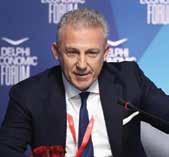
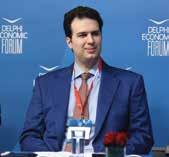
H σημαντική προσφορά στην ελληνική κοινωνία και οικονομία, αλλά και οι δυνατότητες αξιοποίησης των ευκαιριών για τον ελληνικό εμπορικό στόλο, τον κορυφαίο στον κόσμο, τέθηκαν επί τάπητος, στο 9o Οικονομικό Φόρουμ των Δελφών, που πραγματοποιείται στους Δελφούς από τις 10 έως τις 13 Απριλίου και τελεί υπό την Αιγίδα της Α.Ε. της Προέδρου της Δημοκρατίας, κας Κατερίνας Σακελλαροπούλου.
Έμφαση δόθηκε σε ζητήματα εκσυγχρονισμού, συνεργειών, επενδύσεων, καινοτομίας, εκπαίδευσης και περιβαλλοντικής βιωσιμότητας, καθώς και στην εμπέδωση καθαρών όρων σε παγκόσμιο επίπεδο, προκειμένου να κερδηθεί το στοίχημα για τις επόμενες δεκαετίες.
Ο κ. Κωστής Φραγκούλης Πρόεδρος στο «The International Propeller Club», στο Λιμάνι Πειραιά και Ιδρυτής, Πρόεδρος & Διευθύνων Σύμβουλος του «Franman Group» στην Ελλάδα ανέφερε χαρακτηριστικά, ότι η ελληνική ναυτιλία αποτελεί ένα παγκόσμιο success story για περισσότερο από 40 χρόνια. Επισήμανε την ανάγκη προώθησης των Ναυτιλιακών Συνεργατικών Σχηματισμών (Maritime Clusters) στους τομείς των υπηρεσιών και της βιομηχανίας, ενώ τόνισε τη δυναμική των ναυπηγείων ως μοχλό ανάπτυξης και μεγέθυνσης της ελληνικής ναυτιλίας. «Η ναυτιλία είναι μέρος του DNA, είναι μέρος της κοινωνίας και της οικονομίας μας» ανέφερε χαρακτηριστικά.
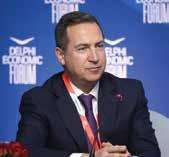


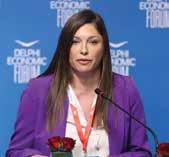
Από την πλευρά του ο κ. Σταμάτης Τσαντάνης, Διευθύνων Σύμβουλος, της «Seanergy Maritime Holdings» στην Ελλάδα επισήμανε ότι σε όλες τις προκλήσεις, είτε είναι κρίσεις, είτε πανδημίες, ακόμα και εμπόλεμες καταστάσεις, η ναυτιλία προσφέρει καλές υπηρεσίες στον κόσμο, εξασφαλίζοντας την απρόσκοπτη μεταφορά πρώτων υλών, ενέργειας, αγαθών, έτσι ώστε ο κόσμος να έχει τη δυνατότητα να συνεχίσει να κινείται. Παράλληλα αναφέρθηκε στην ανάγκη για ενσωμάτωση «επαναστατικών» ιδεών σε επίπεδο ψηφιακού μετασχηματισμού και χρήση των νέων τεχνολογιών. Ο κ. Γιάννης Κοτζιάς, Πρόεδρος στην Ελληνική Ένωση Ναυλομεσιτών & Ιδρυτικός Συνεργάτης, Xclusiv Shipbrokers, στην Ελλάδα, ανέλυσε την προσφορά της ελληνικής ναυτιλίας στην ελληνική οικονομία και την κοινωνία, λέγοντας ότι αποτελεί σημαντικό μέρος της ελληνικής ταυτότητας, που προσφέρει υπερηφάνεια στην χώρα, αλλά και έμπρακτη υποστήριξη. Κάνοντας λόγο για την «ναυτοσύνη» ως βασική αξία των Ελλήνων, πρόσθεσε ότι αυτή προσφέρει μία πολύ δυνατή «φωνή» για την Ελλάδα σε επίπεδο lobbying τόσο σε ευρωπαϊκό όσο και σε διεθνές επίπεδο. Ιδιαίτερη αναφορά έκανε στην προσφορά της ελληνικής εφοπλιστικής κοινότητας σε επίπεδο υποτροφιών αλλά και σημαντικών φιλανθρωπικών ενεργειών. «Η ναυτιλία είναι προσαρμοστική και ανθεκτική. Ξέρουμε να προσαρμοζόμαστε και να αποφεύγουμε κρίσιμες αναταράξεις ακόμα και σε γεωπολιτικό επίπεδο», τόνισε, εκφράζοντας την αισιοδοξία του για το μέλλον.

Την παράμετρο της περιβαλλοντικής βιωσιμότητας στη ναυτιλία ανέλυσε ο κ. Αλέξανδρος Παπαδημητρίου, Υπεύθυνος Στρατηγικής Ανάπτυξης GasLog, επισημαίνοντας ότι 80-90% του παγκόσμιου εμπορίου διακινείται από τον εμπορικό στόλο στις θάλασσες. Αφού ανέλυσε τις εκπομπές διοξειδίου του άνθρακα από τη χρήση του εμπορικού στόλου, τόνισε την ανάγκη για τη θέσπιση ξεκάθαρων όρων σε παγκόσμιο επίπεδο, ενώ αναφέρθηκε στις προκλήσεις για την ανανέωση του στόλου με σύγχρονα πλοία χαμηλών εκπομπών ρύπων.
Την ανάγκη η ναυτιλία να γίνει περισσότερο ελκυστική για τη νέα γενιά, μέσω της εκπαίδευσης και της παιδείας, επισήμανε από την πλευρά του ο κ. Αλέξανδρος Κ. Χατζηπατέρας SEVP Dorian LPG (USA)LLC / MD Dorian LPG Management Corp., στην Ελλάδα, συμπληρώνοντας τις επαγγελματικές δυνατότητες, που προσφέρει η συγκεκριμένη αγορά. Τέλος, έκανε λόγο για την ανάγκη εκσυγχρονισμού του επιπέδου του εμπορικού στόλου αλλά
84 Delphi Forum NAFS | MARCH 2024
η οποία περιέγραψε την αξία της προσφοράς της ελληνικής εφοπλιστικής κοινότητας σε εθνικό και διεθνές επίπεδο. Μιλώντας για την γαλάζια οικονομία, έδωσε ιδιαίτερη έμφαση στην ανάγκη προώθησης της σχετικής εκπαίδευσης και παιδείας, ιδιαίτερα όσον αφορά τη νέα γενιά, προκειμένου ο ελληνικός εμπορικός στόλος να παραμείνει στην κορυφή.
και την αναζήτηση χρηματοδοτήσεων για τον περαιτέρω εκσυγχρονισμό του. Συντονίστρια του πάνελ ήταν η κα Δανάη Μπεζαντάκου, Διευθύνουσα Σύμβουλος, Navigator Shipping, στην Ελλάδα,




C.C.JENSEN A/S +45 6321 2014 www.cjc.dk Replace your Diesel & Lube Oil Purifier with CJC® Tested & approved by Engine Makers CJC® Engine Lube Oil Filter with the patented CJC® Flow Drive for 2- & 4-stroke main & auxiliary engines & CJC® Filter Insert LO4D To learn more, please contact REZA +45 6091 6331 raz@cjc.dk You get: • 97% energy savings • 90% CO₂ savings • Up to 60% less oil consumption • 99% lube oil sludge reduction Local Greek CJC® agent
CMA D . ARGOUDELIS & CO S.A. and TESCOM HELLAS Join Forces
CMA D. ARGOUDELIS & CO S.A, a pioneering force in marine, industry & energy automation, has officially entered into a strategic Memorandum of Understanding (MOU) with TESCOM HELLAS, a renowned manufacturer of voltage stabilization and uninterruptible power systems. This collaboration marks a significant milestone in the advancement of automation solutions within the marine and industrial sectors.
The MOU solidifies a partnership between two industry leaders, poised to provide cutting-edge products and customized solutions to meet the evolving standards of the shipping industry. Under this agreement, CMA D. ARGOUDELIS & CO S.A will serve as a distributor of TESCOM HELLAS products, including UPS, Solar Inverter, Rack Cabinet, AVR, Generators, and their respective solutions, within the marine and industrial markets.
TESCOM HELLAS, a subsidiary of the esteemed DMY Group, has been at the forefront of innovation since its establishment in 2007. With a steadfast commitment to quality craftsmanship and energy efficiency, TESCOM HELLAS offers a comprehensive range of certified solutions designed to ensure the seamless and uninterrupted operation of electrical and electronic installations across domestic, commercial, and industrial applications. Commenting on the partnership, Mr. Ioannis & Nikolaos Argoudelis, Owner and CEO of CMA stated, “We are thrilled to join forces with TESCOM HELLAS to bring forth unparalleled automation solutions to our customers.
By leveraging TESCOM’s expertise in voltage stabilization and uninterruptible power systems, we aim to enhance the efficiency, reliability, and safety of marine and industrial operations.”
Likewise, Christos Mavromatis, General Manager of TESCOM HELLAS expressed enthusiasm for the collaboration, emphasizing their shared commitment to innovation and customer satisfaction.
“This partnership with CMA D. ARGOUDELIS & CO S.A signifies a strategic alignment of our core values and objectives. Together, we will deliver tailor-made solutions that address the unique needs of our customers and propel the industry forward”.

CMA D . ARGOUDELIS & CO S.A. Elevates
Support for HERMES Team at University of Thessaly
as Platinum Sponsor
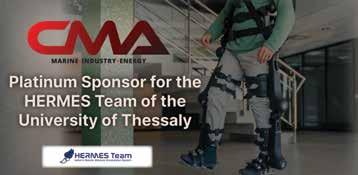
CMA D. ARGOUDELIS & CO S.A., proudly announces its commitment as the Platinum Sponsor for the HERMES Team at the University of Thessaly.Founded in 2018 by members of the IEEE Student Branch of the University of Thessaly and the Student Chapter of IEEE Robotics and Automation of the International Hellenic University, the HERMES Team is currently led by dedicated students of the University of Thessaly. Their mission is focused on continual improvement and technological advancement.
At the core of HERMES’s endeavors is the development of an exoskeleton robotic system for participation in the CYBATHLON 2024 competition. This innovative system aims to empower individuals with disabilities, enabling them to fulfill their basic daily needs with a heightened level of autonomy, thereby en-

hancing both their psychological and physical well-being
The CYBATHLON competition involves various events where participants with disabilities utilize assistive devices to perform fundamental daily functions. The primary objective of CYBATHLON is to champion the use of technology for the betterment of individuals’ lives. Given the demanding nature of implementing such a system, requiring expertise and specialized materials, CMA D. ARGOUDELIS & CO S.A. has chosen to play a pivotal role by stepping in as a Platinum Sponsor of the HERMES Team
“We are excited to embark on this journey with the HERMES Team and contribute to their vision,” stated Mr. Ioannis & Nikolaos Argoudelis, Owner and CEO of CMA. “Our partnership aims not only to provide financial support but also to foster collaboration through scheduled training seminars. These sessions will empower our team to delve into the intricacies of these cutting-edge technologies, propelling us collectively towards making significant strides in the field. Additionally, we plan to organize joint events aligned with the shared purpose of advancing assistive technologies.”
CMA believes that through this collaboration, they will not only make a positive impact on the HERMES Team’s objectives but also contribute to the broader mission of leveraging technology for the betterment of society
86 Ναυτιλία NAFS | MARCH 2024

Γ. Ξηραδάκης: Χρειάζεται επαναδραστηριοποίηση των ξένων τραπεζών στην Ελλάδα
Από αριστερά: Βασίλης Μαντζαβίνος (Αντιπρόεδρος Α), Κώστας Οικονόμου (Γενικός Γραμματέας) Timothy McNally (Economic Officer), Κωνσταντίνος Κωνσταντόπουλος (Economic Specialist), Eric Holmgren (Economic Counselor), Κώστας Ιωάννου (Αν. Γεν. Γραμματέας), Γιώργος Ξηραδάκης (Πρόεδρος), Γιώργος Λάιος (Αντιπρόεδρος Β),Κατερίνα Φίτσιου, (Ταμίας,) Κρυσταλλία Μαρκάκη (Μέλος Δ.Σ.)

“Διανύουμε την πρώτη δεκαετία χωρίς την παρουσία Αμερικανικών τραπεζών στον Πειραιά σε μία περίοδο που η Ελληνική ναυτιλία αναπτύσσεται ραγδαία, τόσο σε αριθμούς όσο και σε ποιότητα, γεγονός που δικαιολογεί τη στήριξή της από τη διεθνή τραπεζική αγορά” δήλωσε μεταξύ άλλων ο Γιώργος Ξηραδάκης, Πρόεδρος της Ένωσης Τραπεζικών και Χρηματοοικονομικών Στελεχών Ελληνικής Ναυτιλίας
Ο Γιώργος Ξηραδάκης τόνισε για ακόμα μια φορά την ανάγκη της επαναδραστηριοποίησης στην Ελλάδα των ευρωπαϊκών και αμερικανικών τραπεζών καθώς η χώρα με τον ιδιαίτερο ρόλο του Πειραιά αποτελεί ναυτιλιακό κέντρο της ελληνικής και της διεθνούς ναυτιλίας.
Το Διοικητικό Συμβούλιο της Ένωσης Τραπεζικών και Χρηματοοικονομικών Στελεχών Ελληνικής Ναυτιλίας συναντήθηκαν την Τετάρτη 21/2/2024 με τους κ.κ. Eric Holmgren-Economic Counselor, Κωνσταντίνο Κωνσταντόπουλο-Economic Specialist και Timothy McNally-Economic Officer από την Αμερικανική Πρεσβεία στην Ελλάδα σε γεύμα εργασίας. Ο πρόεδρος της Ένωσης κ. Γιώργος Ξηραδάκης κάνοντας μια αναδρομή στη χρηματοδότηση της Ελληνικής ναυτιλίας αναφέρθηκε στις ισχυρές σχέσεις με τις Αμερικανικές τράπεζες που ήταν από τις πρώτες ξένες τράπεζες οι οποίες είχαν ανοίξει υποκαταστήματα στην Ελλάδα και στήριξαν τον κλάδο από τη δεκαετία του 1960. Διανύουμε την πρώτη δεκαετία χωρίς την παρουσία Αμερικανικών τραπεζών στον Πειραιά σε μία περίοδο που η Ελληνική ναυτιλία αναπτύσσεται ραγδαία, τόσο σε αριθμούς όσο και σε ποιότητα, γεγονός που δικαιολογεί τη στήριξή της από τη διεθνή τραπεζική αγορά. Οι συνθήκες είναι πολύ διαφορετικές πλέον για έναν επιπρόσθετο λόγο, ότι η Ελλάδα ανέκτησε την επενδυτική βαθμίδα για την οποία τόσο η πολιτική ηγεσία όσο και ο λαός εργάστηκαν σκληρά. Έτσι πλέον, υποστήριξε ο κ. Ξηραδάκης δεν υπάρχει κανένας λόγος ώστε οι ξένες τράπεζες και δη οι Αμερικανικές να μην έχουν φυσική παρουσία στη χώρα.
Η συζήτηση επεκτάθηκε στις νέες μορφές χρηματοδότησης που έχουν αναπτυχθεί κυρίως από την εφαρμογή των κανονισμών ESG

και ETS και τις επιδράσεις στην Ευρωπαϊκή ναυτιλία καθώς και την ανάπτυξη των Κινεζικών εταιριών leasing. Ο οικονομικός ακόλουθος κ. Eric Holmgren αναφέρθηκε στους στενούς δεσμούς της Ελληνικής ναυτιλίας με την Αμερική τόσο σε επίπεδο επενδυτικό, κυρίως μέσω των Αμερικανικών χρηματιστηρίων όσο και σε επίπεδο συνεργασίας των δύο εθνών στα διεθνή φόρα σε θέματα περιβαλλοντικού και τεχνικού ενδιαφέροντος.
Ο ιδιαίτερος ρόλος του Πειραιά ως ναυτιλιακού κέντρου και της Ελληνικής ναυτιλίας ως διεθνούς δύναμης θαλασσίων μεταφοράς δικαιολογεί πλήρως την ολιστική συνεργασία με τη μεγαλύτερη οικονομία του πλανήτη και ως εκ τούτου την επαναδραστηριοποίηση των χρηματοδοτών των ΗΠΑ στην Ελλάδα τόνισε ο κ. Ξηραδάκης.
Είναι γεγονός ότι η Ελληνική ναυτιλία είναι ο παραδοσιακός μεταφορέας φορτίων ενέργειας από και προς τις ΗΠΑ και βέβαια ο ρόλος της αναβαθμίστηκε πλήρως με την αλματώδη αύξηση του στόλου των πλοίων μεταφοράς φυσικού αερίου (LNG) αλλά και τις μονάδες υγροποίησής του (FSRU).
Επίσης συζητήθηκε το θέμα της ελεύθερης ναυσιπλοΐας στην Ερυθρά Θάλασσα και της περιορισμένης δυνατότητας διελεύσεων από τη Διώρυγα του Παναμά, δύο εξελίξεις που επηρεάζουν τη ναυτιλιακή οικονομία και κατ’ επέκταση την παγκόσμια οικονομία. Οι Αμερικανοί διπλωμάτες συμφώνησαν στην αναγκαία συνύπαρξη
88 Ναυτιλία NAFS | MARCH 2024
να
οικονομικές
πολιτικές επιπτώσεις. Συμφωνήθηκε επίσης οι δύο πλευρές να συνεργαστούν στις διάφορες εκδηλώσεις κατά την περίοδο της έκθεσης των Ποσειδωνίων 2024.
προκειμένου
περιοριστούν οι
και

Ο Όμιλος ERMA FIRST φιλοξενεί την πρώτη ετήσια συνάντηση των αντιπροσώπων στην Αθήνα
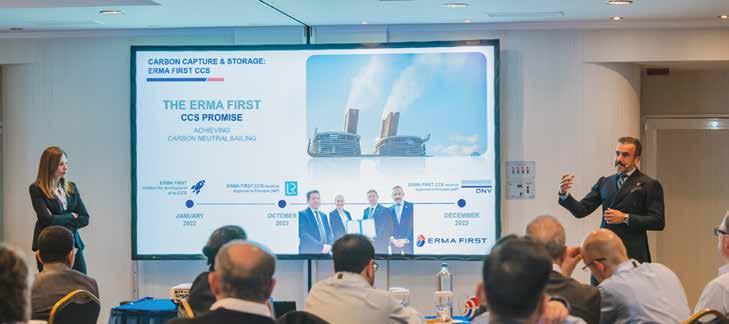
Την νέα ταυτότητα της ERMA FIRST, που αφορά την μετάβαση από μια εξειδικευμένη εταιρεία σε έναν διεθνή πάροχο βιώσιμων λύσεων για τη ναυτιλία, μεταλαμπάδευσαν τα στελέχη της εταιρείας σε συνεργάτες και αντιπροσώπους από 24 χώρες, που συγκέντρωσαν την προηγούμενη εβδομάδα στην Αθήνα. Από την εξειδίκευση στα συστήματα επεξεργασίας έρματος, όπου κατέχει ηγετική θέση σε παγκόσμιο επίπεδο, η ERMA FIRST πραγματοποιεί δυναμικό άνοιγμα με μια γκάμα προϊόντων που έχουν ως στόχο να ενισχύσουν την προσπάθεια της ναυτιλιακής βιομηχανίας να πετύχει την «πράσινη μετάβαση».
Ανταποκρινόμενη στις απαιτήσεις των πελατών της έχει αναπτύξει και προσφέρει ένα πλήρες και κορυφαίο χαρτοφυλάκιο για την απανθρακοποίηση της ναυτιλίας. Πρόκειται για τα συστήματα BLUE CONNECT (Alternative Maritime Power), FLEXCAP (Energy Saving Devices) και CCS (Carbon Capture & Storage).
Η νέα πορεία που χαράσσει η ERMA FIRST αναμένεται να ενισχύσει περαιτέρω την εξωστρέφειά της. Τόσο τα συστήματα BTWS όσο και τα νέα συστήματα, θα τονώσουν ακόμα περισσότερο το εξαγωγικό «αποτύπωμα» της εταιρείας τα επόμενα χρόνια, ενισχύοντας παράλληλα και την ελληνική οικονομία. Στο πλαίσιο αυτό, συνεργάτες από τις 5 ηπειρους βρέθηκαν τις προηγούμενες ημέρες στην Αθήνα και συζήτησαν τόσο για την επιτυχία που έχουν καταγράψει τα προηγούμενα χρόνια, αλλά και για τα μελλοντικά σχέδια του ομίλου, που σχεδιάζονται πάντα με γνώμονα τις απαιτήσεις του γρήγορα μεταβαλλόμενου χώρου της ναυτιλίας.
Ο κος Κωνσταντίνος Σταμπεδάκης, Συνιδρυτής και Διευθύνων Σύμβουλος της ERMA FIRST, δήλωσε: «Είμαστε ενθουσιασμένοι που φιλοξενήσαμε για πρώτη φορά μια συνάντηση αυτού του μεγέθους με όλους τους συνεργάτες και αντιπροσώπους της ERMA FIRST, συγκεντρώνοντάς τους, στον τόπο μας, την Αθήνα. Γεγονός

που επιβεβαιώνει το εξαγωγικό DNA της εταιρείας, αφού στις εξαγωγές βασίζουμε άνω του 80% του κύκλου εργασιών μας. Τα τελευταία χρόνια μάλιστα από ειδικούς στη διαχείριση θαλασσίου έρματος έχουμε εξελιχθεί σε πάροχο βιώσιμων ναυτιλιακών λύσεων. Η δέσμευσή μας στον τομέα του BWTS παραμένει ισχυρή, αλλά παράλληλα συνεχίζουμε να αναπτυσσόμαστε παρέχοντας νέα προϊόντα και υπηρεσίες που ανταποκρίνονται στις ολοένα και περισσότερο εξελισσόμενες απαιτήσεις των πελατών μας»
Η κα Ελένη Πολυχρονοπούλου, Πρόεδρος της ERMA FIRST, πρόσθεσε: «Για πρώτη φορά στον τομέα του ναυτιλιακού εξοπλισμού, ελληνική εταιρεία καταφέρνει να διοργανώσει διεθνή συνάντηση συνεργατών, από 24 χώρες, στην Ελλάδα. Μέσα σε 14 χρόνια πετύχαμε να αναγνωριστούμε ως μια από τις κορυφαίες εταιρείες στον κλάδο μας. Και το πετύχαμε βασιζόμενοι στην έρευνα και ανάπτυξη στην οποία επενδύσαμε, την ποιότητα κατασκευής, αλλά και στην δυναμική του ελληνόκτητου στόλου. Των ελληνικών ναυτιλιακών εταιρειών που αναγνωρισαν την αξία και την ποιότητα των προιόντων μας , τα εγκατέστησαν στα πλοία τους ενώ απαίτησαν από τους ναυπηγικούς ομίλους Ασίας να δεχτούν τις ελληνικές εταιρείες του κλάδου στις λίστες κατασκευαστών. Η συνάντηση αυτή αποτελεί μια ένδειξη ότι
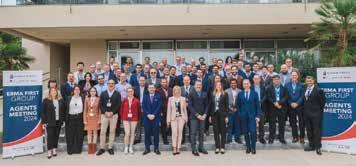
ολοκληρώσαμε έναν πρώτο πολύ επιτυχημένο
και ανοίγουμε, με την
Ναυτιλία NAFS | MARCH 2024
σαν όμιλος
κύκλο
ίδια όρεξη και δημιουργικότητα, έναν δεύτερο». 90

For all your afloat ship repairs, 24/7:
• Steel repair
• Pipe fitting
• Winches & cranes
• Engine mechanics
• Pumps & valves
• Refrigeration
• Electricals
• Hydraulics
• Cargo securing
• ... “

Navitec is
roadside
in Belgian
and
with a lightning
NAvITEC Always there Emdenweg 17 2030 Antwerp Belgium +32 3 542 31 31 info@navitec.be www.navitec.be Euploia Drydocks and Services Ltd is our Exclusive Agent in Greece Contact: Charis Valentakis +30 210 9400660, info@euploia.eu
the
assistance
ports
beyond,
fast response 24/7, all year round.”
HD Hyundai Marine Solution partners with Accelleron to pioneer Ship Engine Optimization
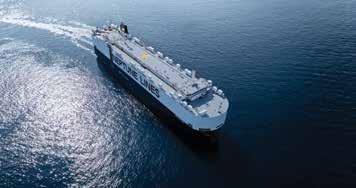
Caption: HD Hyundai Marine Solution and Neptune have signed a contract for Engine Part- Load Optimization.
HD Hyundai Marine Solution has signed an agreement with Greek operator Neptune Lines Shipping and Managing Enterprises SA to provide Engine Part Load Optimization (EPLO) services for four car carriers.
HD Hyundai Marine Solution partnered with Accelleron to launch the EPLO service, receiving the first order for one ship in October last year.Most marine engines are built to provide optimal fuel effi-
ciency and performance for the speed and environment for which the ship is designed. However, more than 60 percent of the world’s ships of 400 gross tons (GT) and above are required by the International Maritime Organization (IMO) to comply with the IMO’s Energy Efficiency Existing Ship Index (EEXI) and Carbon Intensity Indicator (CII) regulations to reduce greenhouse gas emissions.
As a result, many shipping companies are considering engine power limitation, operating at reduced speeds with engine output reduced by up to 70%. EPLO is an eco-friendly solution that increases combustion efficiency by matching the turbocharger to the new load requirements, as well as adjusting factors including the amount and timing of fuel injection and fuel-air mixture ratio. These adaptions can improve fuel efficiency by as much as 6 grams per kWh, with an equivalent reduction in carbon emissions.
“With EPLO, Accelleron is assisting the maritime industry to not only boost the competitiveness of their vessels but also to achieve profitable navigation towards their mid-term decarbonization goals,” said Matthias Reichmann, Global Product Manager Upgrades at Accelleron.An official from HD Hyundai Marine Solution said: “We will contribute to carbon reduction activities in both the shipbuilding and maritime sectors with various eco-friendly solutions that meet market needs.”
INTERCARGO and RightShip launch Dry Bulk Centre of Excellence
RightShip, the leading global ESG focused digital maritime platform, and INTERCARGO, the International Association of Dry Cargo Shipowners, proudly launch the Dry Bulk Centre of Excellence (DBCE), an independent, not-for-profit industry organisation dedicated to the administration of the Dry Bulk Management Standard (DryBMS) framework. DryBMS was developed by INTERCARGO and RightShip, with input from experts and stakeholders across the sector, as an industry tool to raise standards and best practices across safety, security, environmental performance, and social welfare in the dry shipping sector. INTERCARGO and RightShip have worked closely to establish the DBCE to further evolve and disseminate the DryBMS framework. An independent, not-for-profit organisation entirely separate from its founding organisations, DBCE will be run by an independent management team and will adopt a governance model convened from ship owners, managers, and charterers. This will foster greater cooperation and collaboration between key stakeholders and achieve the common purpose of improving standards and driving operational excellence via active industry participation. The DBCE Board of Directors will be chaired alternatively by representatives from the community of ship owners/ ship managers and charterers and will have representation from RightShip, INTERCARGO and other industry stakeholders creating a truly collaborative industry initiative. The DryBMS framework will continue to be accessible to the industry, and, from May 2024, DBCE will maintain a secure portal where ship owners and managers can complete digital self-assessment against the DryBMS framework. Ship owners and managers will then have the optional ability to share the results of their self-assessments with their charterer customers. In addition, DBCE will establish an inde-

pendent self-assessment audit verification process for evaluating and verifying actual performance against self-assessments. DBCE will accredit independent auditors to its defined standard, whom companies may engage to perform audits of their self-assessments in their respective ship management offices. DBCE will be led by a newly appointed managing director, Ian McLeod, who commented, “I am delighted to be driving this new initiative. The launch of the DBCE is the next step for the industry in going beyond compliance and achieving excellence, with the support of the DryBMS framework. The welfare of crew, protection of the environment, and sustainable operation of assets form the bedrock of this initiative, all of which encourage companies towards better operational practices. This benefits not just ship owners, but all in the industry. We urge ship owners, managers, and other stakeholders across the sector, to use this tool and to join us on this transformative journey to make dry bulk shipping stronger, safer, and more sustainable.” Steen Lund, RightShip’s CEO, stated “It is exciting to be part of a such an important endeavour in lifting standards across dry bulk shipping. DBCE is more than just an administrator for the DryBMS standard; it is a catalyst for collaboration and proactive engagement across the sector. This launch can’t come at a more crucial time –ship owners and managers must be given the resources they need to achieve excellence and strive for zero harm.” Dimitris Fafalios, Chairman of INTERCARGO, said “We are collaborating in a scheme that is being developed by the industry and for the industry, which will administer a truly robust standard with the help and expertise of those that the industry relies upon to implement and support it. DBCE’s independence is crucial, ensuring the organisation always works for the benefit of the dry bulk industry as a whole.”
92 Ναυτιλία NAFS | MARCH 2024

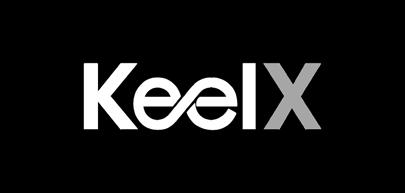

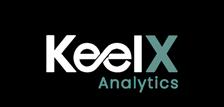


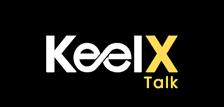
WE HELP SHAPE THE FUTURE OF DIGITAL TECH IN SHIPPING Shipping 4.0 www.keelx.com AI Voyage Optimization Fleet Performance Monitoring CII Analytics Sustainable Profitability Fuss-free UX Instant Messaging Crew Wellbeing Whistleblowing Reemployment Anonymity Option Dry Cargo Handling E-Courses Easy-to-Watch Interactive Features Accessible on Major Maritime LMS Endoresed by P&I Clubs Deep Learning Maritime Technologies Advancing Shipping Knowledge Seafarers' Voice
Posidonia 2024 marks the rebirth of the Greek shipbuilding industry

Greece’s revitalised shipbuilding industry will be prominently represented during Posidonia 2024, signalling a strong recovery following decades of decline and disrepair. The sector’s Greek renaissance is on the cards after the completion of the consolidation of the country’s shipbuilding units in Syros and in Elefsina, and also due to the restart of Skaramangas shipyard and the increased activity in Halkida.
Neorion Shipyard in Syros and Elefsis Shipyard have repaired over 500 ships, foreign and Greek-owned, since the New York-based ONEX Shipyards and Technologies group took over their operations in 2019. Combined with further domestic output from other ship repair and shipbuilding operations, Greece is now seen as an important contributor to European shipyards’ annual production value of around €43 billion, which comprises a collective civil and naval orderbook value that surpasses that of their Asian counterparts.
“Greece is resurfacing as a credible shipbuilding cluster for vessel repair, conversion and potentially for the construction of newbuildings for Greek and international shipowners and naval forces. This revival follows decades of underperformance and underinvestment, marked by the absence of a strategic vision,” said Theodore Vokos, Managing Director, Posidonia Exhibitions S.A., the organiser of the world’s most prestigious shipping exhibition.
Through a slate of strategic partnerships and multimillion investments, Greek shipyard operators and the Greek government are making a statement of their long-term commitment to a sector estimated to currently account for 1% of the nation’s GDP. The sec-

tor’s revival will further strengthen both the country’s economy and security. Partnerships will amongst others include naval projects, as the Greek government discusses with the US the joint design and co-production of the new generation of Constellation frigates, while increased activity in the shipyards will empower and support Greek maritime equipment manufacturers, further enhancing Greece’s contribution to Europe’s 50% market share and global dominance in marine equipment manufacture and supply.
Ahead of Skaramangas Shipyards’ comeback to the Posidonia Exhibition, recently appointed Chairman Miltiadis Varvitsiotis has stated his lofty ambitions to transform the facility into a multi-million contract-winning operation capable of capturing a share of the action. He said: “Since 2010, the shipyard was exclusively involved in the repair, maintenance, and upgrade of the Hellenic Navy’s fleet. Now, with new ownership and management, we are ready to present our world-class infrastructure and state-of-the-art equipment for heavy and specialised repairs. We are going to promote our future plans and explore the possibilities of undertaking important and sophisticated new building projects.”
The company intends to make full use of the existing infrastructure comprising some of the largest drydocks in the Mediterranean, capable of drydocking VLCC, LNG carriers and aircraft carriers. Skaramangas has been investing in the gradual upgrading of facilities, strengthening fire safety and firefighting systems, and re-operating a large tank that has been inactive for about 20 years.
In general, Greek shipyards are investing in areas designed to
94 Posidonia 2024 NAFS | MARCH 2024
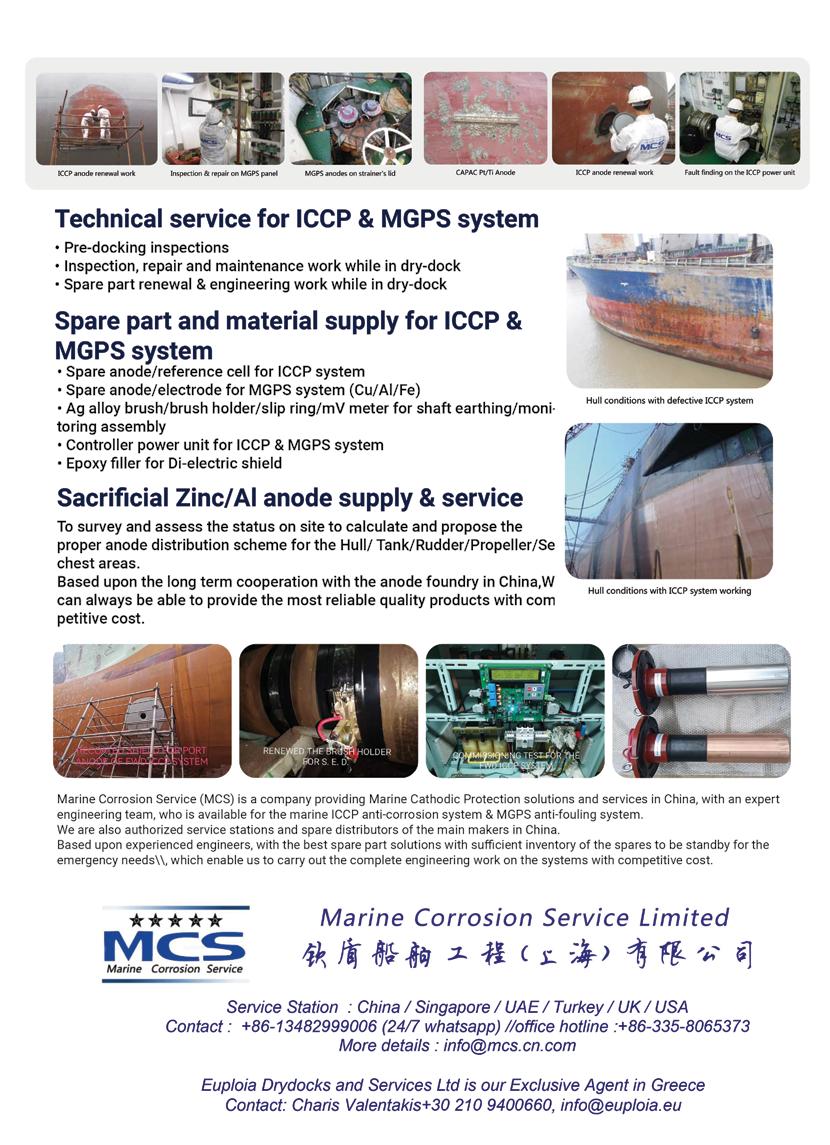

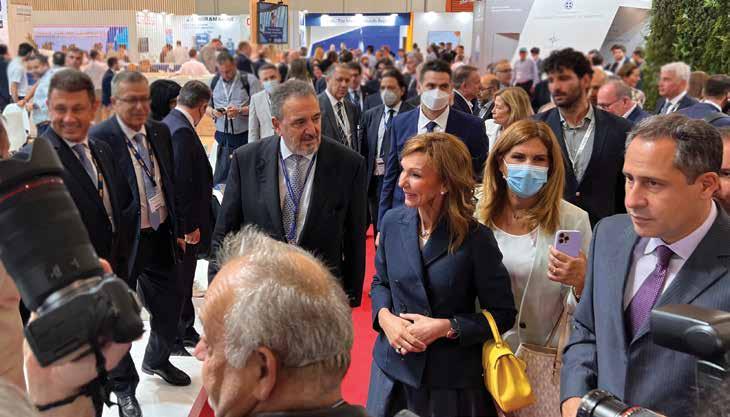
improve their competitiveness and attractiveness, mainly to Greek shipowners who currently contribute 80% of Greek ship repair and new build activity. The ONEX group’s business plan includes investments worth $550m for the shipyards with the goal of boosting repair operations to 300 vessels per year.
Panos Xenokostas, President & CEO, ONEX, said: “Our goal is to transform the historic shipyards into a modern maritime hub for the greater Mediterranean region. We aspire for both Elefsis and Syros Shipyards to become the first choice of those seeking quality, speed, and personalised service, while adhering to relevant security protocols and always taking into consideration the transition to a sustainable maritime model.”
ONEX aims to transform its shipyards into a hub supporting commercial shipping horizontally, energy transition, defense platforms, and industrial solutions, leading the entire industrial ecosystem of the region and strengthening both the economy and the geopolitical position of Greece.
At the same time, Chalkis Shipyard is investing in the installation of photovoltaic systems to power shipyard needs and those of vessels either berthed or docked at its facilities and is proceeding with infrastructure works for newbuilding capabilities of specialised vessels up to 100m in length. Its goal is to expand operational capabilities to about 240 vessels annually, serve ships of larger capacity, and build small ships with new technology. “In addition, we have trained our personnel and keep investing in a skilled workforce who can install green energy systems like scrubbers and new technology propulsion systems on vessels. In the last years we have completed the installation of scrubbers in a number of vessels,” said Ashraf Bayoumi, CEO, Chalkis Shipyards, which is preparing for its eight Posidonia Exhibition participation.
Furthermore, private and institutional investors are seeing the opportunity presented by Greece’s geographic location, maritime heritage, commitment of the Greek ship owning community, and po-

litical will to fund the sector. The recent acquisition of Skaramangas’ by shipowner George Prokopiou and the US International Development Finance Corporation’s $125m loan to Elefsis Shipyards and Industries (ONEX) demonstrate strong investor interest in the Greek shipbuilding sector.
As advancements in maritime technologies gather pace, Greek shipyards have an opportunity to adopt and seamlessly integrate new Artificial Intelligence, Green Energy and Automation Innovations across their operational capabilities to introduce efficiencies, further improve productivity, enhance appeal, and strengthen their orderbooks.
Chalkis Shipyards is already applying new technologies and using digitalisation in programmes related to design for repairs, new constructions, and Customer Relations Management (CRM) platforms. It is implementing 3D model programmes with the relevant equipment in which it is investing, while seeking new ways to introduce AI across the business to optimise operations and automate tasks.
Skaramangas is involved in emission-reducing technologies and scrubber installation, while exploring potential synergies for the development of new ship designs incorporating the new generation of green fuels.
“A strong shipbuilding sector creates the conditions for upgrading national defence, contributes decisively to the national economy and the green transition and strengthens Greece’s position in the regional geopolitical arena through the implementation of major projects with international significance,” said Xenokostas.
Over 85 shipyards from 26 countries have already confirmed their participation in Posidonia 2024, which will take place from June 3-7 at the Athens Metropolitan Expo.
Posidonia 2024 is organised under the auspices of the Ministry of Maritime Affairs & Insular Policy, the Hellenic Chamber of Shipping, and the Union of Greek Shipowners, and with the support of the Municipality of Piraeus and the Greek Shipping Co-operation Committee.
NAFS | MARCH 2024
96 Posidonia 2024
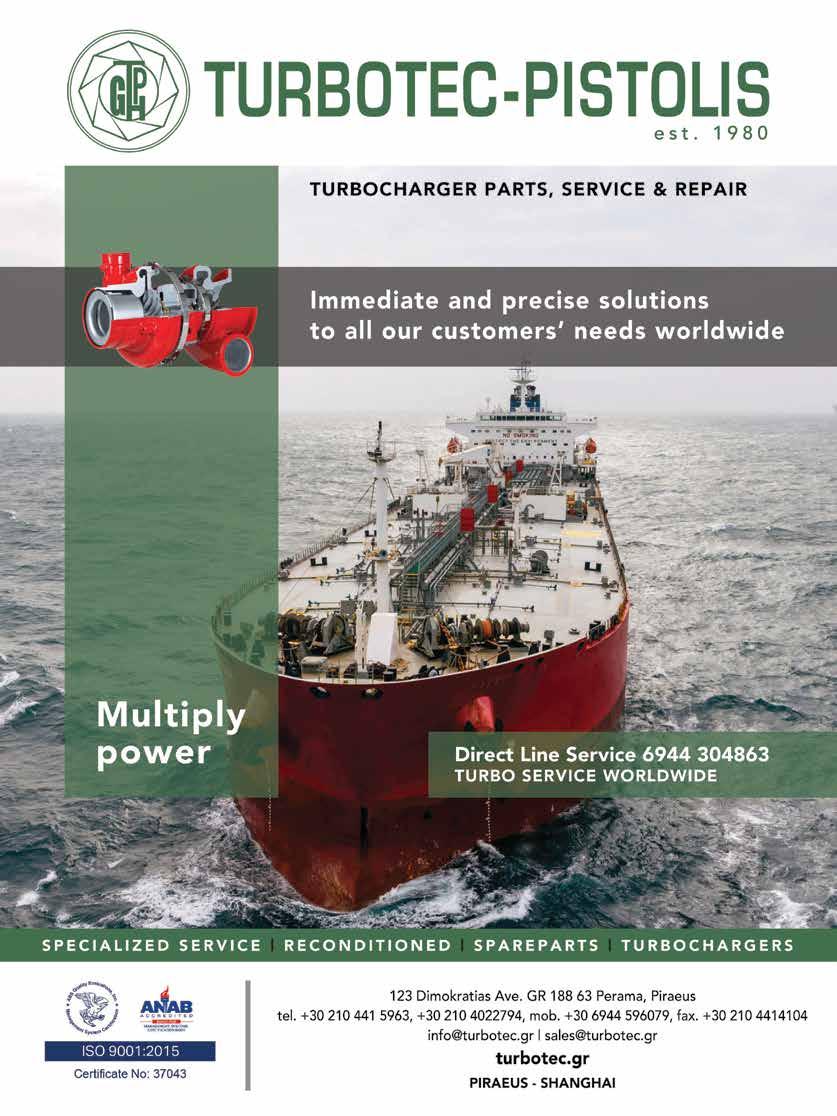
Posidonia 2024 Exhibitors anticipate paradigm shift in Maritime Industry as AI gains traction
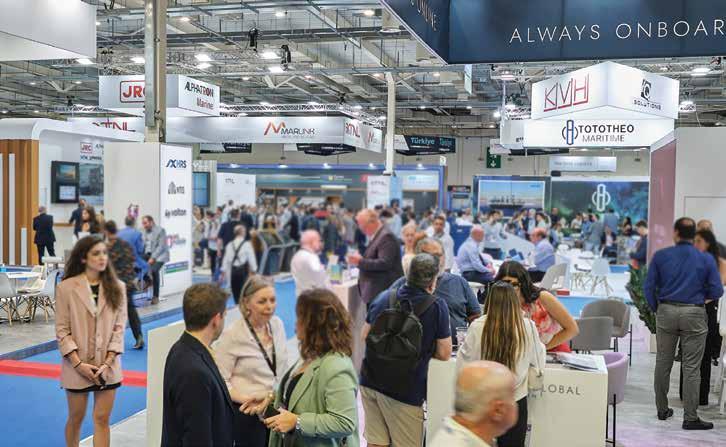
The maritime industry, often viewed as conservative and measured in its approach to technological integration, is on the cusp of a transformative era with Artificial Intelligence (AI) emerging as a prominent player. Insights from key exhibitors at the upcoming Posidonia Shipping Εxhibition reveal a new landscape, where industry leaders strategically align with the inexorable rise of AI and consider adopting it already.
According to Theodore Vokos, Managing Director, Posidonia Exhibitions S.A., demand for space from advanced technology and innovation companies providing services to the shipping industry has risen significantly for this summer’s edition of Posidonia, which will be held at the Athens’ Metropolitan Expo Centre from 3 to 7 June.
He said: “A comprehensive report on the future landscape of AI in the maritime sector, titled ‘Out of the box’ and produced by Lloyd’s Register and maritime innovation consultancy Thetius, indicates that the market for AI-driven systems and vessel autonomy is anticipated to achieve a collective value of $5 billion by 2028. According to the report, presently there are already 276 active companies identified in the maritime AI segment. The report underscores the significance of proactive investment by maritime organisations in enhancing their comprehension of AI across various levels. It recommends a strategic focus on workforce education and training initiatives to augment awareness of safety measures and regulations pertinent to advanced technologies within the maritime domain.”
EMMIS MARINE S.A., an industrial manufacturer of premium elec-

trical supply and control solutions, signifies a broader industry sentiment. Andreas Miserlis, Owner & CEO, emphasises the industry’s advanced technological standing, where AI is recognised as pivotal in addressing current challenges. Miserlis articulates a proactive stance, with plans to incorporate AI into research and development, aligning technology with industry needs. “AI stands at the forefront of meeting the technological demands of the maritime industry. Our commitment to incorporating AI into our R&D department and production lines reflects our proactive approach to staying ahead in the era of digital transformation,” he said.
The maritime manufacturing sector in general, also exemplified by Captain Nemo, foresees rapid AI adoption. The emphasis on data analysis and project development reflects a keen awareness of AI’s potential to streamline processes and drive innovation. “With early AI projects already underway, we look forward to incorporating AI in data analysis, automating standards, and developing new projects within the maritime manufacturing sector,” said Merkouris Panoutsopoulos, CEO of the company which is preparing for its third consecutive participation at Posidonia.
But the adoption of AI is not only limited to the manufacturing sector, but is also rapidly embraced in the services sectors.
According to Bureau Veritas, “AI is already being adopted by the shipping industry. AI investment rates leave little doubt AI is becoming a key enabler in the digitalisation of the shipping industry, offering benefits such as reduced costs, less risk, reduced emis-
2024 NAFS | MARCH 2024
98 Posidonia
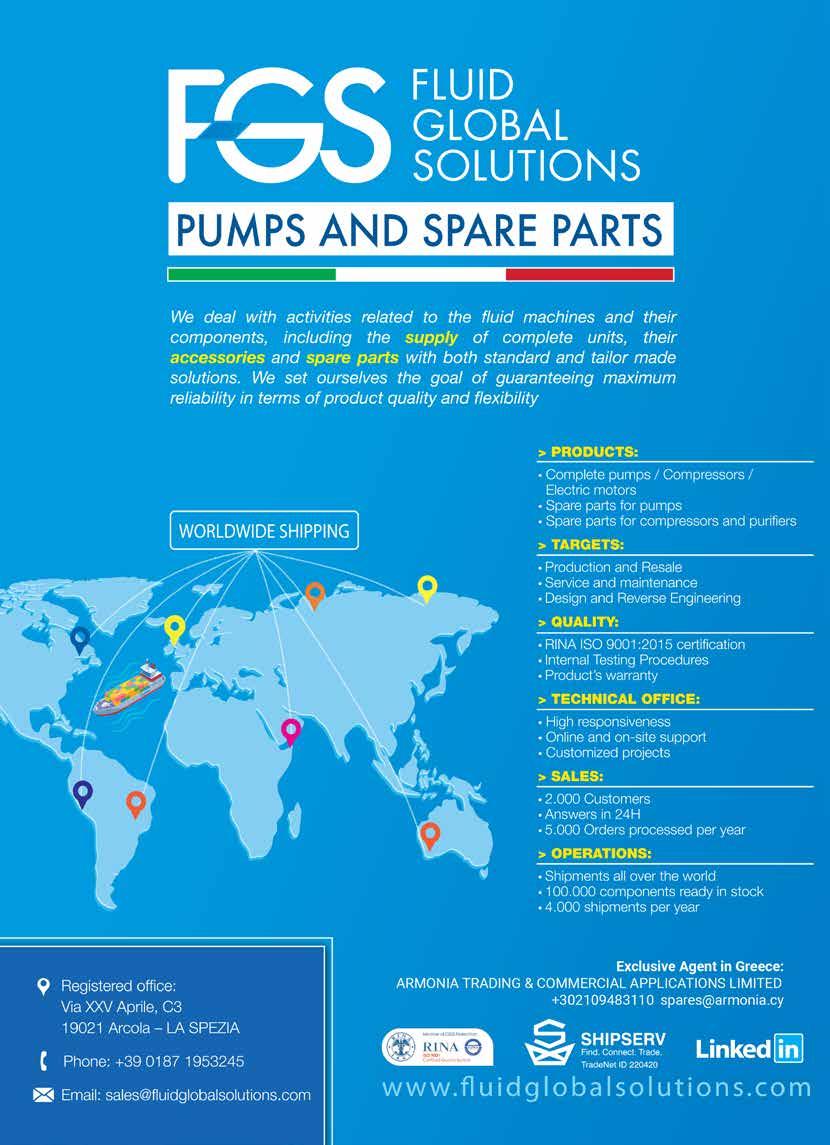

sions, improved forecasting, and faster deliveries through optimised routes. As a class society we are using AI to help make our work – and shipping – safer and more efficient.’ said Laurent Hentges, Vice-President, Digital Solutions and Transformation. As a classification society, BV is leveraging data and AI to optimise its operating modes and services to clients. More specifically, AI supports operations in going from fully physical surveys on board a vessel to partly remote and partly augmented surveys, by leveraging data to build over time optimised and predictive survey schemes, by combining data extraction techniques such as OCR with Robotics Process Automation to gain internal efficiency in their processes, and by enabling Generative AI (LLM Large Language Model), hence building chatbots, which help in responding to client technical queries and provide a quicker and better service.
Verifavia, a company specialising in marine surveying services and auditing, already navigates the challenges and promises of AI. The company believes that AI brings exciting possibilities to shipping, improving navigation, predictive maintenance and compliance. Notably, the company emphasises responsible AI usage, weaving sustainability into the narrative. “At Verifavia, we are using AI where it matters most, especially in voyage optimisation, data quality enhancements and carbon market transparency. We’re all about responsible AI, ensuring our solutions contribute to a sustainable future,” said Nicolas Duchene, President.
Governmental ship registry services, as embodied by San Marino Ship Register, foresee AI expediting administrative processes and envision that AI will help accelerate ship registration, a testament to the pragmatic applications of AI beyond operational realms. “AI will soon be applied to speed up the process of ship’ registration, bringing efficiency to administrative functions within the maritime sector,” said Gianluca Tucci, General Director of the new Registry, which will leverage its participation at Posidonia 2024 to launch its

merchant vessel offering.
AI also plays a role in the peripheral services sector of the marine industry, aiding marine travel management companies, like GMT Greece, in predicting travel movements for cost-saving benefits. Additionally, vessel cleaning companies, like Greensea IQ, utilise small robots equipped with AI to enhance the prediction of cleaning routines, enabling more efficient and faster hull cleaning services.
But every revolutionary change has to be approached with care, and companies like N. Bogdanos Marine Bureau Ltd bring a sober perspective to AI in shipping. Adamantios Papapetros, Vice President & CEO, highlights the industry’s historical prudence, which will wait for AI technology to be further tested before fully embracing it and applying it on ships. “Shipping historically waits for proven results before adopting new technologies. Applications like unmanned navigation are still away from being applied, however, the lack of skilled seamen will accelerate the introduction of similar applications.” he said.
Drawing from these industry insights and considering broader trends in maritime technology, the future of AI in shipping appears dynamic and transformative. As the industry navigates towards digital maturity, AI is set to play an increasingly pivotal role in optimising operations, ensuring safety, and steering the sector towards a sustainable and technologically advanced future. The Posidonia Shipping Exhibition stands as a testament to the industry’s collective recognition of AI’s potential, marking the dawn of a new era in maritime innovation.
Posidonia 2024 is organised under the auspices of the Ministry of Maritime Affairs & Insular Policy, the Hellenic Chamber of Shipping and the Union of Greek Shipowners and with the support of the Municipality of Piraeus and the Greek Shipping Co-operation Committee.
100 Posidonia 2024 NAFS | MARCH 2024
Ballast Water Management System
TeamTec Senza BWMS
• No filter!
• No minimum pressure required
• 100% flow rate in all ports
• 7kW power consumption no matter what equipment size
• USCG & IMO APPROVED
• Only minor modifications to the ballast piping are needed to retrofit Senza BWMS
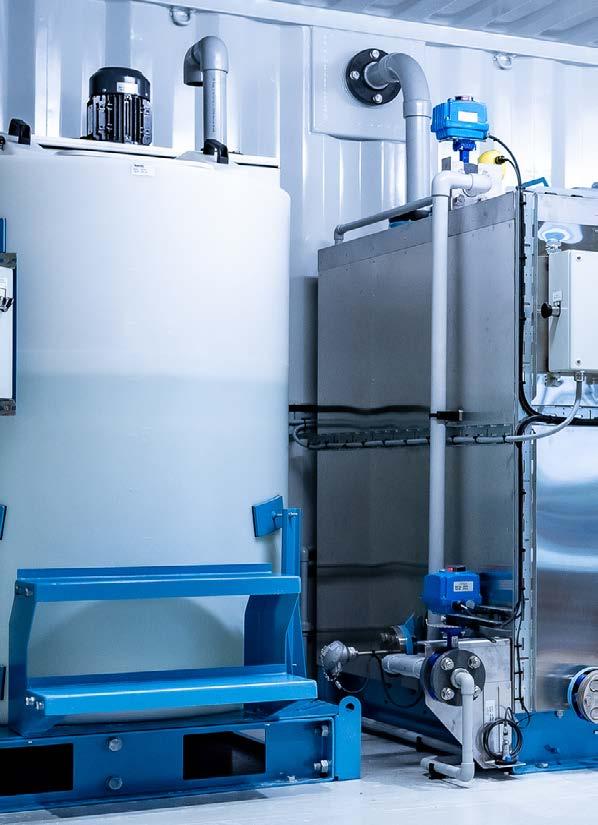
Contact us
BWMS@teamtec.no
teamtec.no TeamTec AS | Nyvei 41 | N-4902 Tvedestrand | NORWAY
Grand Opening of Jotun’s Performance Coatings store at Vanos Premises in Perama


Jotun, one of the world’s leading paints and coatings manufacturers, proudly announces the grand opening of its first retail Jotun Performance Coatings store in Greece, located at the prestigious Vanos S.A. premises in Perama. This groundbreaking initiative marks a significant milestone in Jotun’s expansion strategy, which aims to provide unparalleled service and innovative solutions.
Situated at the esteemed Vanos S.A., this new facility signifies a strong collaboration between Jotun and Vanos S.A., reflecting their shared commitment to innovation and customer service. The store features state-of-the-art facilities and is equipped with the latest technology, including an advanced Multicolor automatic color tinting machine (MCI), ensuring customers access cutting-edge coating solutions. Jotun’s automatic color tinting machines are uniquely designed so retailers can mix thousands of custom colors for customers in the store. With the inclusion of the MCI machine, customers who visit the Jotun store at Vanos S.A. can now benefit from enhanced efficiency and convenience in accessing Jotun’s comprehensive range of performance coatings.
The partnership between Jotun and Vanos S.A. is built on a shared vision of providing quality products and services that exceed customer expectations. With the grand opening of this new store, both companies look forward to further strengthening their cooperation.
For more information about Jotun and its solutions, please visit www.jotun.gr.
HELMEPA strengthens bonds with US Coast Guard and Maritime Leaders in Washington DC
The largest ever HELMEPA Members Delegation traveled to the US and engaged in a series of productive meetings with the leadership of the United States Coast Guard, NAMEPA, and other stakeholders in Washington DC to advance pollution prevention, safety at sea, and sustainable development in the era of maritime decarbonization.
Led by HELMEPA Chairperson Semiramis Paliou, and joined by Board Members Maria Hajioannou, Panos Zachariadis, and Theodosis Stamatelos, the HELMEPA Delegation comprising 24 representatives from 20 member companies convened with US Coast Guard leadership including Rear Admiral Wayne Arguin, USCG Assistant Commandant for Prevention Policy, Mr. Jeffrey Lantz, Director of Commercial Regulations and Standards (CG-5PS), and Captain Amy Beach, Director of Inspections and Compliance, at the USCG headquarters in Washington DC on March 5th, 2024.
In an open dialogue, USCG officials addressed pressing topics affecting foreign-flagged vessels trading in the US, including ballast water management, biofouling, Port State Control (PSC) inspections, the upcoming Vessel Incidental Discharge Act (VIDA), new technologies, cybersecurity, crew wellness, and alternative fuels.
On the evening of the same day, HELMEPA’s Delegation participated in the 1st Foresight Maritime Dialogue at Georgetown University’s historic Riggs Library, facilitated by Ms. Yanna Pavlopoulou, Founder and President of CommonLawgic. This event brought

together HELMEPA members, US policy advisors, and academia to explore global seaborne trade and address contemporary challenges.
The following day, March 6th, HELMEPA’s Delegation along with members of sister organization North American Marine Environment Protection Association (NAMEPA) were hosted by Blank Rome, in an interactive dialogue on legal issues of foreign-flag vessel operations in US waters, USCG PSC focus areas, sanctions and enforcement actions and other areas of concern.
This unique US experience for HELMEPA members also included team bonding and cultural events such as visits to US Congress and museum, as well as a dinner hosted by NAMEPA, highlighting the special relationship between the two Associations, both members of INTERMEPA.
Participating companies included (in alphabetical order):Alassia Newship Management, Ariston Navigation Corp, Atlantic Bulk Carriers Management Ltd, Blue Line Shipmanagement SA, Calliber Maritime SA, Costamare Shipping Company SA, Danaos Shipping Co Ltd, Diana Shipping Inc, Enesel SA, Enesel Dry SA, Eurobulk Ltd, Euronav Ship Management (Hellas) Ltd, Latsco Marine Management Inc, Lloyd’s Register, Navios Maritime Partners LP, Navios Group, Seanergy Shipmanagement Corp, Springfield Shipping Co. Panama SA, Tsakos Conbulk Services (TCB) Ltd, Tsakos Shipping & Trading SA.
102 Market news NAFS | MARCH 2024


Marine Refrigeration Services
Psyctotherm has long experience on marine refrigeration services, repairs & compressors replacements, having delivered special customized projects with high standards. With stock options on spare parts and inhouse manufacturing, we can deliver in tight schedules a complete service.
Typical HVAC & Refrigeration services:
❖ Refrigerant conversion to compliant Green ones (e.g. to R407f).
❖ Repairs on Central Air Condition system & Reefer Plant.
❖ Coils replacement.
❖ Repair on Chillers.
❖ Compressors service.
❖ Performance upgrades.
❖ Start up / Commissioning services.

Contact us: sales@psyctotherm.gr

Advanced HVAC & Refrigeration services:
❖ HVAC/R automation conversion
❖ New Condensing Units.
❖ Compressor replacement with different brand.
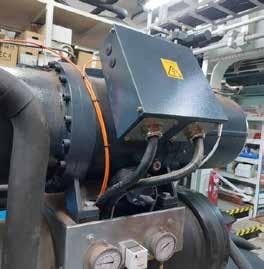
About Psyctotherm
Psyctotherm is an HVAC / Refrigeration manufacturer, established in 1969 and located in Piraeus, Greece in a total 2.000 m² surface area of facilities . We have an in house R&D dept. involving 6 people, which works on optimizing & developing our products and takes part in European Research programs of 10 mio, from which we have been awarded 3 seals of excellence award.



ISO 14001 ISO 45000 70-72 Chrisostomou Smirnis Str. 185 40 Piraeus, Greece Tel: +30210 4111 186, 411 7629 Fax: +30210 417 1075 sales@psyctotherm.gr – www.psyctotherm.gr ISO 9001
Accelleron Greece honored to host the Swiss Ambassador in its premises

The visit marked a significant step in fostering bilateral relations between Switzerland and Greece, highlighting mutual interests in technology, innovation, and collaboration.
During the visit, Swiss Ambassador had the opportunity to tour Accelleron Greece’s state-of-the-art facilities and service station, engaging in discussions with key stakeholders.
Accelleron Greece has hosted the Swiss Ambassador in its premises beginning of February. The visit served as a testament to the strong bilateral relations between Switzerland and Greece.
Accompanied by Mrs. Joanna Thanasis, Trade Attaché, and Mr. Teodoro Lüscher, Academic intern, the Ambassador Mr. Stefan Estermann engaged in discussions aimed at exploring avenues of cooperation and identifying areas of mutual interest for future collaboration. Accelleron Greece holds a pivotal role in the local shipping industry, aligning closely with Switzerland’s values of innovation, sustainability, and excellence.
The agenda of the visit included meetings with Top Management where Ambassador Mr. Stefan Estermann discussed topics of common interest. During the visit, Ambassador Mr. Stefan Estermann had the opportunity to tour Accelleron’s stateof-the-art facilities, providing the Ambassador with a firsthand understanding of the organization’s operations and impact.
In a statement following the visit, Ambassador Mr. Stefan Estermann noted: “Greece and Switzerland are both key players
in the global shipping industry. Accelleron, a Swiss company, showcases Switzerland’s significant maritime sector with its production of a powerful engine component. As the industry faces decarbonization challenges, success in addressing these issues is paramount for global trade development. The partnership between Swiss and Greek businesses, represented by Accelleron, highlights the importance of collaboration and innovation in navigating these challenges effectively.”
John Smyrneos, Managing Director of Accelleron Greece & Cyprus mentioned: “It was a great honor to us to welcome the Swiss Ambassador to our premises, where we showcased our company’s products and services, emphasizing their role in helping customers achieve decarbonization targets. We look forward to our further collaboration with the Swiss Embassy in the future and we thank the Ambassador for his visit.”
Dirk Balthasar, Head of Global Sales Service, Switzerland stated “ As a Swiss company with global reach, the Greek economy holds significant importance to us due to its global importance in the maritime business and long-standing customer relationships. Our service station in Skaramagkas allows to serve our customers on a global scale. We are grateful for the strong relationship between the Swiss Embassy and our team as this greatly supporting us in pushing forward the development of the global maritime industry together with our customers.”
As Accelleron continues to position itself as a hub of technological excellence on the global stage, partnerships of Switzerland and Greece serve as catalysts for progress, fostering cross-border collaboration and driving innovation.

104 Market news NAFS | MARCH 2024

Successful Conclusion of Navigator Assembly 2024: Forging the Future of Greek Shipping
The 23rd Navigator 2024 – The Shipping Decision Makers Forum successfully concluded on March 13, 2023, at Grand Hyatt in Athens, Greece. Navigator Assembly, happening for the fourth consecutive year, stood out as the singular platform where over 20 leading shipping organizations converged, spearheading discussions on specialized solutions crucial for the industry’s evolution. Among them, prominent academic clusters and universities lent their expertise, adding depth to the dialogue.
Amidst the backdrop of prevailing geopolitical complexities and global uncertainties, the Navigator Assembly emerged as a beacon of candid exchanges and visionary initiatives. Over 200 distinguished shipping professionals and international delegates representing 165 ship owning and service companies convened under the theme #ForgeTheFuture. Their collective determination to navigate through turbulent waters and fortify the industry’s resilience resonated throughout the forum.
The Assembly witnessed the participation of members from the whole shipping community engaging in roundtable discussions covering five thematic topics: Decarbonization, Human Element, Smart Shipping, ESG (Environmental, Social, and Governance), and Maritime Supply Chain These discussions were instrumental in identifying actionable steps to drive sustainable progress and shape the future trajectory of the Greek Maritime Cluster.
Danae Bezantakou, CEO of NAVIGATOR SHIPPING CONSULTANTS, welcomed the participants and stressed that, in the dynamic realm of shipping, amidst constant geopolitical challenges and global uncertainties, it becomes profoundly evident that addressing pressing issues and pioneering solutions are paramount. She also highlighted the belief in the power of synergy fuels collaborative efforts to overcome obstacles and contribute to the industry’s resilience involving stakeholders from politics and academia, and rest sectors of the shipping community.
The forum commenced with welcoming remarks by Captain Dimitris Bezantakos, President of NAVIGATOR SHIPPING CONSULTANTS, setting the stage for a day of insightful discussions. Captain Dimitris emphasized the pivotal role of synergies in the maritime domain, noting their significance in driving progress and innovation. He also acknowledged the esteemed presence of the President of the Hellenic Chamber of Shipping, whose contributions enriched the gathering, and stressed the significance of empowering and educating the younger generation in shaping the industry’s future.
In his welcoming remarks, George Pateras, President of the HELLENIC CHAMBER OF SHIPPING, underscored the urgent need for decarbonization and lamented the persistent postponement of environmental issues. He emphasized the importance of collective dialogue, as industry stakeholders, to address these challenges, recognizing that we are the drivers of change in the market.
Overall, the sentiment of fostering dialogue and supporting initiatives such as YES Forum was echoed, aimed at integrating young talent into the shipping industry.
Looking ahead, the outcomes of the Assembly will be presented at the 23rd NAVIGATOR 2024 – THE SHIPPING DECISION MAKERS FORUM, scheduled to take place in Chios & Oinousses from September 20 to 22, 2024 The forum will bring together industry leaders and stakeholders to exchange viewpoints, share knowledge, and shape the future of maritime.

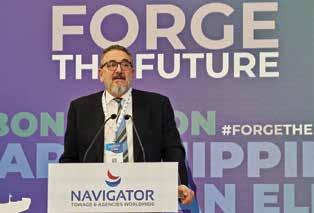
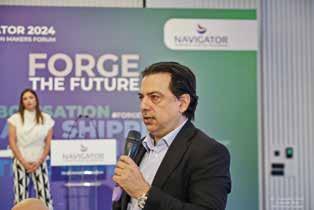

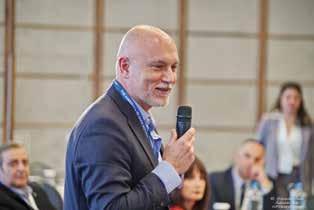
106 Market news NAFS | MARCH 2024
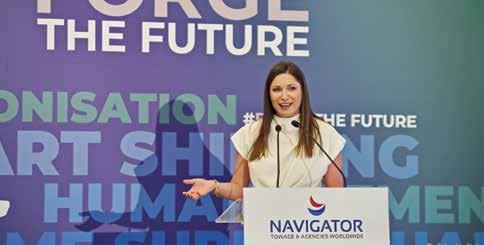

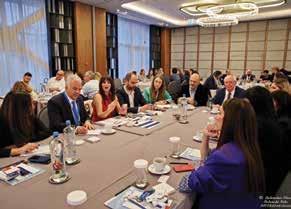
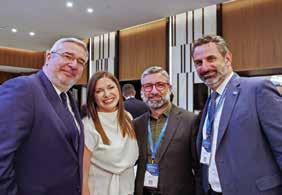

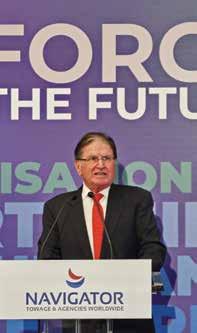



Following the conclusion of the roundtable discussions, Danae Bezantakou, in her closing remarks, underscored the paramount importance of education in addressing the challenges facing the shipping industry. She emphasized the need for universities to play a pivotal role in preparing students for these challenges and ensuring alignment with the concerns and obstacles articulated by ship owning companies.
To further delve into this topic, esteemed professors from various universities were invited to share their insights:
• Vicky Apostolopoulou, Business Development Executive, School of Maritime Studies Metropolitan College
• Seraphim Kapros, Professor - UNIVERSITY OF THE AEGEAN
• Dimitrios Koubogiannis, Associate Professor
- DEPARTMENT OF NAVAL ARCHITECTURE/ SCHOOL OF ENGINEERING/UNIVERSITY OF WEST ATTICA
• Manolis Kavussanos, Director MSc in International Shipping, Finance and Management
– AUEB
• Dimitrios Lyridis, Assoc. Professor - NATIONAL TECHNICAL UNIVERSITY OF ATHENS
• Angelos Pantouvakis, Dean and Professor & UNIVERSITY OF PIRAEUS
The success of the Navigator Assembly 2024 underscores the commitment of NAVIGATOR SHIPPING CONSULTANTS and its partners to drive innovation, foster collaboration, and promote sustainability in the maritime industry.
Sponsors:
ABB, ABC MARITIME, AUSTRIACARD HOLDINGS, BENEFIT, COOL DYNAMIC, CROSSWORLD, CYGNUS, DNV, EDIT AUTOMATION, EY, EMBASSY OF PANAMA, FORTUNE TECHNOLOGIES, FRANMAN, GOLDEN CARGO, HILL DICKINSON, IMEQ, INMARTEK, KATRADIS, MARICHEM MARIGASES, MARINETRAFFIC (KPLER), METROPOLITAN COLLEGE, MOORE, NAPA, OCEANKING, ORIANI, PALAU INTERNATIONAL SHIP REGISTRY, POLFORCE, RIDGE GLOBAL EUROPE, SHIPGLIDE AIR LUBRICATION SYSTEMS, SEABRIGHT, SEKAVIN, THE AMERICAN P&I CLUB, THE MARSHALL ISLANDS REGISTRY, Port of Thessaloniki (ThPA S.A.), TOTOTHEO MARITIME, UK P&I, VSHIPS.
Market news 107
Χρήστος Στυλιανίδης: «Η ελληνική ναυτιλία
πρωταγωνίστρια στην ανταγωνιστικότητα
της
ευρωπαϊκής οικονομίας»
Οι δηλώσεις, σε πρόσφατη συνάντηση του Υπουργού Ναυτιλίας και Νησιωτικής Πολιτικής Χρήστου Στυλιανίδη με τους δημοσιογράφους, για τις πρωτοβουλίες και τις δραστηριότητες του Υπουργείου σε ευρωπαϊκό και διεθνές επίπεδο.
«Η ελληνική ναυτιλία είναι πρωταγωνίστρια στον κόσμο και η πρώτη ναυτιλιακή δύναμη στην Ευρώπη. Γι’ αυτό και θα ήταν μεγάλο λάθος, εάν αυτό το γεγονός, δεν το εκμεταλλευόμασταν στο έπακρο, ακριβώς για να μπορέσουμε να προωθήσουμε τα συμφέροντα της ελληνικής ναυτιλίας και γενικότερα τα συμφέροντα της Ελλάδας. Θέλουμε δηλαδή η Ελλάδα, ως πρωταγωνίστρια στη ναυτιλία, να παίξει καθοριστικό ρόλο στη διαμόρφωση των πολιτικών που έρχονται. Και είναι ένα δύσκολο σταυροδρόμι, το οποίο θα έχει πολλά διλήμματα, ειδικά σε ό,τι αφορά τα θέματα της «πράσινης» μετάβασης στη ναυτιλία. Ποιοι θα παραμείνουν πρωταγωνιστές και ποιοι θα μπουν στο περιθώριο. Είναι μια ιστορική στιγμή ειδικά στη ναυτιλία και πρέπει εμείς να δείξουμε πολύ μεγάλες προσαρμοστικές ικανότητες και να κρατήσουμε την πρωτοπορία μας. Δεν έχω αμφιβολία για την αξία της ποντοπόρου ελληνικής ναυτιλίας. Πάντα είχε την εξαιρετική δυνατότητα να προσαρμόζεται και γι’ αυτό διατηρεί αυτό το ρόλο. Στα θέματα όμως της ακτοπλοΐας, θα πρέπει να υπάρχει μια πολύ μεγάλη βοήθεια από την πλευρά του κράτους.
Με βάση αυτό το σκεπτικό, επισκεπτόμενος κάποιες από τις ευρωπαϊκές πρωτεύουσες, ανέλαβα να παρουσιάσω στους ομολόγους μου και σε άλλους που έχουν σημαντικό ρόλο στα ευρωπαϊκά δρώμενα της ναυτιλίας, κάποιες πρωτοβουλίες και παρασκηνιακές διαβουλεύσεις στη βάση τριών αξόνων. Ο πρώτος άξονας είναι η Ελλάδα, η μεγάλη ναυτιλιακή δύναμη, ως η γέφυρα μεταξύ της Ευρωπαϊκής Ένωσης και του IMO. Αντιλαμβάνεστε ότι ο IMO είναι ο Διεθνής Οργανισμός που δημιουργεί τα πλαίσια συμπεριφοράς στα μεγάλα στοιχήματα της ναυτιλίας και πιστεύω ακράδαντα - και το έχω ζήσει και από κοντά αυτό το πεντάμηνοότι η Ελλάδα μπορεί να είναι η καλύτερη γέφυρα μεταξύ IMO και Ευρωπαϊκής Ένωσης – Ευρωπαϊκής Επιτροπής.
Μας βοηθά πολύ το γεγονός ότι, παρά τις μεγάλες γεωπολιτικές δυσκολίες, καταφέραμε και πάλι να είμαστε πρώτοι στην ψηφοφορία που έγινε. Αυτό μας δίνει διαπραγματευτικά πλεονεκτήματα και πρέπει να τα αξιοποιήσουμε.
Και αυτό με εισαγάγει στον δεύτερο άξονα των πρωτοβουλιών, τις οποίες έχουμε ήδη δρομολογήσει. Είναι ένας άξονας που επιδιώκει να προωθήσει μέσα στο ευρωπαϊκό οικοδόμημα και το ευρωπαϊκό πλαίσιο, την έννοια της «γαλάζιας» οικονομίας, της βιώσιμης «πράσινης» ναυτιλίας, εντός της λογικής της ανταγωνιστικής Ευρώπης.
Υπάρχουν προβλήματα ανταγωνιστικότητας των ευρωπαϊκών οικονομιών και παράλληλα έχει αλλάξει το παιχνίδι της ανταγωνιστικότητας σε πολλά επίπεδα. Σε όλα αυτά θα πρέπει να προστεθούν η πανδημία, η γεωπολιτική, το ουκρανικό, το τι συμβαίνει στην Ερυθρά Θάλασσα, το τι συμβαίνει στη Γάζα. Θα πρέπει κατά συνέπεια να τα λάβουμε υπόψη μας ως
γεωπολιτικές παραμέτρους και να κρατήσουμε, πάση θυσία, την ανταγωνιστικότητα της ευρωπαϊκής οικονομίας πολύ ψηλά.
Η ανταγωνιστικότητα της ευρωπαϊκής οικονομίας βασίζεται σε μια
δυνατή ευρωπαϊκή ναυτιλία. Και μια δυνατή ευρωπαϊκή ναυτιλία, βασίζεται σε μια δυνατή ελληνική ναυτιλία. Τα πράγματα έχουν αυτή τη σειρά, αυτή την ιεράρχηση. Με αυτά τα δεδομένα, λοιπόν, ξεκινήσαμε μια συζήτηση με τους ομολόγους μου για το πώς ακριβώς θα διατηρηθεί ανταγωνιστική η ευρωπαϊκή ναυτιλία, σε βαθμό που να συνεισφέρει στη γενική ανταγωνιστική θέση της Ευρώπης. Είναι ένα ευρύ θέμα που έχει ως τίτλο «Η γαλάζια οικονομία στην Ευρώπη». Αυτός είναι ο δεύτερος άξονας. Ο τρίτος άξονας των πρωτοβουλιών που είχαμε αυτή την περίοδο ήταν, το πώς θα αξιοποιήσουμε, όσο το δυνατόν περισσότερο, την ευρωπαϊκή χρηματοδότηση για να ενισχύσουμε και να βοηθήσουμε την «πράσινη» μετάβαση, ειδικά στην ακτοπλοΐα. Έχουμε ήδη ξεκινήσει πολλές προσπάθειες. Είμαστε σε διαπραγμάτευση με Επιτρόπους και με διάφορες DG στην Επιτροπή. Γι’ αυτό και στο τελευταίο μου ταξίδι στις Βρυξέλλες, είχα πολλές συναντήσεις με Επιτρόπους, ακριβώς για το πώς θα αξιοποιήσουμε την ευρωπαϊκή χρηματοδότηση ώστε να βοηθηθεί η ακτοπλοΐα μας, που έχει δυσκολίες. Να κάνει την «πράσινη» μετάβαση με σωστό τρόπο, προκειμένου να βοηθήσει στην αναβάθμιση της ακτοπλοΐας μας.
Γιατί πάντα υπάρχει περιθώριο βελτίωσης και την ίδια στιγμή να γίνει όσο το δυνατόν πιο ασφαλής, μέσα στη λογική της «πράσινης» μετάβασης, που είναι και ευρωπαϊκός στόχος.
Έχουμε πει βέβαια, κατ’ επανάληψη, χρησιμοποιώντας ως μότο αυτό που είπε ο Πρωθυπουργός στο Sharm el-Sheikh Climate Change Conference (COP 27) ότι, σε αυτή τη διαδικασία πρέπει να είμαστε radical, να είμαστε ριζοσπάστες αλλά την ίδια στιγμή πρέπει να είμαστε και ρεαλιστές. Και αυτό νομίζω ήδη άρχισε και περνάει σε όλα τα ευρωπαϊκά φόρα και στις ευρωπαϊκές πρωτεύουσες. Ήταν πάγια ελληνική θέση από την αρχή και αυτό συζητούσαμε συνεχώς, αυτή δηλαδή τη διασύνδεση των standards του IMO με τα standards της Ευρωπαϊκής Επιτροπής.
Αυτοί είναι οι τρεις άξονες πάνω στoυς οποίους βασίστηκαν οι πρωτοβουλίες και θα συνεχιστούν, βέβαια, γιατί ακόμα είμαστε στην αρχή.
Έχω ήδη επισκεφτεί το Παρίσι, όπου είχα συνάντηση με τον αρμόδιο Υφυπουργό και συζητήσαμε όλα τα θέματα. Στις Βρυξέλλες, ένα ταξίδι που πραγματοποιήθηκε τις προηγούμενες ημέρες, περιλάμβανε και τη συμμετοχή στο γνωστό Συνέδριο της Βελγικής Προεδρίας για την ευημερία των ναυτικών, το «Brussels Conference on the Wellbeing of Seafarers».
Επισκέφθηκα

Market news NAFS | MARCH 2024
108
την έννοια της «γαλάζιας» οικονομίας στην Ευρώπη. Το πώς αξιοποιούνται τα ευρωπαϊκά χρήματα και το πώς η Ευρώπη θα περάσει τις θέσεις της στον ΙΜΟ και δεν θα φτάσει στο σημείο να αυτοτραυματίσει την ανταγωνιστικότητά της».
και το Βερολίνο, όπου είδα επίσης τον αρμόδιο Υπουργό και συζητήσαμε όλα αυτά τα θέματα. Το πώς βλέπουμε
YES TO SHIPPING FORUM 2024
ΗΜΕΡΑ ΤΩΝ ΝΕΩΝ
ΣΤΑ ΠΟΣΕΙΔΩΝΙΑ

ΠΑΡΑΣΚΕΥΗ
7 ΙΟΥΝΙΟΥ 2024
10.00-17.00
@POSIDONIA CONFERENCE HALL
METROPOLITAN EXPO
AGENDA
YES TOUR: ΠΕΡΙΗΓΗΣΗ ΣΤΗΝ ΕΚΘΕΣΗ 10:00-12:30
YES TO SHIPPING FORUM 2024 12:30-15:00
ROUND CHAIR DISCUSSIONS 15.00-17:00






Υ Π Ο Σ Τ Η Ρ Ι Κ Τ Ε Σ 2 0 2 3 - 2 0 2 4 Πλοιοκτήτριες / Διαχειρίστριες Εταιρείες Εταιρείες Παροχής Υπηρεσιών / Εκπαιδευτικά Ιδρύματα











































Concept Founder: Δανάη Μπεζαντάκου









LOGISTICS PROVIDER P C O
t: +30 210 6234000 info@yes-forum.com www.yes-forum.com
Εκδήλωση Υφυπουργείου Ναυτιλίας Κύπρου στην
Αθήνα για τα 60 χρόνια Κυπριακού Νηολογίου
Το Υφυπουργείο Ναυτιλίας διοργάνωσε εκδήλωση στην Αθήνα την Τρίτη 5 Μαρτίου για τα 60 χρόνια από την ίδρυση του Κυπριακού Νηολογίου πλοίων. Στο δείπνο παρευρέθηκε σύσσωμη η πλοιοκτητική κοινότητα της Ελλάδας αναγνωρίζοντας έμπρακτα τη διαχρονική και σταθερή στήριξη στο Κυπριακό Νηολόγιο. Στην ομιλία της η Υφυπουργός Ναυτιλίας, κ. Μαρίνα Χατζημανώλη έκανε μια ιστορική αναδρομή στην εξέλιξη του νηολογίου και αναφέρθηκε στα πλεονεκτήματα της Κυπριακής Ναυτιλίας ως κράτος σημαίας, στο όραμα καθώς και στους στόχους και τις προτεραιότητες που έχουν τεθεί από το Υφυπουργείο Ναυτιλίας. Σημείωσε τη σταθερή προσήλωση της Κυβέρνησης και του ίδιου του ΠτΔ στην περαιτέρω ανάπτυξη και ενίσχυση του κλάδου και τη θωράκιση της ανταγωνιστικότητας της ευρωπαϊκής ναυτιλίας.
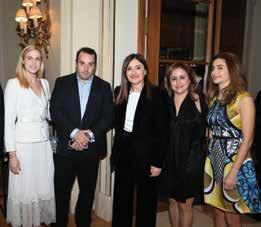
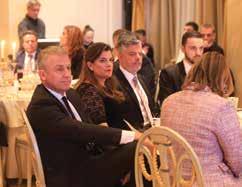

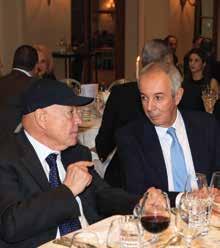
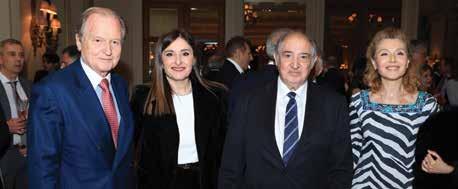
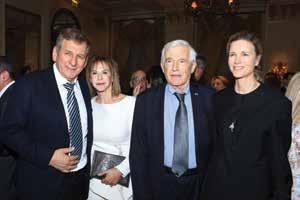


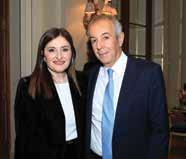



110 Market news NAFS | MARCH 2024
2024 State of the Cruise Industry Report Shows Cruise Tourism Has Surpassed Historical Levels
New Ocean of Opportunities publication highlights the global cruise workforce and the growth of careers in cruising

Cruise Lines International Association (CLIA), the leading voice of the global cruise community, has released its annual State of the Cruise Industry report and a new publication, An Ocean of Opportunities workforce skills report. The annual state of the industry report includes the release of 2023 passenger volume, which reached 31.7 million— surpassing 2019 by 7%. The report also shows continued demand for cruise holidays, noting intent to cruise at 82%. The forecast for cruise capacity shows an increase of 10% from 2024 through 2028, as cruise lines make ongoing, concrete progress in pursuit of net-zero emissions by 2050. “Cruise continues to be one of the fastest-growing and most resilient sectors of tourism— rebounding faster than international tourist arrivals—and a strong contributor to local and national economies. In 2022, cruise tourism cruise generated 90% of economic impact compared to 2019, despite passenger volumes that year at 70% of 2019 levels. Over the past 50 years, cruise tourism has demonstrated its leadership in managed tourism and is an industry that has plenty of room for continued responsible growth given cruise travel comprises just 2% of overall travel and tourism,” said Kelly Craighead, president and CEO of CLIA. “The industry also continues to lead the way in environmental sustainability and destination stewardship, with cruise lines making advancements in technology, infrastructure and operations, and in green skills training for crew.”
Highlights from CLIA’s 2024 State of the Industry report include:
Cruise is Thriving:
• Cruise tourism reached 107% of 2019 levels in 2023, with 31.7 million passengers sailing – almost two million more than 2019.
• 2024 is forecast to see 35.7 cruise passengers sailing.
• Intent to cruise is 6% higher than 2019, with Millennials being the most enthusiastic cruise travelers of the future.
• Global cruise capacity is forecast to grow from 677K lower berths in 2024 to 745K lower berths in 2028.
• Each year, the fleet becomes more efficient, as cruise lines invest in propulsion technologies with conversion capabilities for future alternative fuels and utilize a range of technologies and innovations to advance their sustainability initiatives.
2022 Global Economic Impact. In 2022, cruise generated:
• $138 billion to the global economy
• 1.2 million jobs – up 4% compared to 2019
• $43 billion in wages
• 63% of those who have taken a cruise say that they have returned to a destination that they first visited via cruise ship for a longer stay, extending the economic impact.
For 2023, the economic impact is forecast to be even greater given the 50% increase in the number of passengers sailing in 2023 compared to 2022.
Trends in Cruise:
• The number of new-to-cruise is increasing – 27% of cruisers over the past two years are new-to-cruise, an increase of 12% over the past year.
• Cruises are a top choice for multi-generational travel – with more than 30% of families traveling by cruise with at least two generations and 28% of cruise travelers traveling with three to five generations.
• Expedition and exploration are the fastest-growing sectors of cruise tourism, with a 71% increase in passengers traveling on expedition itineraries from 2019 to 2023. • Accessible tour excursions are on the rise—with 45% of cruise passengers booking an accessible tour for their most recent cruise.
• 73% of cruise travelers say that travel advisors have a meaningful influence on their decision to cruise.
“Cruise is the best vacation value there is, with incredible guest experiences delivered by a talented and dedicated multinational workforce of nearly 300,000 seafarers. To highlight the tremendous employment opportunities that cruise tourism supports around the world, CLIA has published a new skills and workforce publication, Oceans of Opportunity. With at least 56 new ships coming online between 2024 and 2028, there are vast opportunities for careers in cruise, which boasts an impressive employee retention rate upwards of 80%,” said Craighead.
Highlights from CLIA’s An Ocean of Opportunities workforce report include:
• In 2024, cruise lines will employ a multinational workforce of nearly 300,000 seafarers representing more than 150 countries, as well as tens of thousands of employees on land.
• 94% of women seafarers work in the cruise industry.
• Around 40% of senior leadership roles at cruise companies are held by women.
• Among current and future workforce needs are green skills.

Market news 111
Eni, Fincantieri and RINA establish partnership for maritime transport decarbonization

Eni, a global energy company, Fincantieri, one of the world’s largest shipbuilding groups, the only one active in all high-tech marine industry sectors, and RINA, a multinational inspection, certification, and engineering consultancy, have signed an agreement to develop joint initiatives for the energy transition. The partnership formalises the commitment to develop joint projects, in line with the partners’ strategies, to decarbonise the maritime sector in the medium to long term with the goal of Net Zero by 2050. Additionally, the establishment of a permanent global observatory regarding future technological, regulatory, and market developments will be evaluated.
The three companies will conduct a comprehensive analysis and evaluation of the most sustainable alternatives to support the maritime decarbonisation pathway. This will also be based on the development of complementary solutions to fuels already available for other hard-to-abate sectors. The partnership’s areas of interest also include an analysis of the reference energy infrastructure and the development of new logistic structures, including the investments that the sector requires.
Giuseppe Ricci, Chief Operating Officer for Energy Evolution at Eni, commented: “The collaboration with Fincantieri and RINA, two major Italian players, is a further step in our journey towards the transition and decarbonisation of maritime transport. To meet the objectives of the UN 2030 Agenda, it is important not only to manage what is immediate but also to act with a medium to long-term perspective, developing partnerships to create more sustainable solutions and products. The ability to network among the partners, with their wealth of skills and technological capabilities, can make a significant contribution to finding more effective solutions for decarbonising maritime transport and meeting

the needs of shipowners and logistics operators, always leveraging a holistic approach”.
Pierroberto Folgiero, CEO and Managing Director of Fincantieri, said: “We are highly committed to supporting our clients in addressing the industrial challenges of the maritime energy transition, and this initiative is aimed at initially creating a hub of study to harness Italy’s extraordinary expertise in new technologies, novel fuels, and their profound industrial implications for the ship system.
We are very pleased to join forces with Eni and RINA in an alliance to materialize existing solutions and to pave the way for the future with a proactive ecosystem approach. Indeed, new technologies must be industrialized on board ships, just as new fuels must be produced and distributed at the dock. Only with a concept of “operationalizing innovation” can we lead our industry and project our shipbuilding leadership into the future”.
Carlo Luzzatto, CEO and General Manager of RINA, said: “We strongly believe in the value of collaboration and the opportunities it brings, particularly when it involves players of international calibre such as Eni and Fincantieri. Together, we have the opportunity to share knowledge and experience and to contribute to more sustainable solutions that support the shipping supply chain. RINA brings to the partnership its engineering and technological skills, developed across various sectors, to support shipping in its journey towards reducing its carbon footprint, without excluding any energy options”.
The understanding may be the subject of subsequent binding agreements that the parties will define in compliance with the applicable legislation, including that relating to transactions between related parties.
112 Market news NAFS | MARCH 2024

MARITIME INFLUENCERS
INSIGHTS OF THE WORLD'S LEADING MARITIME INFLUENCERS
DIVE INTO THE WORLD OF MARITIME EXCELLENCE WITH MARITIME INFLUENCERS!
EXPLORE, ENGAGE, AND
ELEVATE YOUR EXPERTISE WITH MARITIME INFLUENCERS—WHERE EVERY CLICK UNVEILS A NEW WAVE OF WISDOM. FAIR WINDS AND FOLLOWING SEAS AWAIT!
MARITIMEINFLUENCERS.COM
WISTA Hellas 29th Annual General Assembly and Election of Board of Directors and Auditing Committee

Following its 29th Annual General Assembly and elections for the new Board of Directors and Auditing Committee of WISTA Hellas, held on Wednesday 28th February 2024, WISTA Hellas is pleased to announce the new Board of Directors and Auditing Committee, for the term 2024-2026:
President Ms. Vivi Kolliopoulou, Insurance Manager, Angelicoussis Group, Vice-President Ms. Akrivi Brikou, CFO, Efshipping Company S.A., General Secretary, Ms. Anna Giatra Shipbroker, Renaissance Shipbroking S.A., Treasurer Ms. Samantha Lourandou, Purchasing Manager – Member of the ESG Committee, Atlantic Bulk Carriers Management Ltd.
Member Ms. Maria Kyratsoudi Business Development Manager,
American Bureau of Shipping (ABS)
Ms. Efi Tsolaki, Ms. Katerina Mahera and Ms. Mara Manoudaki have been elected Substitute Members of the BoD, while Ms. Elina Souli, Ms. Elina Kassotaki and Ms. Ioanna Topaloglou shall serve as members of the Auditing Committee.
The newly appointed President of WISTA Hellas, Ms. Vivi Kolliopoulou, has been an active member of the Association since 2001. She served as a member of the BoD for the first year of the 2004-2006 term before relocating to London due to work commitments. Her tenure continued with WISTA International from 2005 to 2009, when she took the roles of the member and later the Secretary-General of the Executive Committee (ExCo). Vivi has attended numerous conferences, events, and General Assemblies organized by both WISTA Hellas and WISTA International and she has also actively supported WISTA initiatives throughout her career. She has worked in the field of marine insurance and claims for companies such as Richards Hogg Lindley and The Standard P&I Club, both in Piraeus and London, as well as in New York. In 2009, she joined Thenamaris (Ships Management) Inc. as the head of the Insurance and Claims department. From 2019 to date, she is the Insurance Manager of the Angelicoussis Group. Part of her role is also to attract and develop new talent, always aiming to encourage diversity and inclusion.
The Annual General Assembly was marked by an impressive turnout, with 105 members attending and 33 members represented by proxies. The members received a detailed update on the accomplishments of the Association and endorsed the balance sheet for 2023 and the budget for 2024.
Celestyal and the Cyprus Maritime Academy announced the signing of a Memorandum of Understanding
Celestyal and the Cyprus Maritime Academy have announced the signing of a Memorandum of Understanding, concerning their collaboration in the field of maritime education. Under the agreement, Celestyal will offer full scholarships to aspiring cadets of the Cyprus Maritime Academy, thus confirming the company’s commitment to train young talent from Cyprus and the wider region on board its ships.
The partnership aims to empower young cadets through training on Celestyal’s new ships, the Celestyal Journey and the Celestyal Discovery, while thanks to the scholarships, the cadets will gain invaluable experience, as they are getting prepared for a successful career in the shipping industry.
Mr. Chris Theophilides, CEO, Celestyal, who is also a member of the Board of Governors of the Cyprus Maritime Academy, stated: “The collaboration with the Cyprus Maritime Academy reflects Celestyal’s firm commitment to maritime education. Through the scholarships, we provide training opportunities on our new ships and nurture Cyprus’ future talent, thus contributing to the development of the wider maritime industry.”
“We are excited to embark on this journey with Celestyal and we
sincerely thank the company for its support to our Academy and to the cadets who wish to pursue a career at sea”, said Mr. Nicolas Kythreotis, Executive Director of Intercollege and the Cyprus Maritime Academy. “This collaboration comes as a testament of our shared vision for the advancement of maritime education in Cyprus and the cultivation of skilled professionals in the maritime industry.”
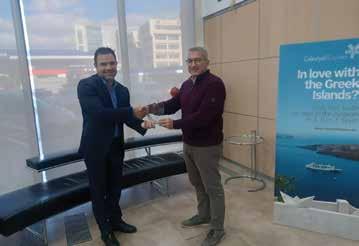

114 Market news
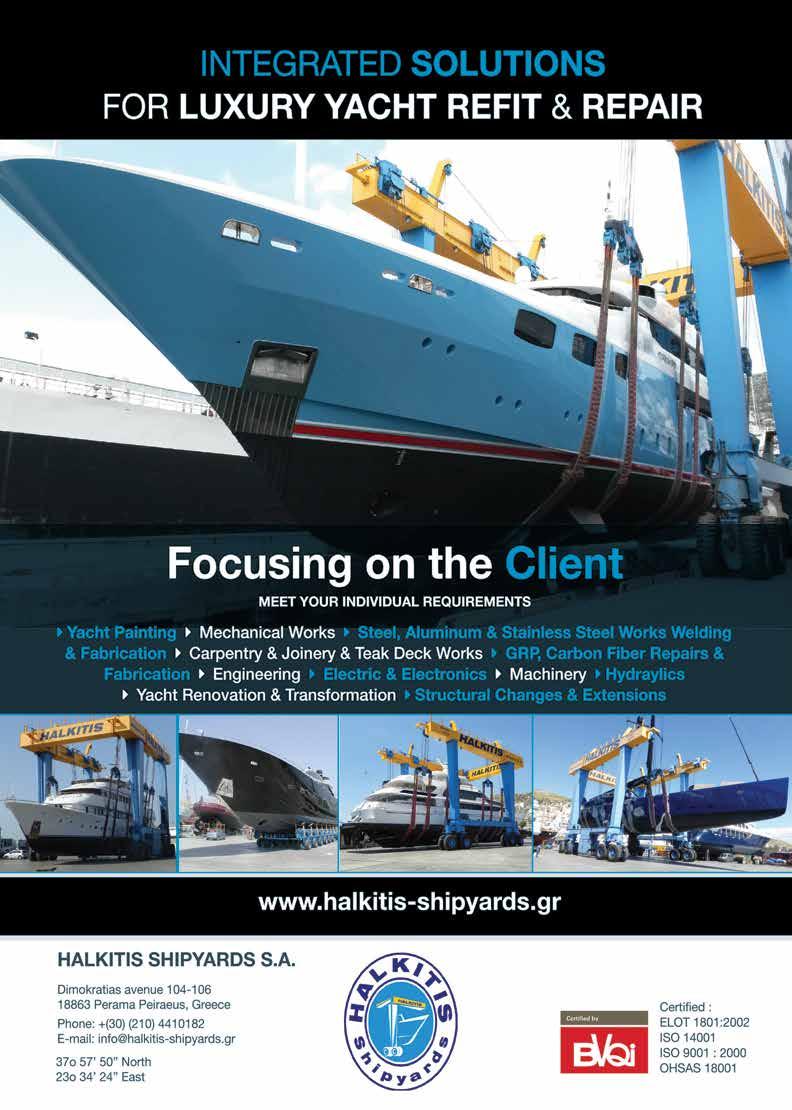
TUGGING the marine industry since 1978
MEGATUGS was established in 1978 and is widely recognised as one of the leading professional towage and salvage companies in the marine industry dedicated to provide safety and support at sea.
MEGATUGS scope of services includes harbour & ocean towage, salvage, wreck removal, oil spill response, commercial diving, offshore support and lifting services.
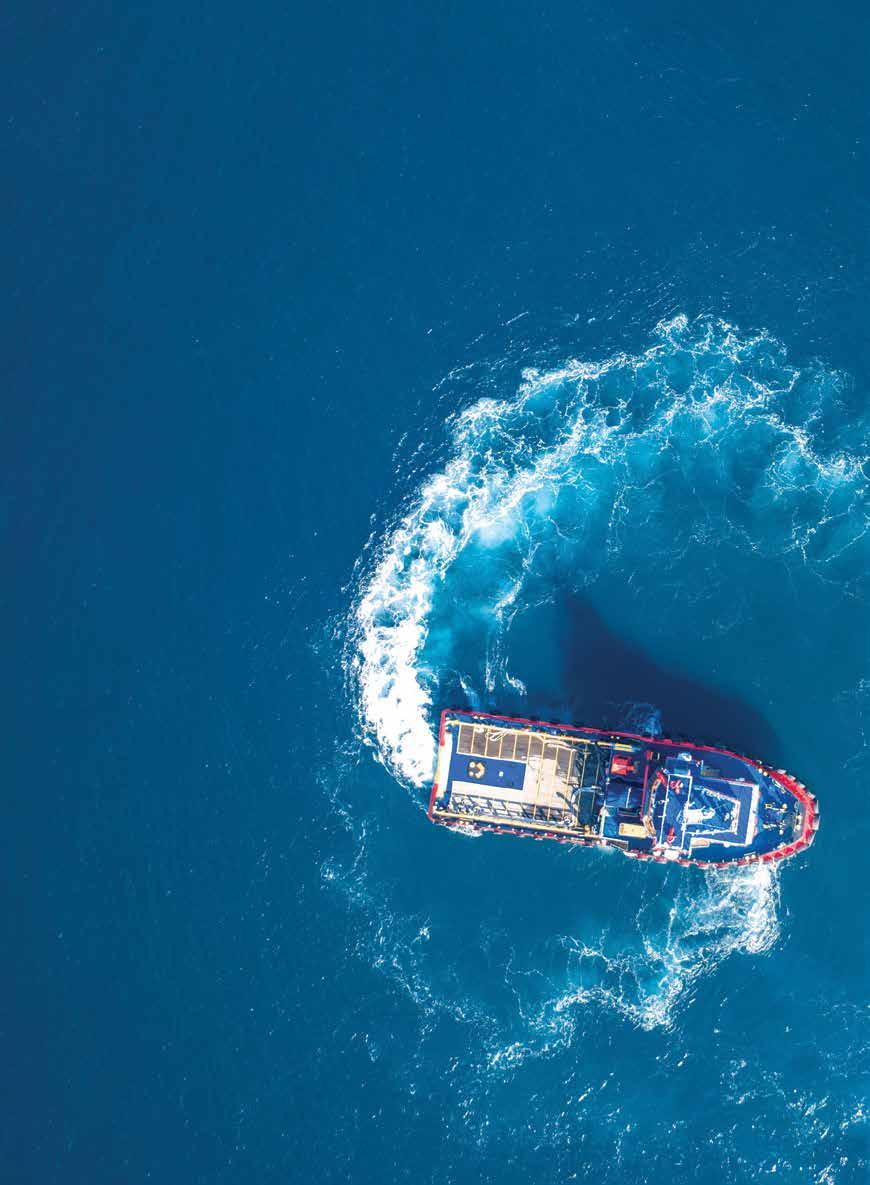
e-mail: info@megatugs.gr | megatugs.com
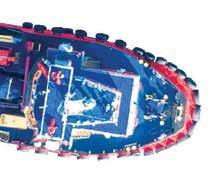
YOUR PARTNER AT SEA
concept mania x HEAD OFFICE 2, Iroon Polytechniou str., 18863 Neo Ikonio, Greece Tel. +30 210 45 22 131, Fax. +30 210 4180176 BRANCH OFFICE 42, 26th Octovriou str., 54627 Thessaloniki, Greece Tel. +30 2310 256380/1, Fax. +30 2310 256382




























































































 An International Owner and Operator of Dry Cargo and Tanker Vessels
An International Owner and Operator of Dry Cargo and Tanker Vessels


























































































































































































